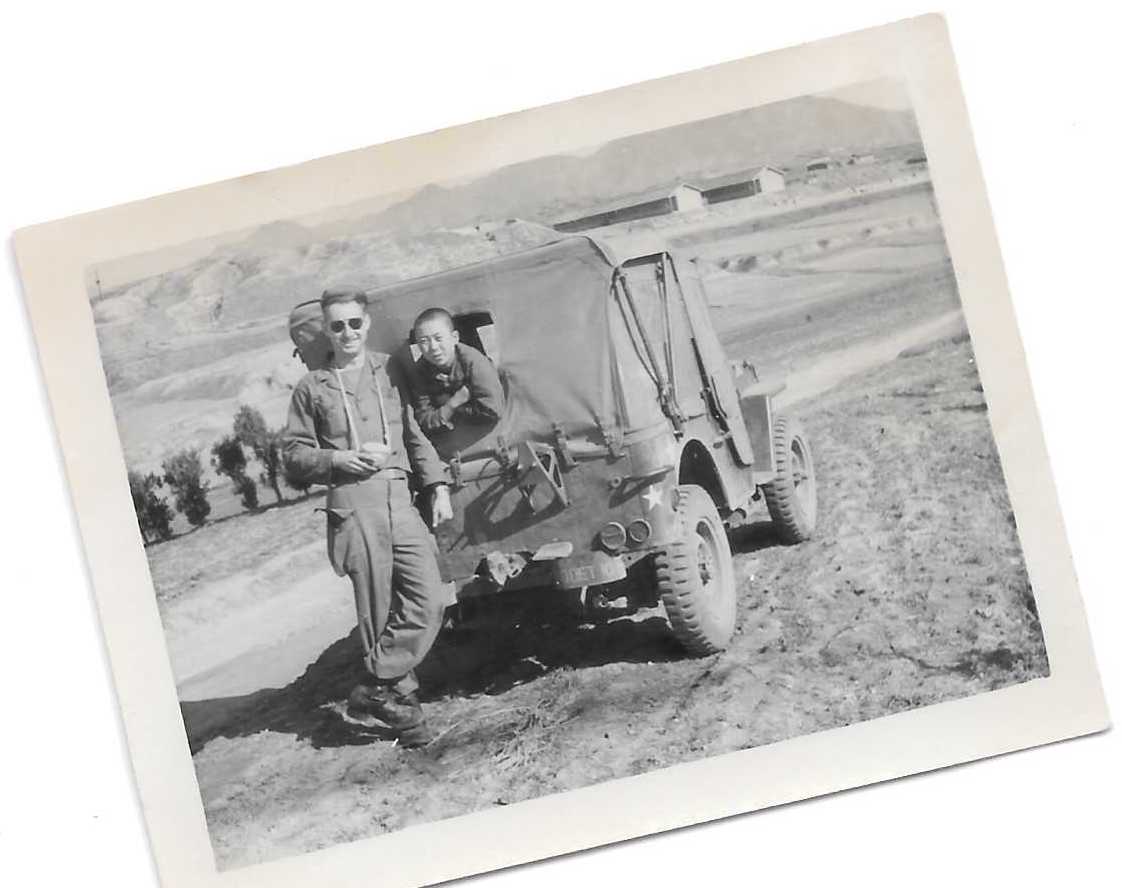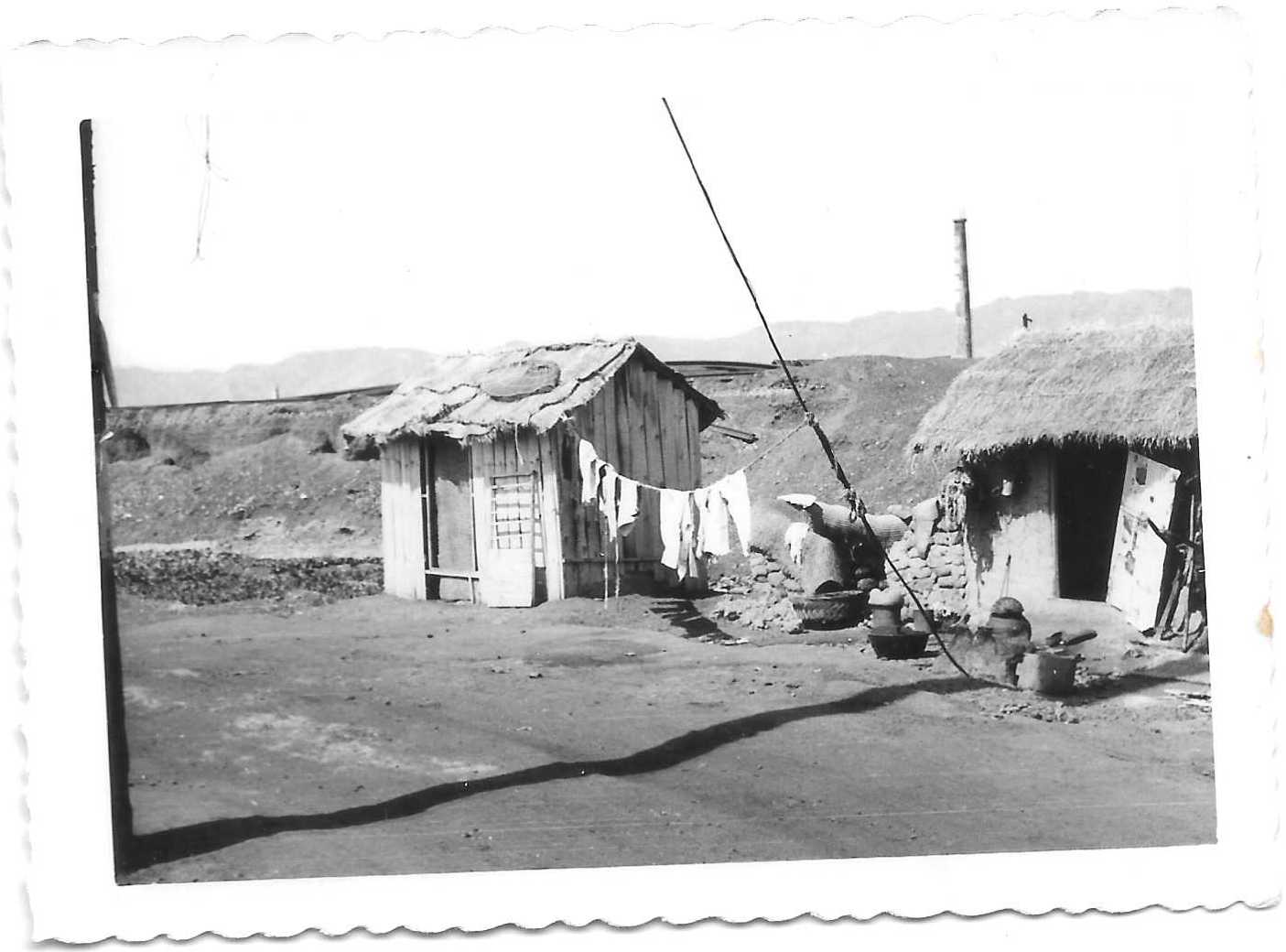Charles Falugo, Jr.
Bio
Charles Joseph Falugo, Jr., was born in Bristol, Rhode Island, on January 10th, 1928. In 1944, he graduated from Cheshire Academy in Connecticut and recalled never being taught about Korea in school. He only remembered learning about the beginnings of Korea War in the movie theaters before he was drafted. He was working at his father’s furniture business before being drafted on October 6th, 1950. He recalled giving all of his tools away when he found out he was headed to Korea, thinking he would not return alive. He attended boot camp at Fort Devins in Massachusetts before taking a train to Fort Lewis in Seattle, Washington. From there, he sailed on the USNS Marine Phoenix and landed in Pusan (Busan), South Korea, twenty-two days later. Serving in the 402 Battalion Headquarters Quartermaster, his rank was Sergeant First Class. He worked in the MOS 1014 where he was in charge of motor pool, directing the transfer of supplies throughout the country.
Video Clips
Living Conditions in South Korea
After a twenty-two day trip from Seattle, Washington, Charles Falugo recalls being relieved that they finally landed in Pusan, South Korea. He is astounded by the poor living conditions he witnessed. He reports all Korean houses were made of clay and insulated by cardboard, the people used oxen to help them transport water, and they picked roots for food. He also recalls South Korean children taking his unit's leftovers home to feed their families. He felt very lucky relative to the South Koreans he encountered and feels immense pride for the advancements South Korea has made today.
Share YouTube:
https://www.youtube.com/watch?v=sXtlIOwfEoA&start=310&end=498
Share from this page:
https://koreanwarlegacy.org/interviews/charles-falugo#clip-1
Embed:
Driving through Korea
Charles Falugo recounts driving through South Korea. He reports he was able to to get along with his men because he would never ask them to do anything he would not do. He recalls the roads being so bad that their truck chassis would constantly break and every time his division would stop to fix its trucks, they would encounter starving children begging for food. He shares moving into Seoul and only seeing the blue capitol building and the railroad station.
Share YouTube:
https://www.youtube.com/watch?v=sXtlIOwfEoA&start=1260&end=1459
Share from this page:
https://koreanwarlegacy.org/interviews/charles-falugo#clip-2
Embed:
Adopting a Family
Charles Falugo shares letters he received during the Korean War from Korean families he assisted. He refers to a Korean boy that he befriended and somewhat adopted after he observed him playing with a grenade. He recalls the boy's mother would wash the soldiers' clothes. He seeks to reconnect with the boy.
Share YouTube:
https://www.youtube.com/watch?v=sXtlIOwfEoA&start=1607&end=1692
Share from this page:
https://koreanwarlegacy.org/interviews/charles-falugo#clip-3
Embed:
Building Orphanages
Charles Falugo shares that some units would find bombed out schools and remodel them into orphanages for South Korean children. He scrounges for supplies for the units who rebuilt the buildings. He recalls he would always bring an officer so they would never be questioned about the requisition of supplies.
Share YouTube:
https://www.youtube.com/watch?v=sXtlIOwfEoA&start=2149&end=2273
Share from this page:
https://koreanwarlegacy.org/interviews/charles-falugo#clip-4
Embed:
Korean Resourcefulness
Charles Falugo loves the Korean people and their resourcefulness. He notes he was never fearful to go in public even at night and requested they stop bowing to him. He astounds how the civilians would be able to build necessary automobile parts and create shingles out of beer cans. He notes American trash would always be recycled into something useful in Korea.
Share YouTube:
https://www.youtube.com/watch?v=sXtlIOwfEoA&start=1855&end=1965
Share from this page:
https://koreanwarlegacy.org/interviews/charles-falugo#clip-5
Embed:
Video Transcript
00:00:00 [Beginning of Recorded Material]
I: This is November 3rd, 2021, beautiful city of Villages in Florida. My name is Jongwoo Han. I am the president of Korean War Legacy Foundation. And we are doing this interview to commemorate the 70th Anniversary of of the breakup of the Korean War in 1950, supported by the MPVA, Ministry of Patriots and Veterans Affairs in Korea, to do this to preserve your memory
[00:00:30]
for — most of all, we want to preserve your memory because it’s been a long time, more than 70 years ago.
C: Yeah.
I: And we want to honor your service as a Korean War Veteran. But at the same time, we want to educate the legacy of the Korean War and the honorable services and sacrifices of Korean War Veterans, so that teachers can use this interview in the classroom, when they talk about the Korean War. Right. It’s my great honor and pleasure to meet you. Actually, I
[00:01:00]
met you at the restaurant in the morning —
C: Yes.
I: — for a little breakfast, with your daughter Jane. I will ask her to join you later. So, please, it’s my honor and — and pleasure to meet you, sir. And thank you for coming. Please introduce yourself. What is your name and spell it for the audience?
C: My name is Charles Joseph Falugo, Jr.; Falugo, F-a-l-u-g-o.
I: Falugo. So what is the ethnic origin of this name?
C: Oh, my father came from Lebanon.
[00:01:30]
I: Lebanon?
C: In this country at 15 years old.
I: Hm-hmm.
C: My mother was Italian. She was born here.
I: Uh-huh.
C: And had two sisters, one older and one younger.
I: What is your birthday?
C: Jan — 1/10/28.
I: 1/10/28.
C: Yes, sir.
I: So you are now —
C: Sir, 93.
I: What?
C: Yes, sir.
I: Can you believe he’s 93?
[00:02:00]
You look like 63.
C: Thank you, sir.
I: Did I make a mistake?
C: No, sir.
I: I should have said that you are 43, really. [Laughter] You don’t have a wrinkle over your face.
C: My parents didn’t also.
I: Maybe that’s the DNA —
C: Yes.
I: — of the Lebanese.
C: Yes, the Lebanese, yes.
I: I see.
C: Yes.
I: So you got Mediterranean food and so on, right?
C: Absolutely.
[00:02:30]
Both Lebanese and Koreans, they like their garlic.
I: Oh, oh.
C: It keeps you going.
I: Yeah, we love garlic.
C: Yeah.
I: So where were you born?
C: I was born in Bristol, Rhode Island.
I: Bristol?
C: Rhode Island.
I: Uh-huh. And tell me about your family background, even though you mentioned that you are — your father from Lebanon. But how many siblings, and what did your father do, and your mom.
C: My father —
I: When you were growing up.
C: My father came from Lebanon, 15 years old.
[00:03:00]
And he worked in different factories. And he opened a furniture store in 1919.
I: What store?
C: A furniture.
I: Furniture?
C: Yeah.
I: Okay.
C: And my mother worked for them, worked for my father.
I: Hm-hmm.
C: And they got married. And they continued expanding their business. And I have a sister older.
I: Hm-hmm.
C: And — and I’m
[00:03:30]
the boy next. And I got a sister younger.
I: I see. So what school did you graduate, high school, where?
C: Cheshire, Cheshire Academy.
I: Can you spell it slowly?
C: Cheshire, C —
JANE: C-h-e-s — be h-i-r-e.
I: C-h-e-s-h-i-r-e, Cheshire?
C: Yes.
I: High school.
C: Yes.
I: When did you graduate?
C: ’44.
I: 1944.
C: ’44.
I: So
[00:04:00]
let me ask this question. When you were in high school in Rhode Island, right?
C: Well, yeah — no, in Connecticut.
I: Connecticut.
C: I didn’t behave very well, so they sent me to — off to school.
I: [Laughs]
You are too honest, Charles.
C: Please, sir?
I: You are too honest.
C: Well, I know it. That’s the way it is, sir.
I: Okay. So in the school Cheshire High School in Connecticut.
C: Yes.
[00:04:30]
I: Did they teach you anything about Korea?
C: No. No.
I: What? They didn’t teach anything about Korea?
C: No. No.
I: How about Lebanon?
C: Uh, yeah — no.
I: They didn’t teach you anything about —
C: No.
I: — your old mother country?
C: No, no.
I: That’s a bad school.
C: Well, what school in the States teach you about all these countries now. You’re lucky they teach you about American History.
I: See, that’s the point.
C: Right.
I: Why our schools do not teach about
[00:05:00]
Korean War. Why? You are the Korean War Veteran, right?
C: Yes, yes.
I: And you saw Korea in 1950. How was it when you landed there? What did you see in Korea? Just tell me straightforward.
C: Well —
I: Be honest.
C: [Unintelligible] I came over — when we left Seattle, Washington, we were on the ship, Marine Phoenix, 22 days.
I: Yeah, but —
C: And when
[00:05:30]
we landed in Pusan —
I: Yes.
C: — everything looked good, even though it wasn’t good. [Laughs] But it was very, very bad conditions.
I: Tell me the details. Give me the detail because children wants to hear from you how bad that was.
C: Well, you didn’t see any houses. They were, uh, all clay houses.
I: Hm-hmm.
C: And if we dropped some cardboard, they would take out the cardboard to insulate their houses. And they were — really had nothing. They had, uh,
[00:06:00]
oxen to go get water in old barrels. They were picking roots up off the ground to eat. And when we — when we got through with our meals, we never threw any of it away. What we — was left over in our food, children would come with a [number] tin can and take our food. And they wouldn’t eat it. They’d run home with it.
I: They’re not going to eat, but they brought it to home?
C: Home.
[00:06:30]
I: How did you know that?
C: I saw it.
I: You saw it.
C: I saw it.
I: Yeah?
C: Yeah.
I: Why did they bring it to home?
C: That’s the way they were trained. They took care of their family first.
I: They care about their family —
C: Family.
I: — first, rather than themselves?
C: Yes, sir.
I: Amazing, isn’t it?
C: Yes. Yes.
I: Wow.
C: And —
I: So when you saw those things, there’s no house, house made up of cardboard —
C: [Unintelligible]
I: And there are nothing to eat —
C: Clay, made out of clay.
I: What did you think?
[00:07:00]
What did you feel about it?
C: I felt very badly, and I felt very, very lucky, what we have in this country. Even– even as bad as the conditions were in the service, we were living like kings compared to these poor people.
I: This is amazing, that they didn’t eat, because they were hungry. They must be —
C: Absolutely.
I: — very hungry, but the didn’t eat. They brought to home.
C: To home, yes.
I: That’s amazing story.
C: Well, when we used to get through with our meals,
[00:07:30]
they called me the Candy Man. I used to write home — I got a package a day from my fam- — parents. And I would give everybody a piece of candy. They were all lined up. One night, I ran outside. I had those Life-Savers. I had to open up each Life-Saver and give them one.
I: One.
C: And — and not one of them would put it in their mouth and eat it. If you give them a Hershey bar, they went home.
I: Wow.
C: Yes.
I: I think that’s the spirit of Korean people, so that
[00:08:00]
they were able to rehabilitate their economy. And now they’ve become the 10th largest economy in the world.
C: [Wealth], yes.
I Can you believe that?
C: Yes. Yes.
I: What do you think about that?
C: I’m —
I: You saw nothing there. Now, it’s the 10th largest.
C: Yes. Very proud. Very, very proud of them. Because of something we — someone that we helped out turned it into something good.
I: So this is amazing. You didn’t
[00:08:30]
know anything about Korea when you were in high school.
C: Yes, sir.
I: And even after the high school.
C: Yes, sir.
I: And — but now, you know everything about Korea?
C: I enjoyed reading the books.
I: What are you — what are you reading about? What do you know?
C: Well, when they — when we wanted to visit Korea —
I: When?
C: About five years ago.
I: Five years ago. So it must have been ’16, 2016?
C: ’16.
I: Uh-huh.
C: And they gave us a bunch of — of books. It’s amazing, reading the books, what the Korean people invented.
[00:09:00]
I: But I don’t want to talk about something from the book. What did you see in Korea when you revisited in 2016? What did you see? How —
C: Oh.
I: How different was it? Tell me the detail?
C: It was — it was, like, getting up — getting up in the morning and being in a field of roses. It was just — it was impossible to see the buildings, the highways, how im- — how fast they improved their
[00:09:30]
government.
I: When you were in Korea in 1950, were you Seoul? You were — you saw Seoul, right?
C: Yes. I — we moved to Seoul in ’51.
I: So tell me the details of the Seoul you saw in 1951 and Seoul in 2016.
C: Well, uh, it was a dream. It was a — a dream. When you were there, you saw no- — the only thing we
[00:10:00]
remember seeing is the blue building, the railroad station stood out [probably], and a few — there where we lived, the embassy was all blown up. It was nothing. Then you went there, you saw a jewel, a diamond in the — in the sky. How unbelievable what they did in some — a short time, short time.
I: Hmm.
C: Look at this country, what, 20 years old — 200 years old, I mean, look how long it took us to get where we are.
[00:10:30]
I: It’s much bigger than Villages, right?
C: Yes, yes.
[Laughter]
Yes.
I: See, that is your legacy. That is the – something good came out of Korea from 1950.
C: Yes, yeah.
I: Wow. Yeah.
C: Just to see the poverty these poor people were in, and they still smiled.
I: Yes. So after you graduate from high school, what did you do? Did you get – did you work at your father’s —
C: I worked at my father’s furniture business.
I: Of course.
C: Yes.
[00:11:00]
I: Did he pay you well?
C: Very well. Yes, he did.
I: [Laughs]
C: No, I – like I said, I was spoiled.
I: So, you know, the ’28, you born in 1928 —
C: ’28
I: — one year before the Great Depression.
C: The Depression.
I: But because your father had a company there —
C: We didn’t – I never felt it.
I: You never felt it?
C: I never felt that we had —
I: You are lucky, man.
C: We always had a nice – a good house. We always had heat in the house.
[00:11:30]
Electric in the house.
I: Hm-hmm.
C: And the best food. And when we went to buy clothes, my parents would take me to Providence to get us clothes, instead of going in – in the little town to buy clothes. I was very, very fortunate.
I: Yeah.
C: Very, very fortunate.
I: You are because – and you were – because most of the veterans that I’ve had an interview with, they suffered a lot from the Great Depression.
C: Oh, yes, yes.
I: So, um,
[00:12:00]
when – did you – were you drafted or enlisted?
C: I was drafted.
I: When? Tell me about it.
C: Uh, I get drafted October the 6th —
I: Wow.
C: — I believe it was, uh, 1950.
I: You remember that?
C: Yes.
I: Drafted and – but at that – by that time, you already knew the Korean War broke out, right?
C: Absolutely.
I: How did you came to know about it?
C: The news.
I: News.
C: Most – at that time, most of the news we got was
[00:12:30]
when you went to the theaters. They had the NewsReel.
I: New – yeah, tell me about it.
C: Yeah.
I: Tell me, what did you see from the – the – the theater —
C: Well —
I: — about Korean War?
C: Just how – how badly they got attacked. About three days, I guess, North Korea took over Seoul, and the poor people had – didn’t have a chance. And people just wasn’t – disappeared everywhere. That’s
[00:13:00]
why you had so many children living in the mountains by themselves.
I: You saw that in the —
C: Yes.
I: — NewsReel?
C: Yes, sir.
I: Okay. So did you see Kilroy – Kilroy there?
C: Kilroy, yes, sir. Who didn’t see Killroy? Kilroy was here.
I: Yes, that’s right.
C: Yes, yes.
I: Oh, my goodness. You are very – so tell me about it, because the Kilroy was the image of American citizens —
C: Yes.
I: — who committed for the state, the country. So Kilroy was the American GI in World
[00:13:30]
War II.
C: World War II.
I: But, also, Kilroy was there in Korea.
C: Korea, yeah.
I: You are one of the Kilroy.
C: Yes.
I: Did you see the Kilroy in the NewsReel?
C: Yes, yes. And you’re [unintelligible] looking over a wall was something.
I: Just – just do it like that again. Let me take a picture of you.
C: Just like looking over a wall. Kilroy was here.
I: It’s amazing. I love Charles. [Laughs] See, so the Kilroy
[00:14:00]
in World War II was victorious —
C: Yes, yes.
I: — because we defeated Germany, Nazi Germany —
C: Yes. Yes.
I: — right? And Mussolini in Italy, and Japan, right?
C: Yes.
I: But in Korea, what was it like with Kilroy?
C: Well, Korea was completely different. Really, it was – the war was completely different. First, they – nobody was organized. I mean,
[00:14:30]
like I always said, how can the enemy know what we’re going to do, when we didn’t know what we were going to do. [Laughs]
I: You didn’t know what you were going to do?
C: Yes, [laughs] at times.
I: Don’t tell me that.
C: Absolutely. I mean —
I: So —
C: If we had a meeting, we’re going to do – they’d say, we’re going to pull out two o’clock in the morning when they need a truck. And two hours later, it’s cancelled. So we didn’t even know what we were doing half of the time.
I: So can you say, just be straight,
[00:15:00]
be honestly, but can you say that Kilroy in Korea was not happy?
C: Oh, no, they were happy.
I: They were happy?
C: Absolutely.
I: Why?
C: One thing —
I: Because – because Korean War finished with a cease-fire, not peace treaty.
C: Well —
I: And we didn’t win at the time.
C: Well, at least – at least we settled – we ended the war.
I: Okay.
C: I mean, you – you – you know, at least we – if – we ended the war, and how many
[00:15:30]
lives did we save by ending the war?
I: Hm-hmm. So you think that they were happy?
C: Well, I don’t know about them. I think it was – the troops there were happy. At least they settled one thing or – one thing or another.
I: This is excellent interview, because nobody ever mentioned about Kilroy. And you are making gesture of Kilroy like that.
C: [Laughs]
I: You are – you are one of Kilroy. So this is great.
Okay. So drafted.
[00:16:00]
And where did you go to Boot Camp?
C: We went to Fort Devens.
I: Fort Devens.
C: And that was an experience. We had to break the locks on the barracks.
I: Hm-hmm.
C: Clean them up. And we had to wait for our bunks to come in, um, mattresses, foot lockers. And officers were driving trucks because they were short of everybody. And we were on – we were going to the rifle range, and a truck broke down. And I happened to be in the back. And I
[00:16:30]
I was mechanically inclined. And I jumped and I told the lieutenant, let me look at it, and we threw the hood open. And was – was dark, six in the morning. And everybody was over there with cigarette lighters —
I: Hmm.
C: — so I can see what I was doing. A coil wire – first, I pulled a spark plug wire off, and we had no spark, so I knew it was the coil.
I: So where in Fort Devens in the —
C: In Massachusettes.
I: Massachusettes. Okay. And then when did you leave for Korea, from where?
C: From Fort Devens.
[00:17:00]
I: Fort Devens?
C: Yes.
I: Directly to Korea?
C: Well, we went by train from Fort Devens to Seattle.
I: Seattle.
C: Seattle, Washington.
I: Yeah. And Fort Lewis, did you leave from Fort Lewis?
C: I believe, yeah, Fort Lewis, yes.
I: And —
C: But the interesting thing about this, when we – I was in a 214 [quarter and a half bakery]. And we were going to go to – we started to get prepared to go to Germany.
[00:17:30]
And they gave us all brand-new equipment, brand-new [Rios].
I: And you said, uh-oh.
C: I – no, I didn’t mind. We were going to Germany, and we were loading this – I was loading, uh, trucks on the – flatbeds. And we put – we put a washing machine with the old wringer type. We figured – we drew card [tables] of who was going to be – if it was going to be a vacation for us, we looked at it.
I: And turn out to be?
C: Well, a motor pool sergeant got killed in an accident. I had his MOS.
[00:18:00]
I: And?
C: I did the best in inspections.
I: Right.
C: So they said they didn’t need me in Germany. They needed me in Korea. So they pulled me out of the 214 [unintelligible]
I: [Laughs]
C: And I went over to Korea.
I: So, be honest, when you learned that you’re not going to Germany, but Korea, what did you say to yourself?
C: Believe it or not, I didn’t think anything, really. It was just – the whole thing —
I: But you didn’t know where Korea was, right?
C: Absolutely, yeah. And —
I: And you knew where Germany is, right?
C: I knew where Germany
[00:18:30]
was. And it was – at least Germany was peaceful. [Laughs]
I: Right. And you wanted to go there?
C: Yeah, I wanted to go there.
I: But rather, you are drafted into Korea.
C: Korea.
I: The war.
C: The war, yes.
I: So you didn’t say anything about it?
C: Well, I —
I: What did you say?
C: I felt badly that I was going – going to a country where we’re going to be shooting at one another.
I: Were you afraid that you might be killed?
C: Well, I would say yes, because when I got drafted, I gave all my tools away
[00:19:00]
because I – I had a little garage [that I tinkered with]. And I said, I’m not coming home. I gave everything away [unintelligible].
I: So from St. — Fort Lewis, you went to Japan, right?
C: Yeah – well, we had to stop in Japan because that tugboat we were on needed emergency repairs.
[Laughs]
I: What happened?
C: Well, we hit – the 22 days at sea —
I: Yeah.
C: — we hit every storm in the world.
I: Ah.
C: Well, we stopped in Sasebo.
I: Yeah.
C: We stopped in Sasebo for
[00:19:30]
repairs. And then Marine Phoenix to Pusan, and to stay there.
I: So when did you landed in Pusan? Do you remember?
C: Hmm…
I: Month? The year?
C: It was the beginning of ’51. I know it was winter, but probably January.
I: January?
C: Yes.
I: So from Pusan, where did you go?
C: From Pusan, well,
[00:20:00]
had – we had to get all our equipment together.
I: Hm-hmm.
C: And when we went to look for the trucks at the dock, I says, I didn’t know this was a junkyard. The truck had flat tires.
I: Hm-hmm.
C: Some batteries were missing. I said, what in the hell is going on. It reminded of a junkyard at home, where you go to get parts for some of my trucks. Well, they were [re-managed], and we pulled it – then went to Taejon.
I: Taejon.
[00:20:30]
And what did you do in Taejon?
C: We —
I: Well, by the way, what was your unit? What division did you belong to?
C: It was 402 —
I: 402.
C: — 2 Battalion Headquarters Quartermaster.
I: Headquarter Quartermaster.
And what is the division that belongs to?
C: I never knew what division we were in.
I: Okay. And you were – your MOS was —
C: 1014, I believe it was.
I: Uh-huh, right. And then so in Taejon, what did you do?
C: Well,
[00:21:00]
I was in charge of the motor pool.
I: Motor pool.
C: Sending out trucks for rations, [rations] from the Pusan getting supplies. Uh, occasionally, if they needed ammunition and the front lines was – we were dispatched trucks to go.
I: So you were in charge of motor pool. And they transport supplies, right?
C: Supplies.
I: From Pusan to everywhere?
C: Yeah. Well, we also – like, we had
[00:21:30]
food, clothing. And also, we were attached to the, uh – a better name than grave-diggers.
I: C-Ration?
C: Like a mortician, you know it was like —
I: Uh-huh.
C: What do you call her?
I: Anyway, so you been driving on [unintelligible].
C: Please, sir?
I: Driving.
C: Yes.
I: Yes. So you saw the country —
C: Well —
I: — Pusan to Taejon and all this part of the Korea. How
[00:22:00]
was it, the situation?
C: They – sir, how I get along in the war with my men, I was telling you, I used to tell them, I’ll never tell you to do something that I wouldn’t do.
I: Hm-hmm.
C: And when we got a new job, I’d go with them on the truck.
I: Right.
C: And see what they were doing.
I: Right.
C: Then I come back and say, good, you can do it. [Chuckles] You don’t need me.
I: My question is, what did you see when you were driving the country, whole thing? How was the situation because people wants to know —
C: The road —
[00:22:30]
I: — what it was like in 1950?
C: The roads were so bad, sir, that the Jeeps, the shackle that holds the spring to the chassis used to break. It was [older]. And the mountains. And – and if we stopped in the middle of nowhere to have to tinkle, children would come off the mountains with their stomachs – if there – there was – they – they were starving. And we would give them our – our rations.
I: See, that’s what I want to hear.
C: Yeah.
[00:23:00]
I: And what – that’s what the children, the – the school, students, wants to hear about.
C: [Unintelligible] Who suffered the most? It was the children.
I: Hm-hmm.
C: Basically, I think what happened, that when they got attacked so quickly, the families just dispersed. You know, husband, wife, everybody just ran everywhere. And, wow, how could they be living in – in these mountains with cold weather. But these poor kids survived.
I: Hm-hmm. And that’s how Korea now
[00:23:30]
become the 10th largest economy in the world.
C: They knew the hardships. They [lived] together. And they [unintelligible] together.
I: Exactly.
C: They should not forget it.
I: Exactly.
So from Taejon, where did you go?
C: We moved into Seoul.
I: Seoul. Tell me about Seoul you saw. How was it? As you describe about the childrens —
C: Yes. The only thing was noticeable was the blue – blue building. Right, I think that’s what they call the capital, right?
I: Hm-hmm.
[00:24:00]
C: The blue building and the railroad station.
I: Yep.
C: And outside of that, like where we [lived] near the embassy, there were – all the embassy was blown up, except one [Shell Oil Company] building. And they had security guards in there. Our house was next-door.
I: Oh, my goodness. So you lived like an emperor there?
C: Hey, you make the best of the days. What do you do?
I: Right. And you were powerful because you’re in charge of motor pool.
[00:24:30]
Everybody wants to have transportation, right?
C: Everybody – yeah – well, it depends how you treat your men. You’re only as good as your men.
I: Right.
C: You know, like when I got in at Fort Devens, my inspections were the best. This is why I went over to Korea. But without my men, I could never do it.
I: Hm-hmm.
C: If you got – if you got 50 trucks, I can’t keep – take care of 50 trucks, but the men make you. You have to – you have to take care of your men.
I: Hm-hmm.
C: They make you
[00:25:00]
or break you.
I: So how long did you stay in Seoul.
C: Until the end of my term.
I: Oh, so you are always in Seoul?
C: Yes.
I: I see.
C: Yes.
I: I see. So what was your rank at the time?
C: Sergeant First Class.
I: Sergeant First Class.
And how much were you paid at the time? What was your salary?
C: I didn’t – I don’t even know, but they send – they send the money over to my wife.
I: You were married —
C: Yes, sir.
I: — at the time?
C: Yes.
[00:25:30]
I: You didn’t tell me about that.
C: Well, you didn’t ask me.
[Laughter]
I: What was your wife’s name?
C: Rosemary.
I: Rosemary.
And it must have been hard for her to leave you in Korea and —
C: If you know – if you know my wife – put it this way. Why Rome wasn’t built in a day? Because my wife wasn’t the foreman of the job.
I: [Laughs] So you —
C: She was a good woman. A hard-working woman.
I: So you must have written a lot of
[00:26:00]
letters to her?
C: Yes, yes.
I: Do you still keep those letters?
C: No, no. I only get a few from my friends in Korea that was [unintelligible].
I: So open it up.
C: No, no. Open it. [You’re digging] Just take —
I: No, no, you show to the camera.
C: Well, okay.
I: I’m not —
C: I don’t know if you guys – do you guys have maps of the – the War?
I: Yeah.
C: Do you have them?
I: Yeah.
C: Okay.
I: Show us —
C: Because I got some.
I: Show us —
[00:26:30]
to the camera up to your chin. Okay?
C: [Opening envelope]
These are the letters.
I: Letters. Show – show that letter to – up to your chin?
C: [As requested]
I: So who wrote that?
C: Some Korean people that – that I send money to and I took care of.
I: What do you mean by that?
C: Well, I sort of adopt them when I was there.
I: Oh, you did?
[00:27:00]
C: I send them money. I gave them clothes.
I: How did it happen? Tell me about it.
C: Well, when we were in Taejon —
I: Hm-hmm.
C: — this little kid come up – was playing with a hand grenade, which was – he dug up in the dirt. And it was frozen. And he was playing with this hand grenade. And I saw – I took off. Then I came back. I said, “[Presento].” And he just tossed it to my feet. And
[00:27:30]
we – it didn’t go off. It was [over] our feet. And we became friends. Took care of them.
I: Hm-hmm.
C: Then – then we used to give his mother, uh – his mother used to wash all our clothes.
I: Hmm.
C: Repair our clothes. And we used to pay them.
[00:27:30]
I: What do you mean, “we”?
C: I did and all the men that worked would.
I: How much.
C: Whatever.
I: So that’s very nice. All right. And you adopted – do you
[00:28:00]
know his name?
C: All I know is [Garbendy]. I wanted to find – that’s why I want to go back and look him up because, uh, when we went last time, I didn’t have time on – on the – on the tour.
I: Hm-hmm. What is that? Show – show to the camera, please.
C: Let’s see what it says. [Opens envelope]
[00:28:30]
I: What is the map?
C: Map of Korea, a different —
I: Looks like a map of world, world map.
C: No, no. This is all the places in Korea.
I: Really?
C: Yes.
I: Who made it?
C: No idea.
I: Who gave it to you?
C: I just found it there.
I: Uh-huh.
[00:29:00]
Show it to me, the camera. The other way.
C: [As requested]
This right here, it says.
I: Okay. Yeah, that’s a map of Asia. Right. So let’s talk about the one that adopted —
C: Do you have something like this?
I: No.
C: I want to give it to you.
I: Yeah, thank you.
So tell me about the boy that you adopted. Tell
[00:29:30]
me more about it.
C: Well, when that happened, we just [unintelligible]. Then when we were – we moved into a new house, and he was next-door.
I: Hm-hmm.
C: And I had a uniform made for him, like my uniform. It had sergeant stripes. And everybody in the outfit liked him. I got pictures where officers would take him for a walk.
I: Hm-hmm.
C: A master sergeant would take him.
[00:30:00]
I: Right. So do you still – um, you want to find him?
C: Uh, yes.
I: Hm-hmm.
C: Uh, yes.
I: How old was he at the time?
C: I would say five years old.
I: Okay. You don’t remember his last name?
C: All we knew is [Garbendy]. It was – and it’s —
I: That’s the – that’s the – the letters he wrote?
C: The letters from him – from him and his mother.
I: Ah. Let me see it.
[00:30:30]
C: [As requested]
I: All right. Anything you remember and you want to share while you were there in Seoul, anything other than adoption? Any other story?
C: Well, it turned out to be a – a nice neighborhood.
I: Hmm.
How was Korean people?
C: They – I loved them.
I: Why? Why?
C: They
[00:31:00]
were good to us. They were – they really were. Yeah, like I said, when I went in the service was – I had two jobs when – when I went to Korea: To take care of Americans and take care of the Koreans. They were so kind-hearted. They – they did [unintelligible]. And what I like about them, that I told Jane this a few times, I did – I could out at nighttime into town and not worry about anybody bothering you. As a matter of fact,
[00:31:30]
I used to get upset because they used to bow to me.
I: Hm-hmm.
C: Because I usually give them candy and stuff. And I asked them, no, you don’t – you don’t bow to me.
And they said, well, they had to bow to the Japanese soldiers.
I: Yeah.
C: And they were very creative. Like, I had one – one guy work – he was cutting a bolt, two days. And I’m saying, Kim, what are you doing?
And he was – I couldn’t understand him. I said, you’re doing a good job.
[00:32:00]
Well, we needed a pin to hold a wheel up on the trailer, and we couldn’t get them.
I: Hm-hmm.
C: And he made it.
I: Wow.
C: He made it.
And another thing, beer cans. You didn’t crush a beer can because there’s – you take the top off, cut the bottom off, slice the side off, and it will make shings for their roof, or make little lanterns.
I: Hm-hmm.
C: The things we threw away, they took
[00:32:30]
and used.
I: [Chuckles]
C: [Unintelligible]
I: Yeah. Isn’t that amazing.
C: Yes.
I: Right?
C: Yes.
I: Such a big difference.
C: Oh. And – and now, when you come home, you see how wasteful we are.
I: Yeah.
What was the most difficult thing during your service, if I ask you to pinpoint only one out of many difficult things that you had to experience.
C: I don’t really think I had to —
[00:33:00]
I never really had a problem because I just let everything go.
I: Hmm.
C: And when you have good men, you don’t have to worry about anything.
I: Very nice.
Were there any dangerous moment that might have killed you?
C: Yes, yes.
I: Tell me.
C: Yes.
I: What —
C: Well —
I: When – when did it happen?
C: When we first got to Pusan, we were moving to Taejon, and we got fired on.
[00:33:30]
And it was – I mean, you – you go through Basic, it’s nothing. But when you – when you see – when you hear a bullet go by your head and – and whistle and stuff, then you know it’s – they’re playing for – for keeps.
I: Hm-hmm. When did you leave Korea?
C: Uh, fifty – ’52.
I: When?
C: I think – I think it was somewhere around
[00:34:00]
September.
I: September?
C: September.
I: So when you left Korea September of 1952, did you imagine that Korea would change like this?
C: No. No.
I: Why not? Why not?
C: They were so [bad]. I mean, no water, no electric. I mean, they have – had absolutely nothing. And they came – recovered so quickly.
I: How many grandchildren do you have?
[00:34:30]
C: Four – five…
I: Eight?
C: Eight.
I: How many children do you have, including Jane?
C: We – well, I had five children.
I: Five children?
C: Yes. One —
I: Wow.
C: One passed away at 50 years old with cancer.
I: I’m sorry to hear that.
C: Yeah.
I: So did you tell anything about your service in Korea to your grandchildren?
C: No. We —
I: Why not?
C: Well,
[00:35:00]
they’re – they’re – different things. What are they doing today? Yeah.
I: So that’s why.
C: Lack of communication. Nobody talks.
I: That’s why we made that curriculum book, so that teachers can use that. But that curriculum book is based on the interview analysis. So many of social studies teachers working for my foundation, and they listen to this interview, and they analyze this interview, and then
[00:35:30]
give us good materials so that other teachers can write that book, you know.
C: Yes.
I: So your interview is very interesting. You talk about Kilroy. You talking about adopting a Korean boy, five years old at the time.
C: Yes.
I: And this will be very interesting interview that my – my teachers will love it.
C: But you know, sir, another thing you’re going to give credit to, uh, a lot of the different units will find a bombed-out school, and they
[00:36:00]
would remodel it and put orphanages in them.
I: Orphanage? So tell me about those things.
C: And the way they [gutted them], like one company, say the artillery, they would – they would begin the school, fix it up, because, like, we were in supplies, and they’re always calling, can you steal this for us; we need glass for the window.
I: [Laughs]
C: So we went to Pusan.
I: Yeah.
C: And they – I always – when I used to go get my supplies —
I: Hm-hmm.
C: — I always took an officer with me,
[00:36:30]
my motor pool officer. And I always tell them, you’re going to learn what we’re doing. With his – with his rank, I could go over and – and scrounge stuff. They – they would respect him. They wouldn’t question him.
I: So you were kind of securing, procuring the materials for the people.
C: Well —
I: Sometimes it’s a steal, but —
C: Well, yeah.
I: Yeah.
C: [Unintelligible] sir, it wasn’t stealing, because my father was paying for a lot of this stuff —
[00:37:00]
I: Yeah.
C: — in taxes, you know?
I: Yeah, yeah, yeah.
C: Yeah, so [Unintelligible]
I: I praise you.
C: No.
I: It was good.
C: If you’re stealing, the way – if you’re – if you’re – if somebody stole something and give it to the enemy, then they should crucify him.
I: Exactly.
C: You know.
I: But you did good.
C: When you’re helping one another, you know – I get there, [Davis] would call up and say, uh, well, we need – we need some glass. And that – it was – it was a pleasure for me to go down and wheel and
[00:37:30]
deal. Like, say, I —
I: Charles, I —
C: If you – if you went to the docks, and I went to see, Mr. Han, I need this, and you say, well, sergeant, I need some combat boots; I need a field jacket. I’d write it down. Go see my colonel and say, we need – we need this, but they want this. And he’d call supply, [unintelligible] sergeant would go, what do you want.
I: Do you read Bible?
C: No.
I: No.
C: No.
I: But in the Bible, in Matthew, the king went
[00:38:00]
on journey and came back, and he divide his whole people into right and left.
C: Left.
I: Right. And then he said, the king said to the people in his right, saying that, you gave me water when I was thirsty. You gave me food when I was hungry.
C: Hungry, yes.
I: And when – you came to see me when I was in prison.
C: Yes.
I: And they say, when did I do that to you?
C: Yeah, yeah.
I: When did I did – when did I did to you. And
[00:38:30]
king said, king replied to them that, whatever you did for the least of my brothers and sisters, you did it to me. So you did for the Korean people, providing this material so that they can —
C: Yeah.
I: — build an orphanage and the schools, and you adopted, and you gave the money to those people.
C: Well, when
[00:39:00]
we moved to Seoul, we moved into a – I think it was Underwood.
I: Underwood.
C: Underwood.
I: Yeah.
C: The missionaries.
I: Yeah.
C: We moved in his house. I got a picture of his house.
I: He – he established the Yonsei University, and I’m the graduate of Yonsei University. Underwood is the founder of my university.
C: Is that right?
I: Yeah, yeah, yeah. Yeah. Show me the picture.
C: I’ll show you, the picture of his house, here. That’s where we lived.
I: Hah.
C: That’s one part of it.
I: He lived like a king there, huh?
[00:39:30]
C: [Looking at pictures]
They got pictures of poor children with an oxen towing the fields.
I: Show – show – show to the camera.
C: Well, I don’t know if you can see that.
I: Yeah, I can zoom in. Hm-hmm. They walking on the rice patty.
C: Yes.
I: Yeah. And?
C: [Unintelligible]
[00:40:00]
[Looking at pictures] What was another thing, can you show them that, what we did to – to get —
I: So let’s – let’s look at later. Okay?
C: Okay.
I: Yeah. But let’s talk. I want to learn from you about your experience.
[00:40:30]
So when you were not on duty, what did you do?
C: When I was where?
I: You were not in duty, what did you do?
C: Hung around with the Korean people.
I: Hmm. What did you do, most?
C: We just talked and get – help them out with supplies. Sometimes they – we would have some extra cloth. We’d —
[00:41:00]
We’d get indigenous personnel that [would work].
I: Uh-huh.
C: And we’d divide everything up with them.
I: Very nice.
C: Anything we had left over, anybody work for us, we took care of them.
I: You really enjoyed it?
C: I did. I did.
I: Um, did you – so you were able to travel all around the country?
C: Well, because I was more or less an inspector, instructor, so I did what I wanted to do.
I: Yeah.
[00:41:30]
Excellent. Any other story you want to share about your service in Korea?
C: Well, um, like I said, I was – I didn’t suffer. I didn’t suffer.
I: Hm-hmm. So you were living in the house —
C: Yes.
I: — built by – I mean, that used to be occupied by
[00:42:00]
the Underwoods?
C: The Underwood family.
I: Yeah.
C: Yes.
I: That’s amazing. So you must have been in my campus area.
C: Well, there was – where all the embassies were.
I: Okay. [Garden] in Seoul. Yes.
C: Yes. We were in a high-class area.
I: Uh-huh, uh-huh.
C: Yes. And it was a good-sized house. And we lived by ourselves. We didn’t have any officers with us.
I: I see.
C: So we had Korean cooks, Korean dish-washers. We – we didn’t – we didn’t do any
[00:42:30]
— we paid – we paid them to do everything.
I: What kind of Korean food did you like?
C: Well, at that time – they – we didn’t have much – anything real good. I mean, uh, like the eggs, they – they taste of what they – what they fed them. We had a lot of fish [eggs/heads] were cooked.
I: Fish eggs?
C: Yeah.
I: Yeah.
C: Yeah, yeah.
I: Did you like kimchi?
C: I like everything.
I: Everything?
C: That’s one thing I – like, I’d be on – I’d be taking a ride somewhere,
[00:43:00]
up in the mountains. And there was a temple with, I think, a thousand steps, [they walked the steps up]. And I used to ride up there with my Jeep on the – on the steps. And the people had the picnic. The women would be on one side, and the men would be on one side. And the women would come over way down the – the men. And I would put my rifle down, cross my legs, sit down, have saki with them, or whatever they were having.
I: All right. Um, Jane, do you want to
[00:43:30]
sit there? No? It’s up to you.
JANE: I don’t know if I’d have anything insightful.
I: Okay. All right. Um, so you have lots of picture.
C: Yes.
I: Can you – can any of your children who knows – good at digital, you know, can – can they scan it and send it to me?
C: [See, yeah, Felix] See how my children think? It can be done.
I: All
[00:44:00]
right. So I want your grandchildren, or Jane, can scan this and send it to me. Okay? I’ll give, uh, my business card, because if you send the picture, I’ll put that in the website with your interview. So anybody who see those, maybe the guy you adopted, five-year-old boy —
C: I’d like —
I: — may be able to see.
C: Say, I’m sorry, [Garbendy]. I didn’t answer his letters right away, you know, because they wanted a photo of me.
I: Yep.
[00:44:30]
C: I’ll leave you them letters because they can – if you want them.
I: Yeah.
C: Yeah.
I: So scan this letter, too. You promise?
JANE: I promise.
I: You promise.
C: Now, you know, they – she’s —
I: Okay.
C: She’s straight.
I: Okay.
C: She – she won’t tell you she’s going to do something and not do it.
I: All right. Thank you very much. Any other story you want to tell me?
C: Uh, not —
I: So let me ask you this. If you have a message to the Korean
[00:45:00]
people in the, you know, 70th Anniversary of the breakout of Korean War, what would you say? Talk to the camera lens and say to them.
C: First, they should be very, very proud of their country. All they had there – what they should do is go back, if they can see some pictures of what happened during the war, and see how bad things were, and what they got today. And now they got to appreciate what they got today and hold on to what they got
[00:45:30]
today.
I: Are you proud to be a Korean War Veteran?
C: I am. I am.
I: Hmm.
C: I really am. The people were so good, kind, helpful. And it made part of our – you didn’t have to be afraid of them. You know, so many places you go, you say, well, we’re going to cover your back. But I used to go downtown after hours at the little cafes
[00:46:00]
and I – I never once felt – I used to bring my own beer, my own whiskey.
I: Uh-huh.
C: And enjoy the people.
I: Hmm.
You are wonderful man. And Jane hear of everything that we talk. So this interview will be analyzed by the teachers.
C: Okay.
I: And will be used in the classroom. And we’ll try to find the person that you adopted.
C: I want – I’m signing up to go – if I can
[00:46:30]
go back.
I: Sure.
C: And that – but if I go back, I want to spend time – I want to spend time there.
I: So you want to go back?
C: Yes, I do, yes.
I: So I’ll put your name in the list so that —
C: Okay. Good.
I: — they can extend that invitation.
C: Good.
I: But you have to give me scan of your whole picture because people wants to see those. Okay?
C: Yes. Yes.
I: All right. All right.
C: Okay.
I: Charles —
C: This map here, we’re going to leave you —
I: Yes.
C: — of the Korean War.
I: Thank you, sir.
C: With different things that happened.
I: Yes, yes, yes.
[00:47:00]
Thank you so much, again, for your service.
C: I’m glad I came.
I: Yes.
C: I thought – I thought it was a dead-end street at first.
[Laughs]
I: Did you like this interview?
C: Yes, yes.
I: Great. Yeah.
C: Yes.
JANE: Me, too, because I let him.
I: Great, Jane. Thank you.
[End of Recorded Material]
Photos
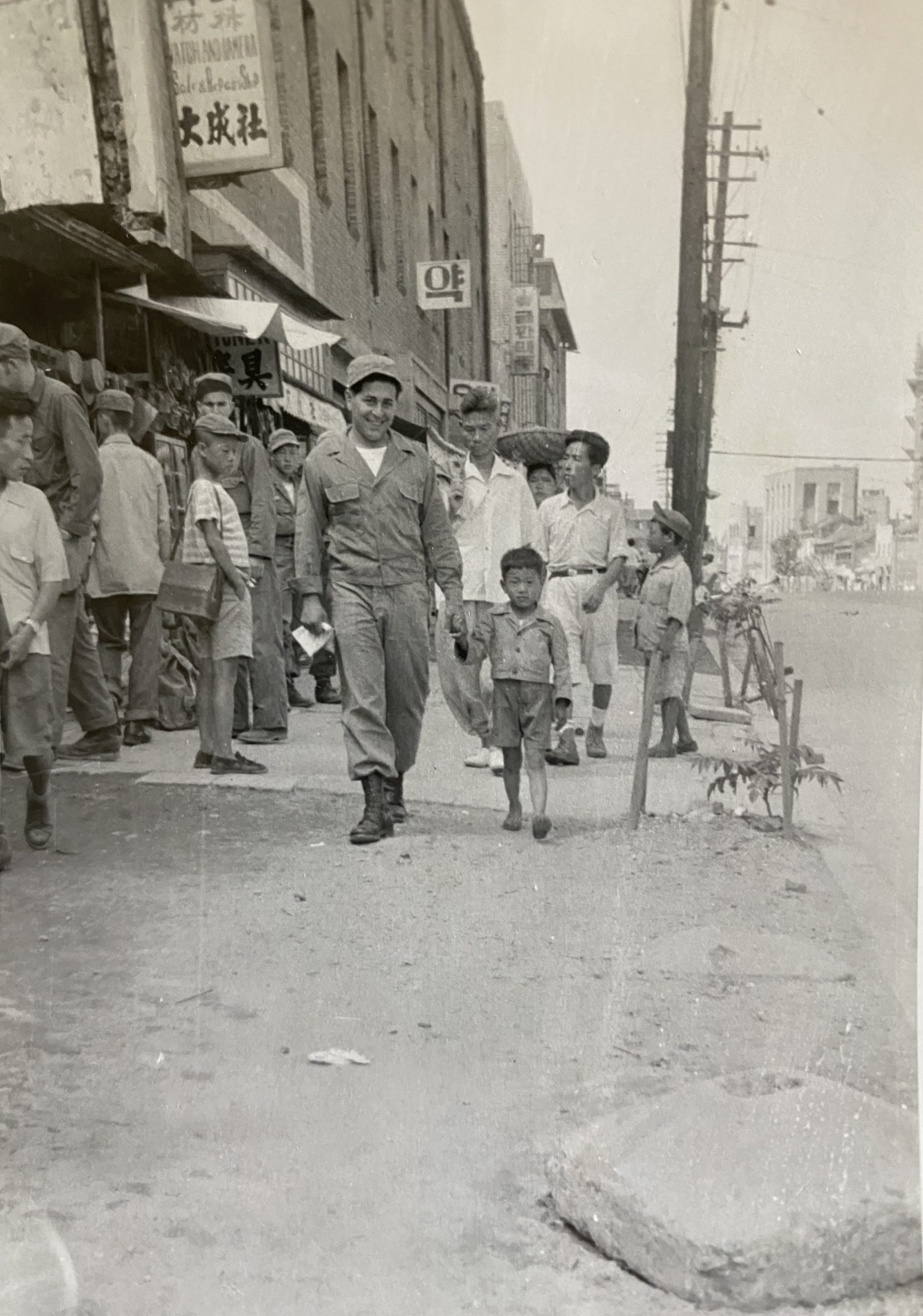
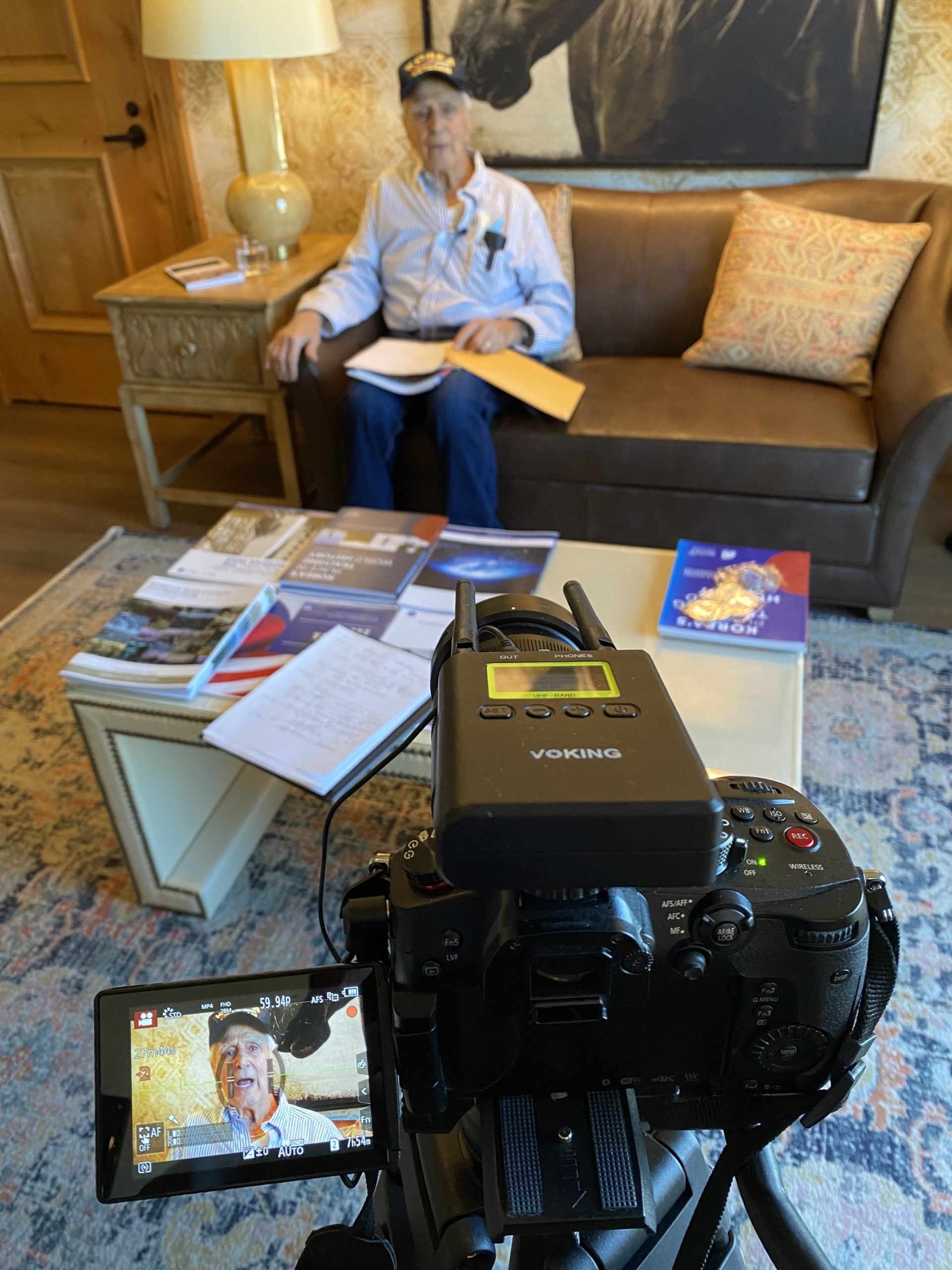
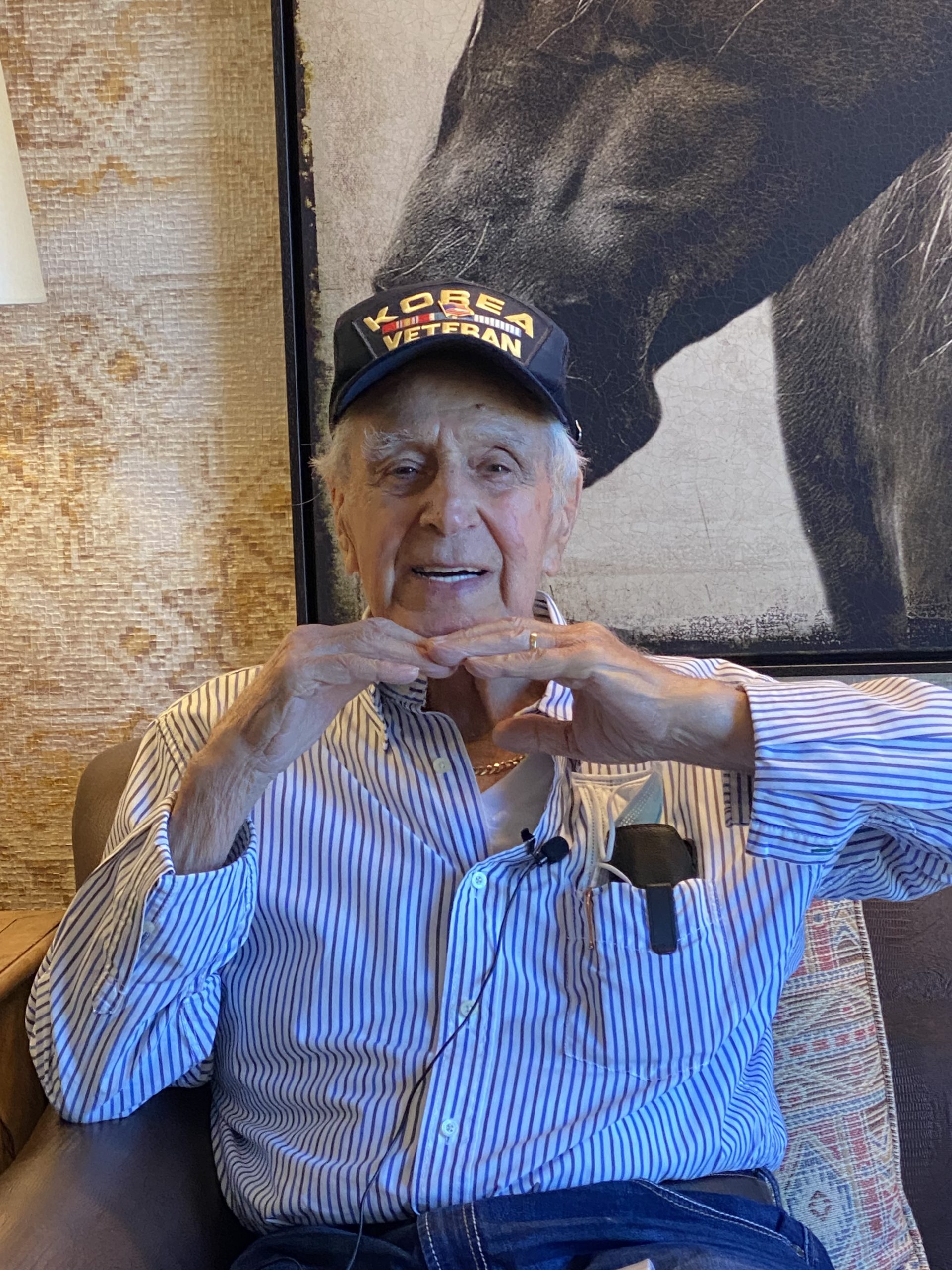
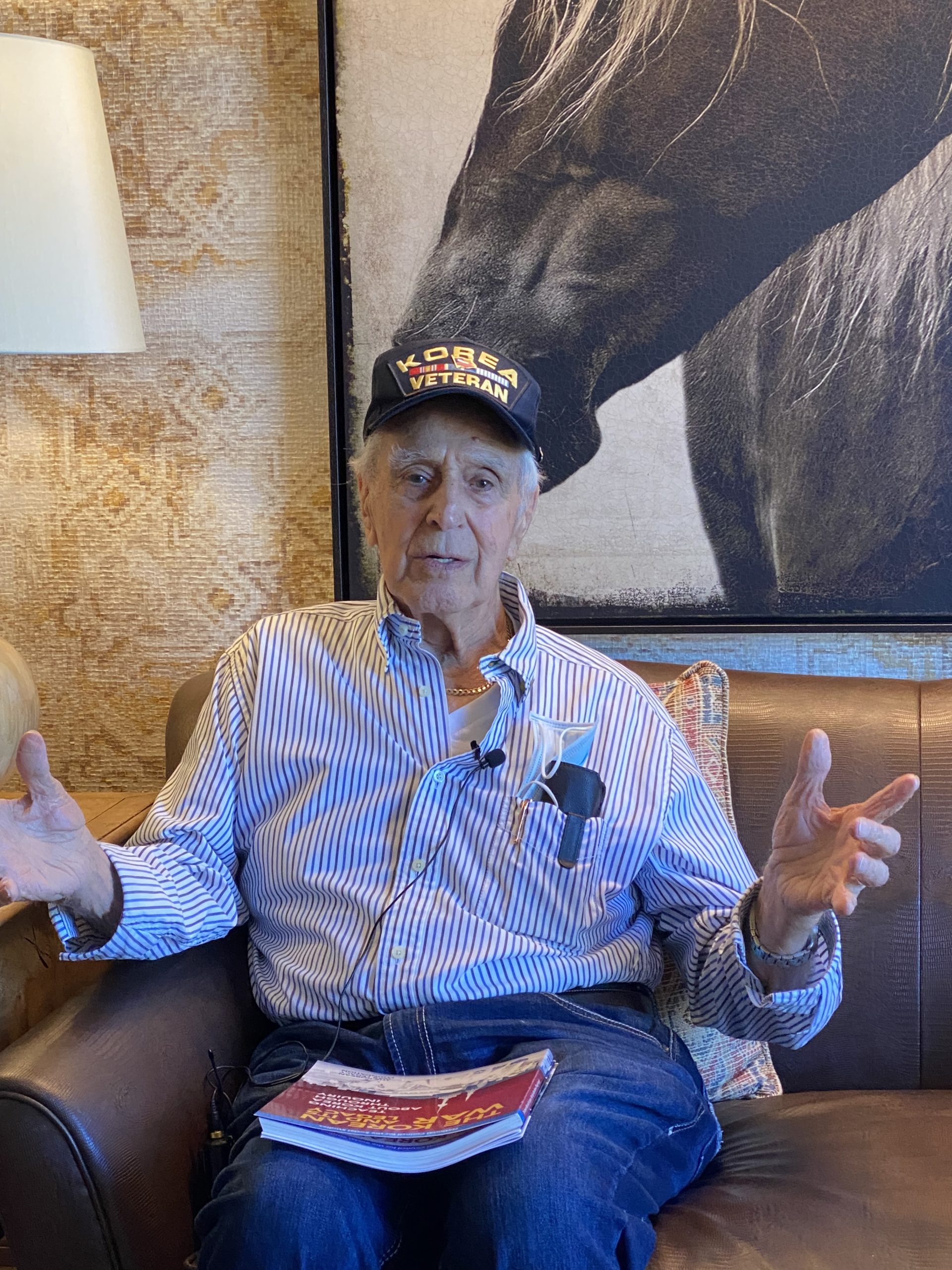
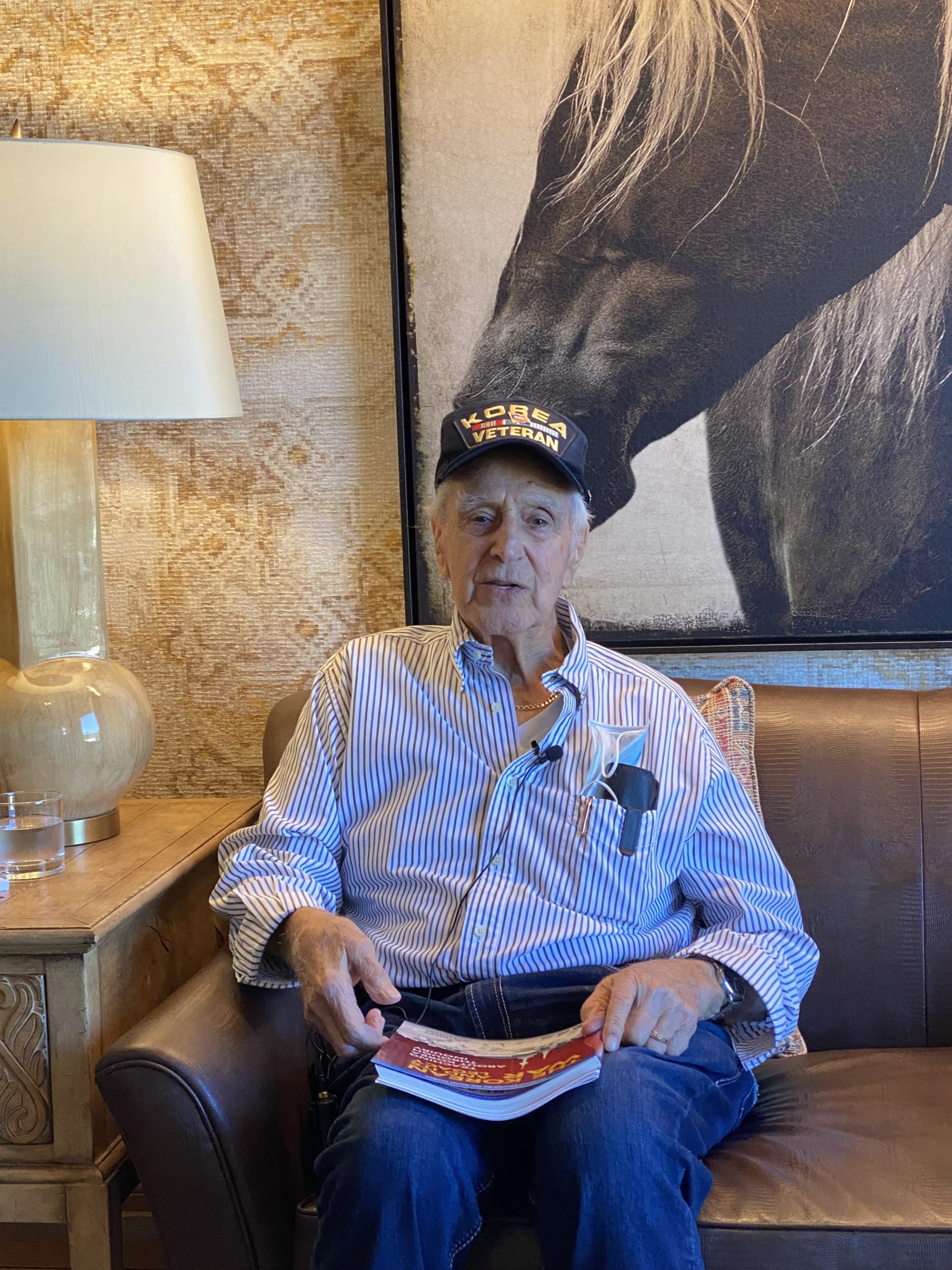
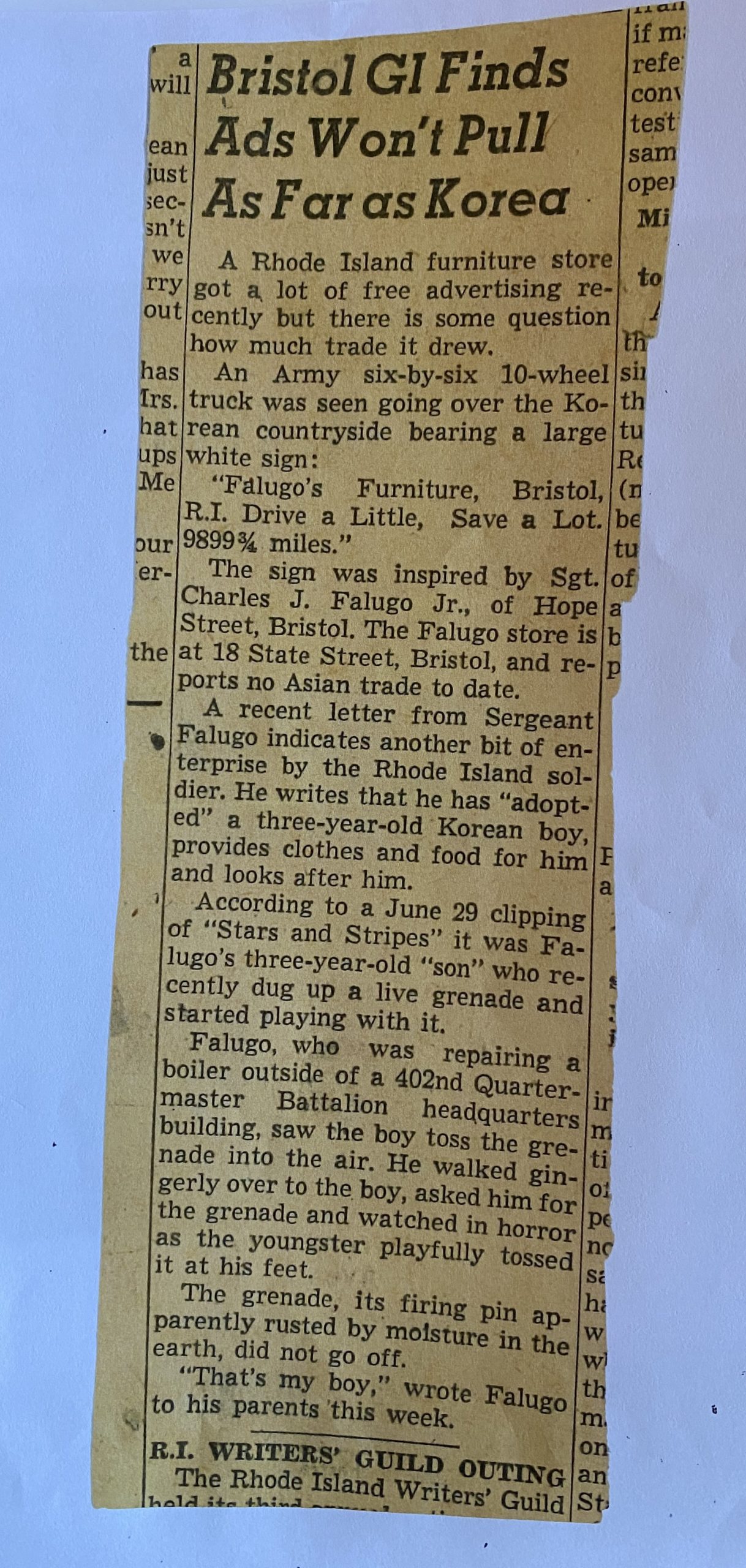
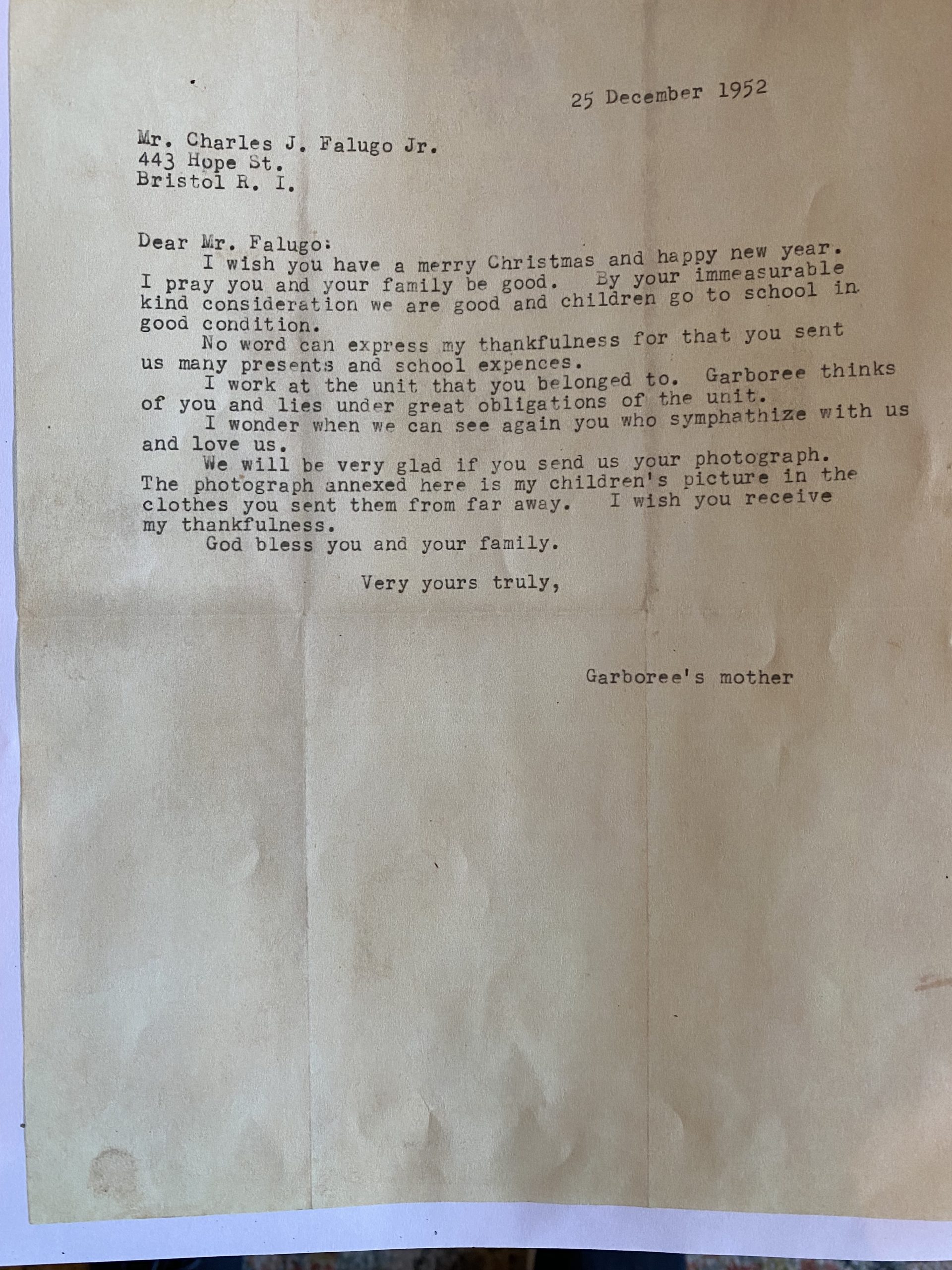
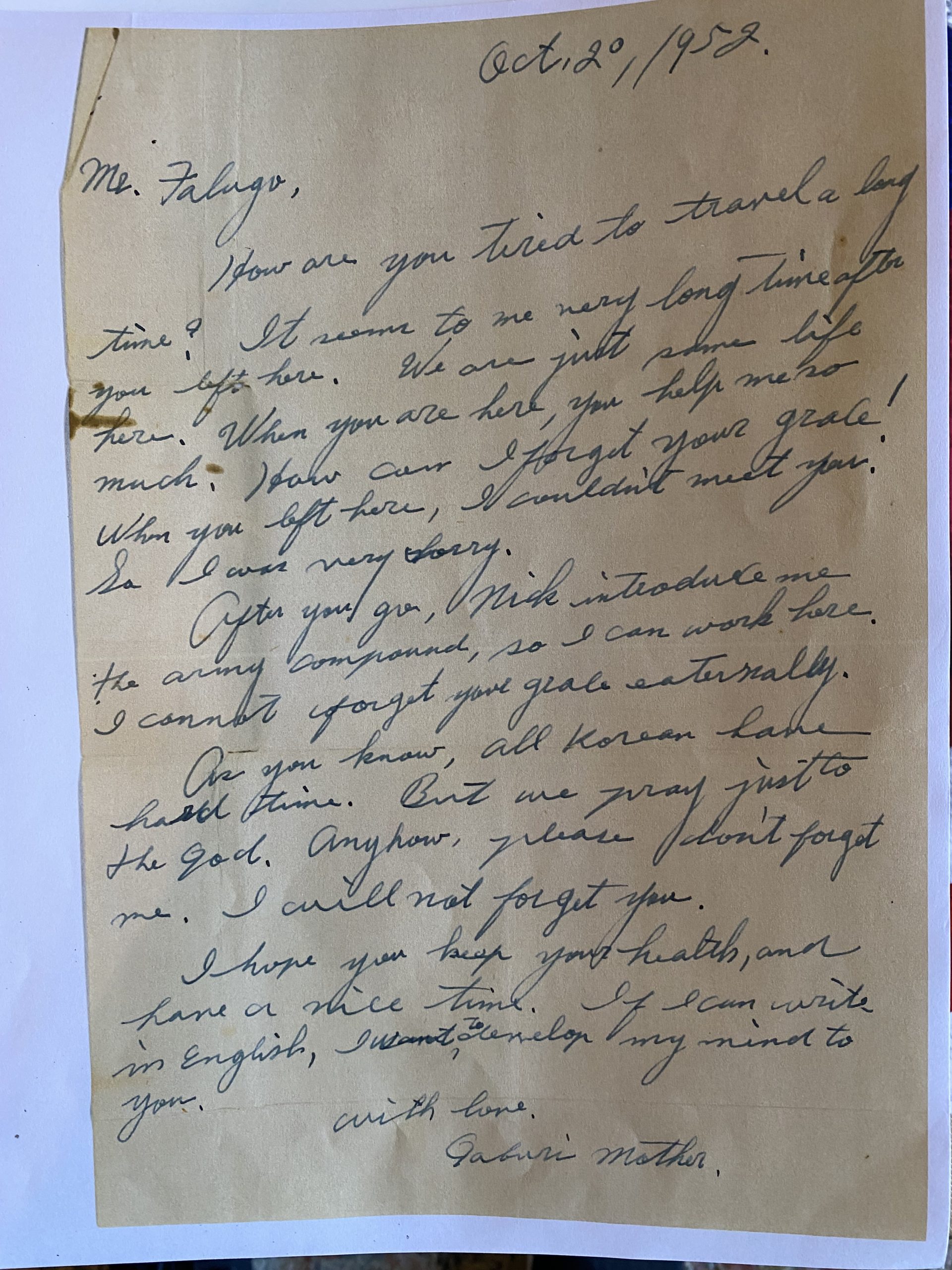
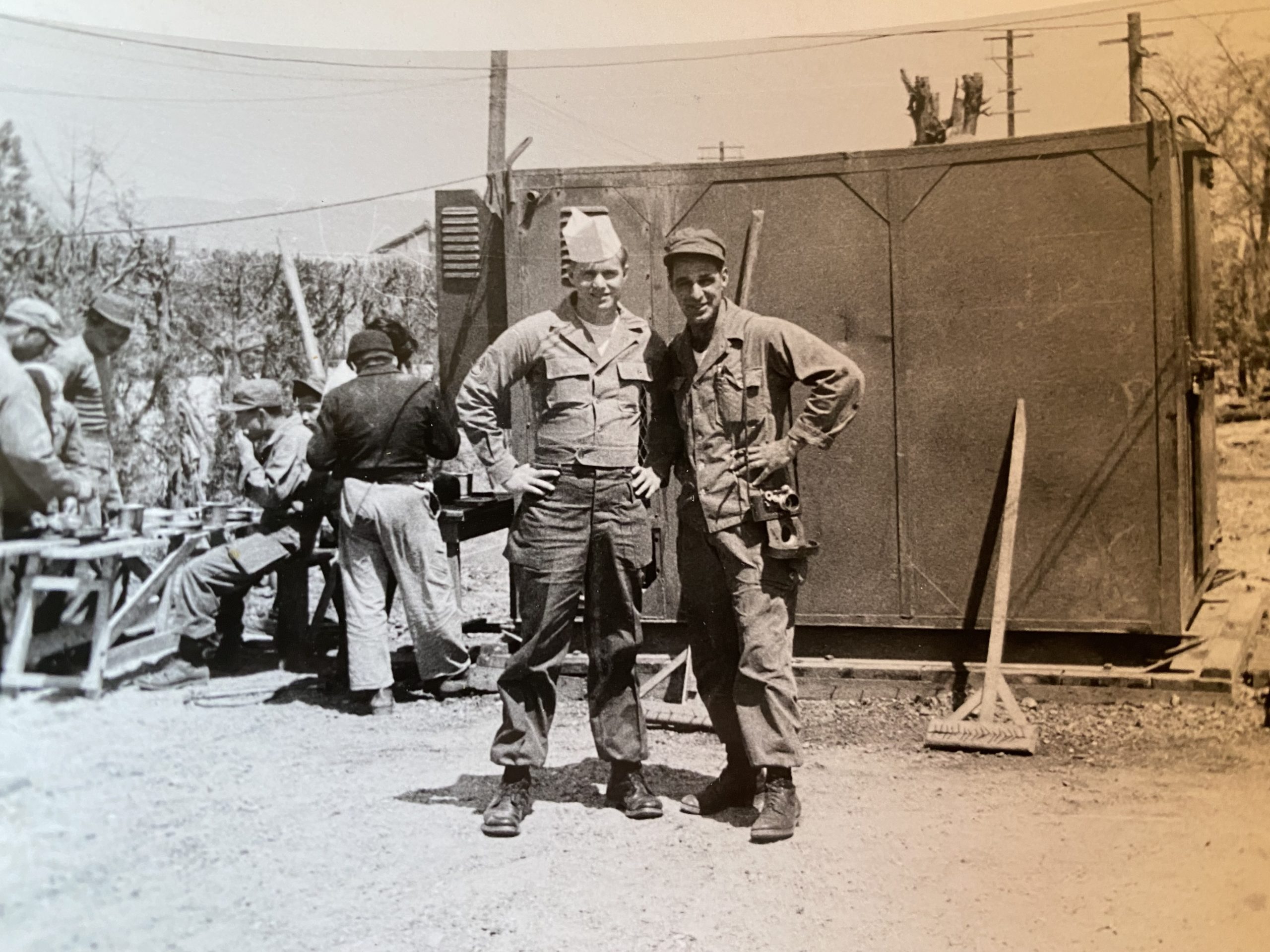
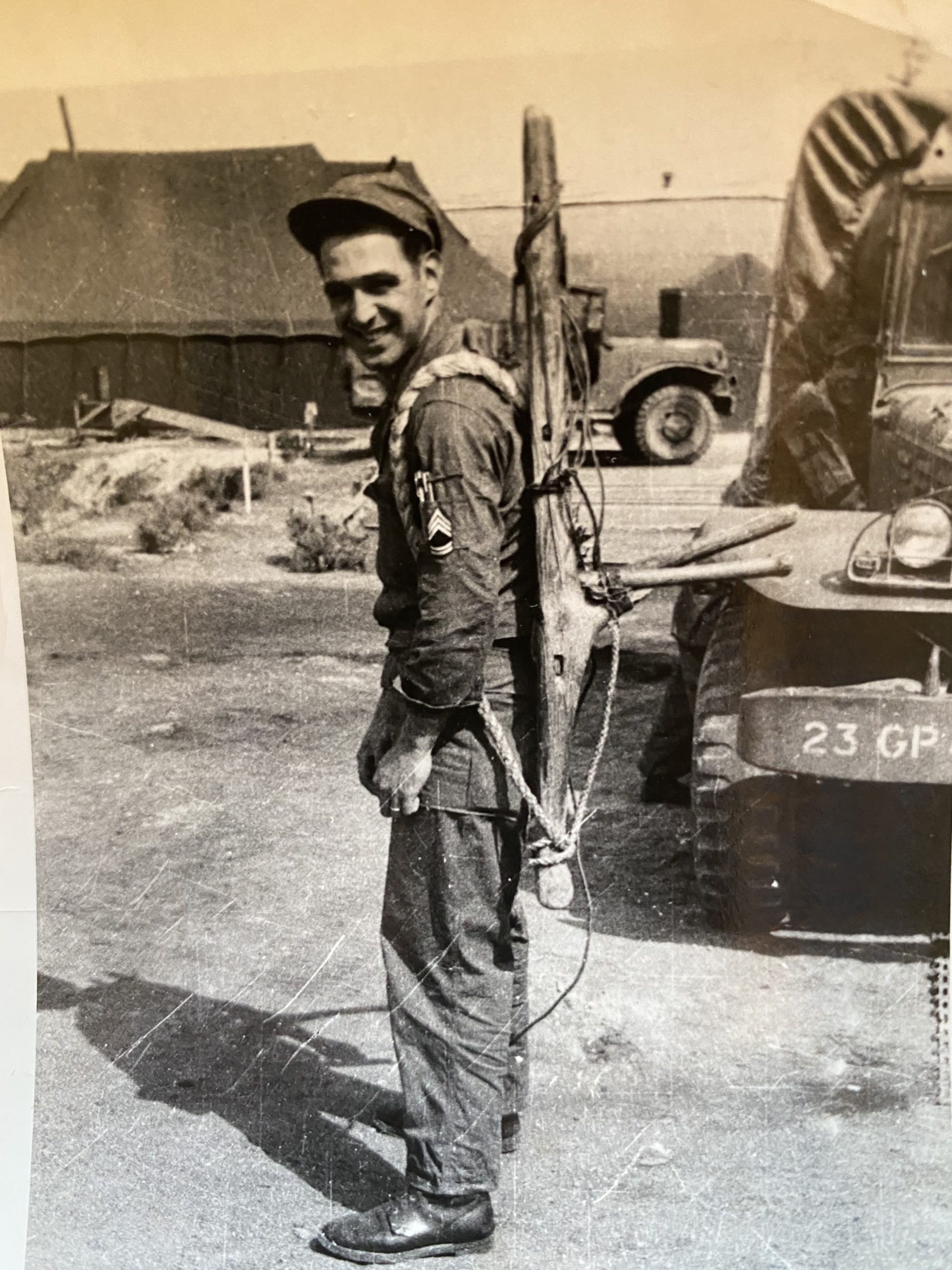
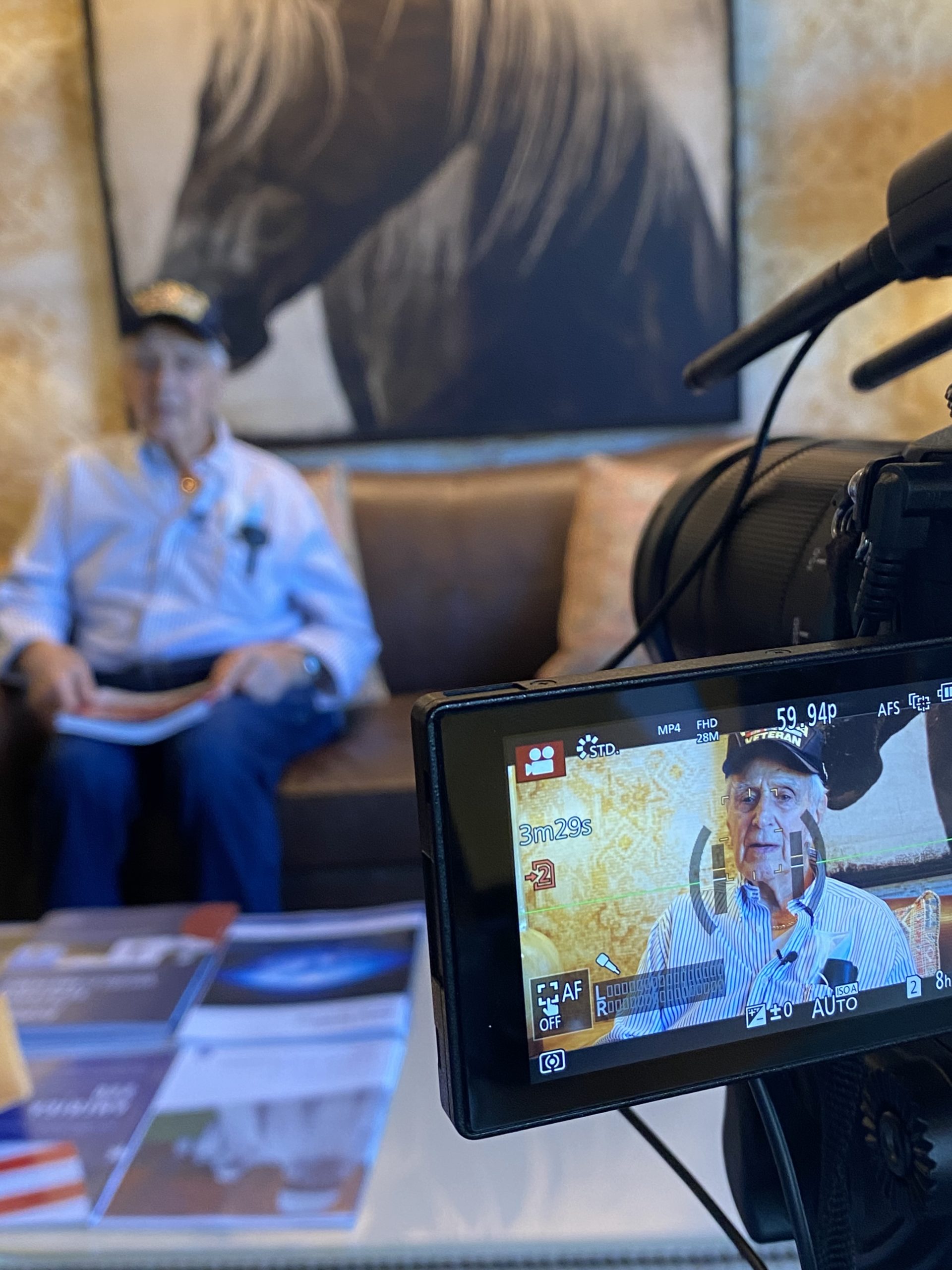
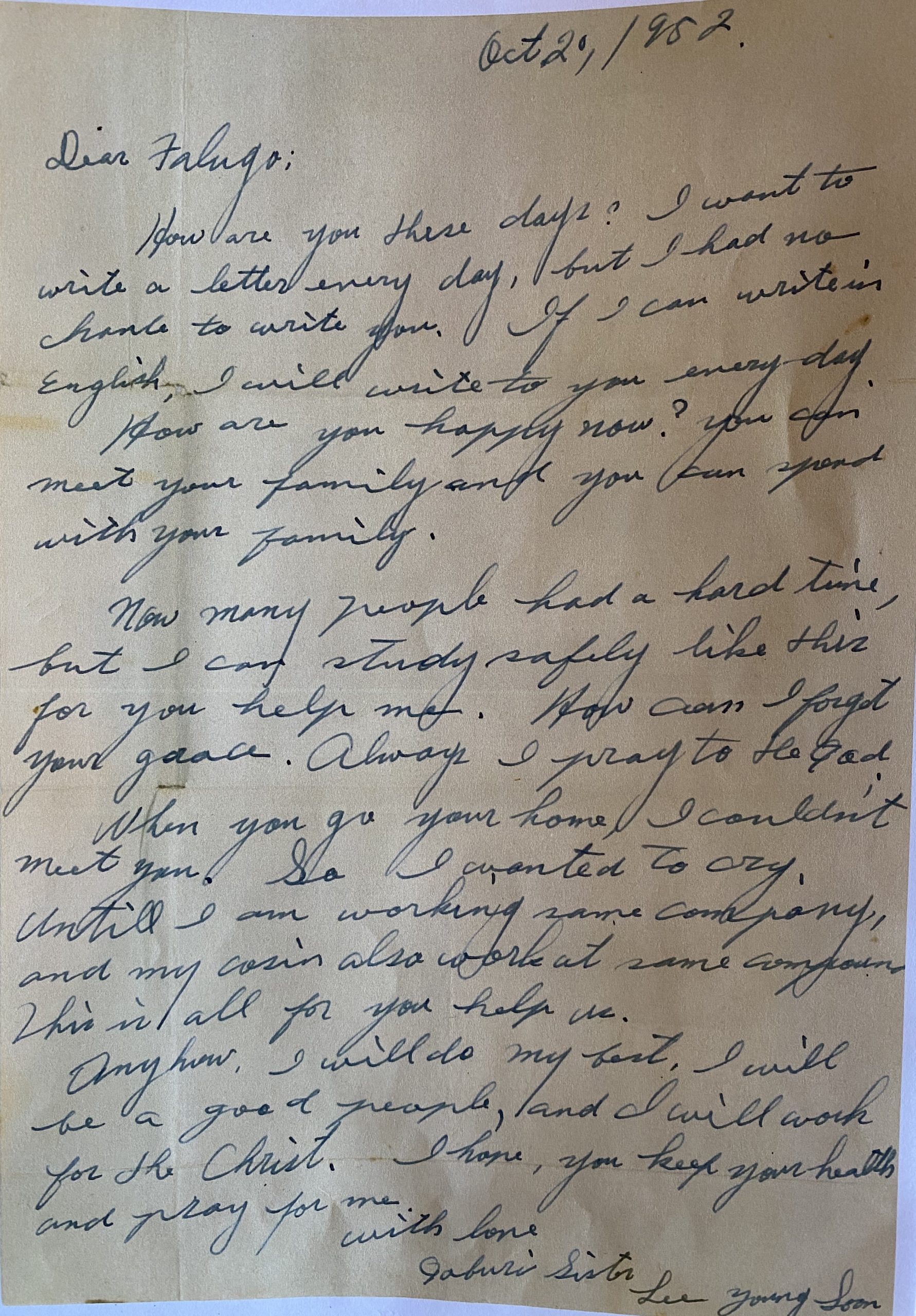
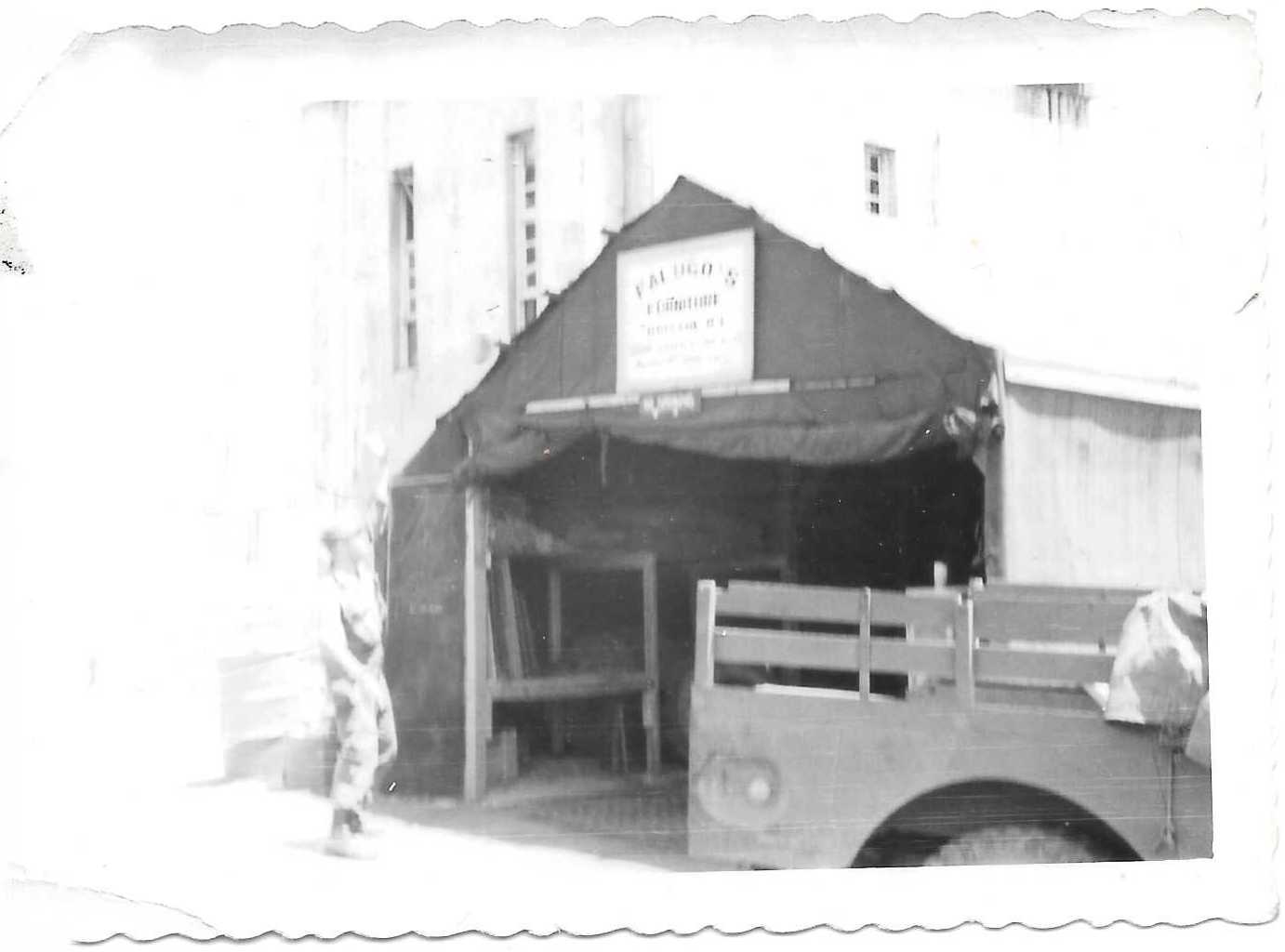
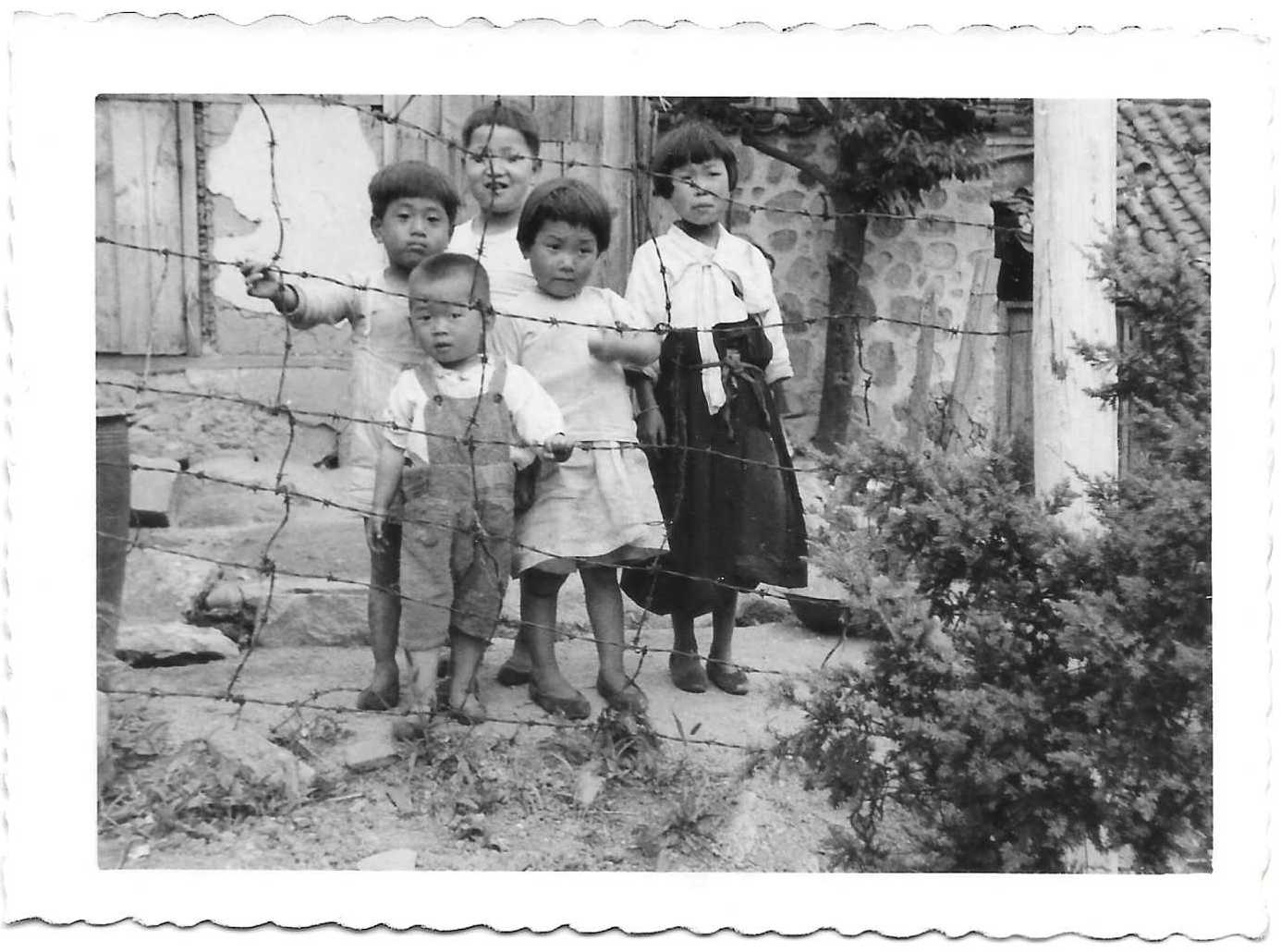
Newspaper Clipping - Part 1
"Thrown Hand Grenade Introduced Bristol G.I. To Little Korean Chum"
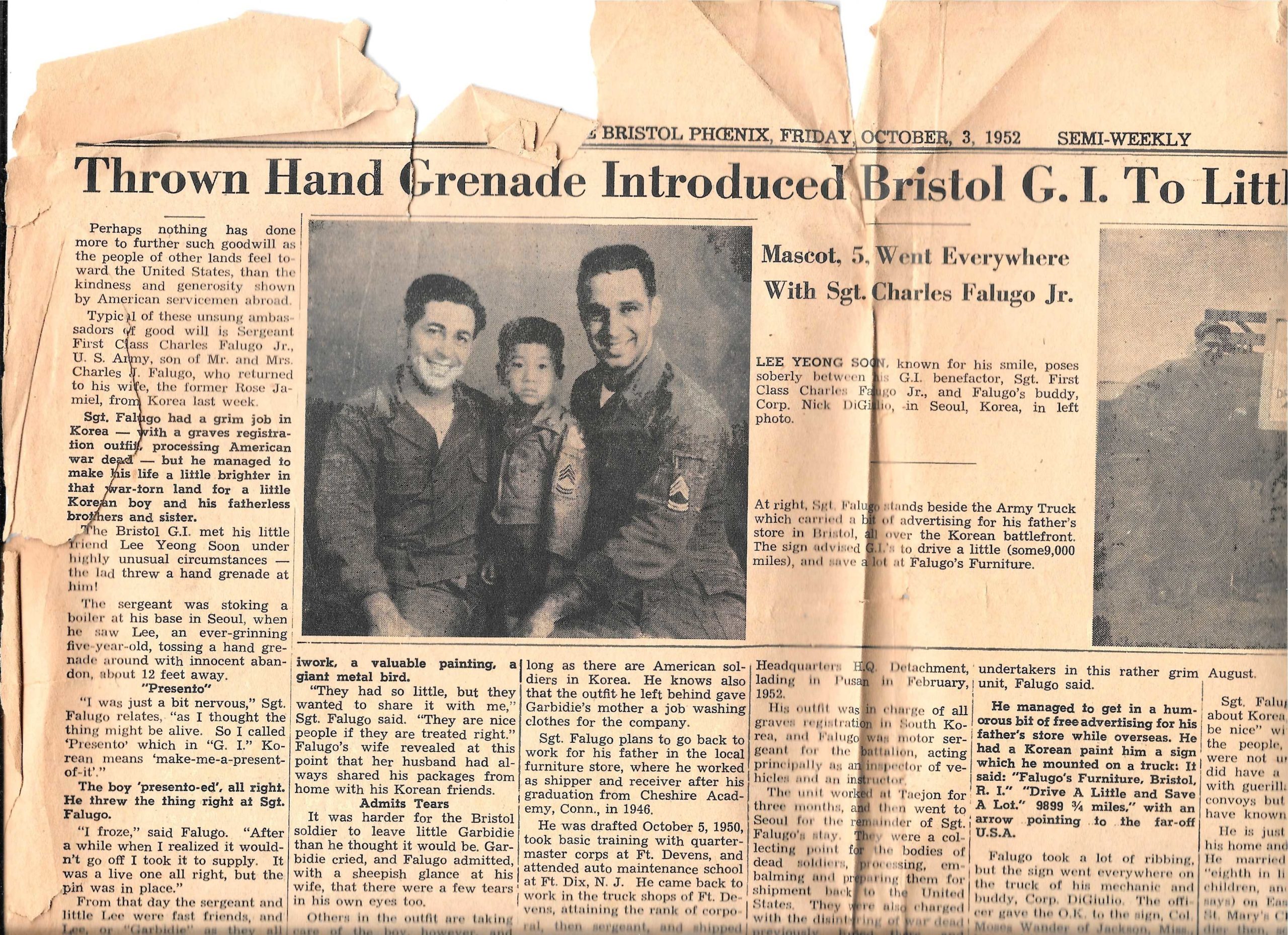
Newspaper Clipping - Part 2
"Thrown Hand Grenade Introduced Bristol G.I. To Little Korean Chum"
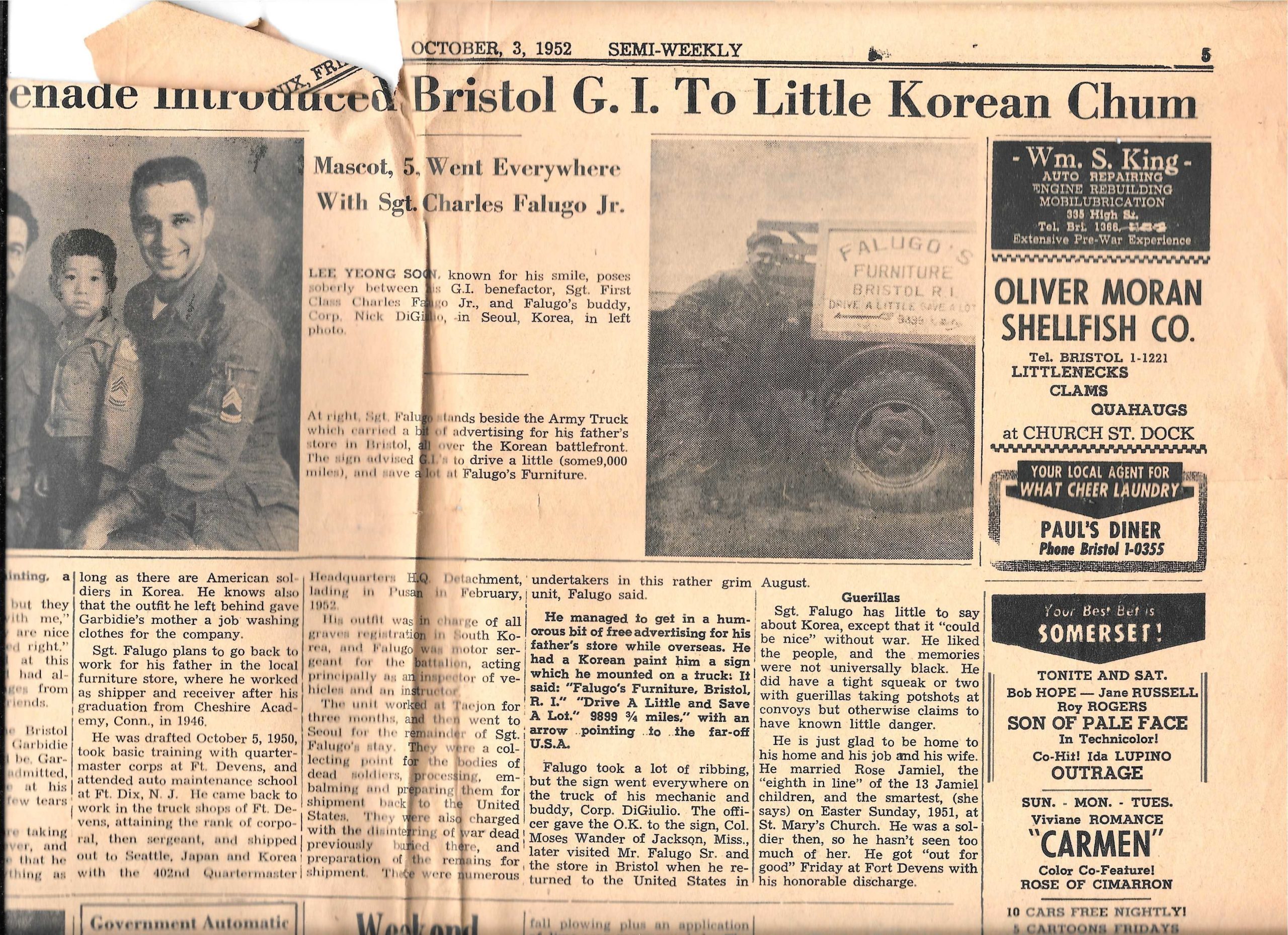
Newspaper Clipping - Part 3
"Thrown Hand Grenade Introduced Bristol G.I. To Little Korean Chum"
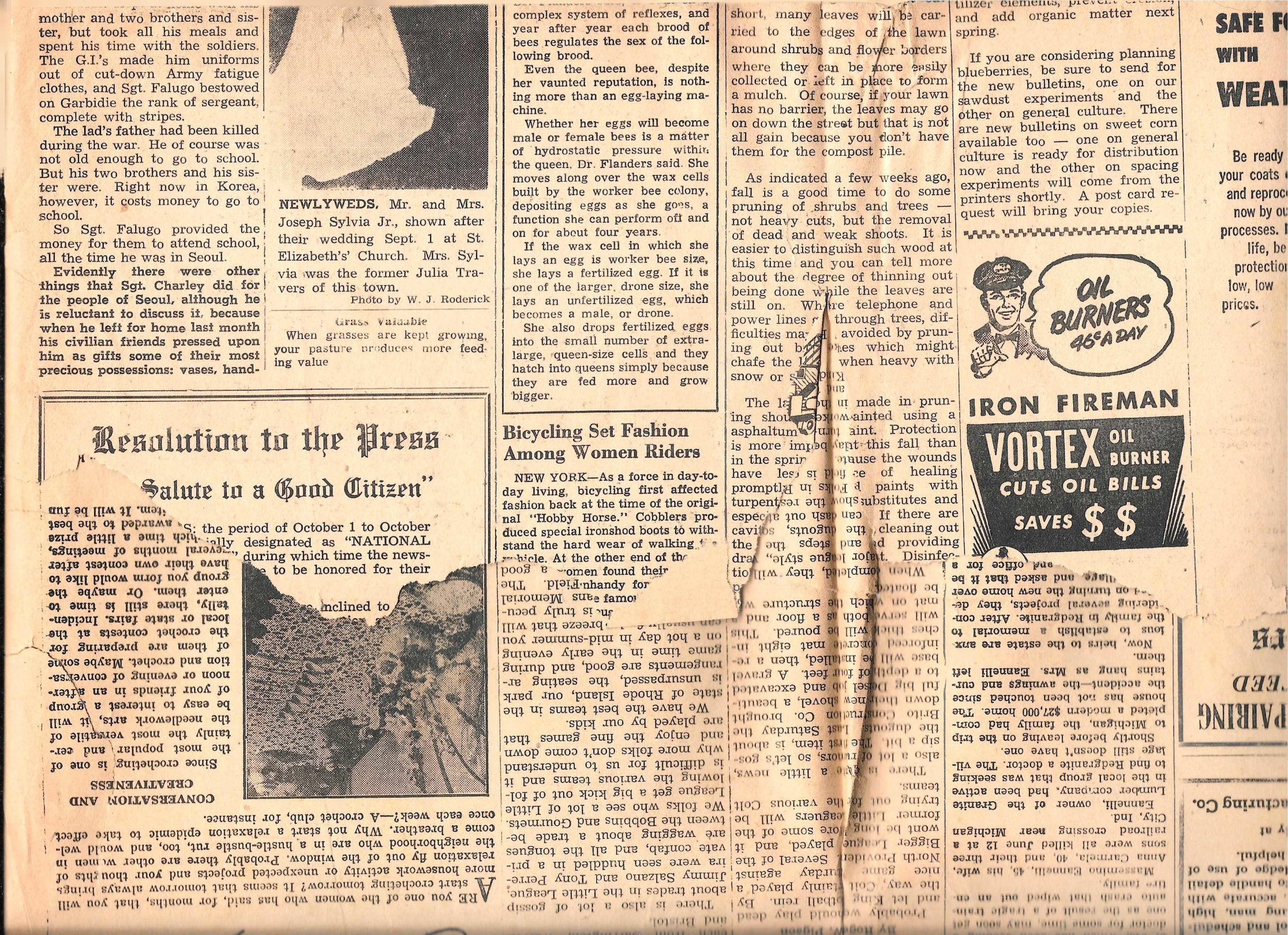
Newspaper Clipping
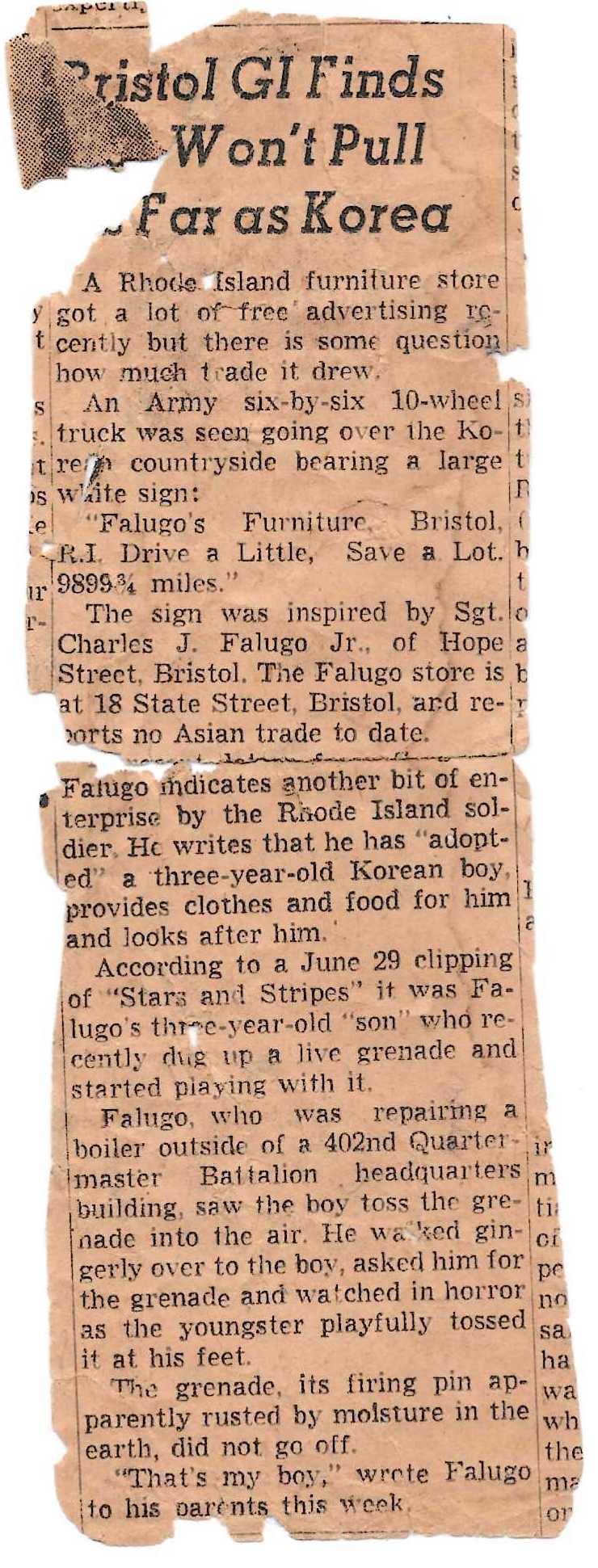
Taejon (Daejeon)
Me and My Truck
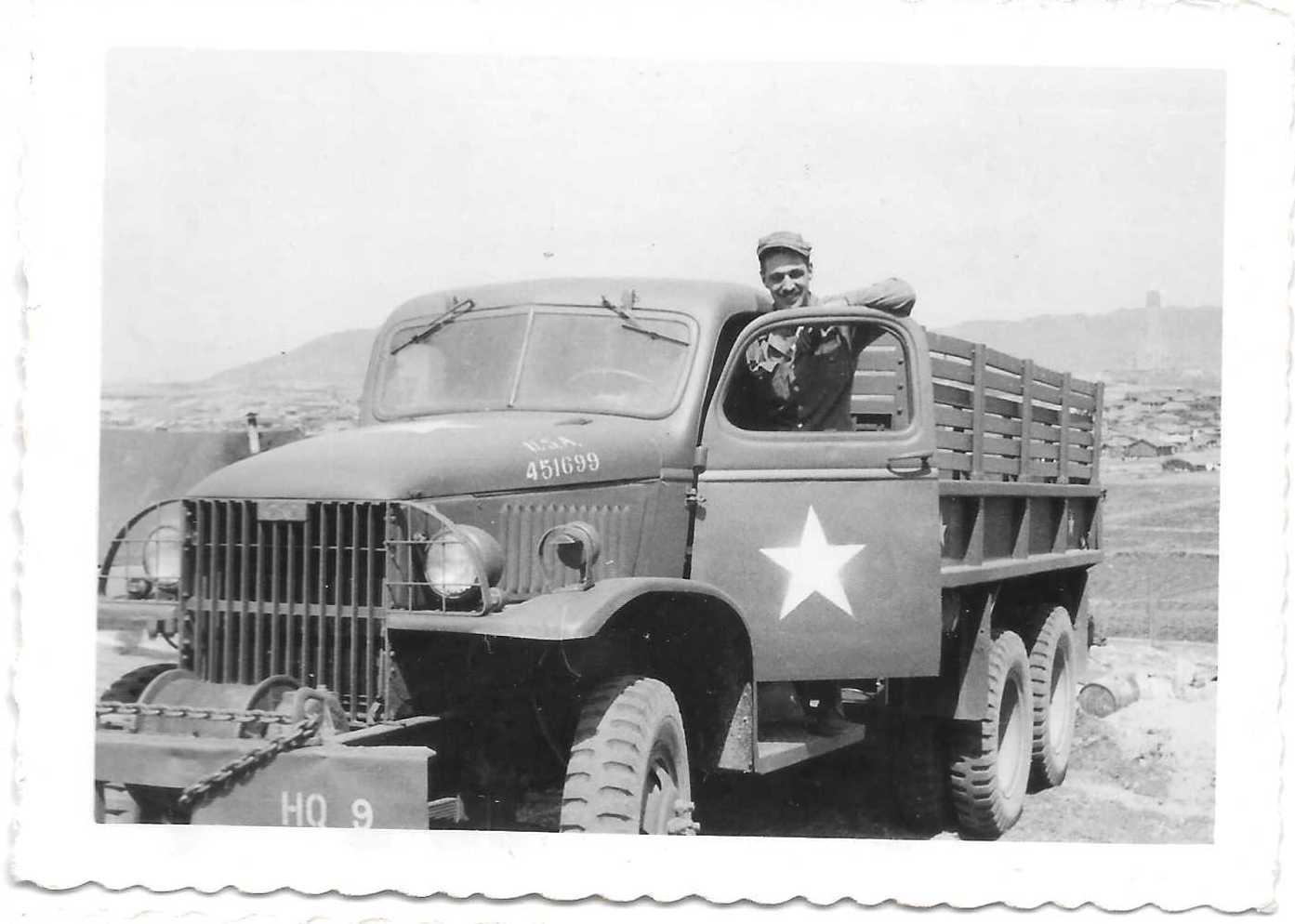
A shopping street
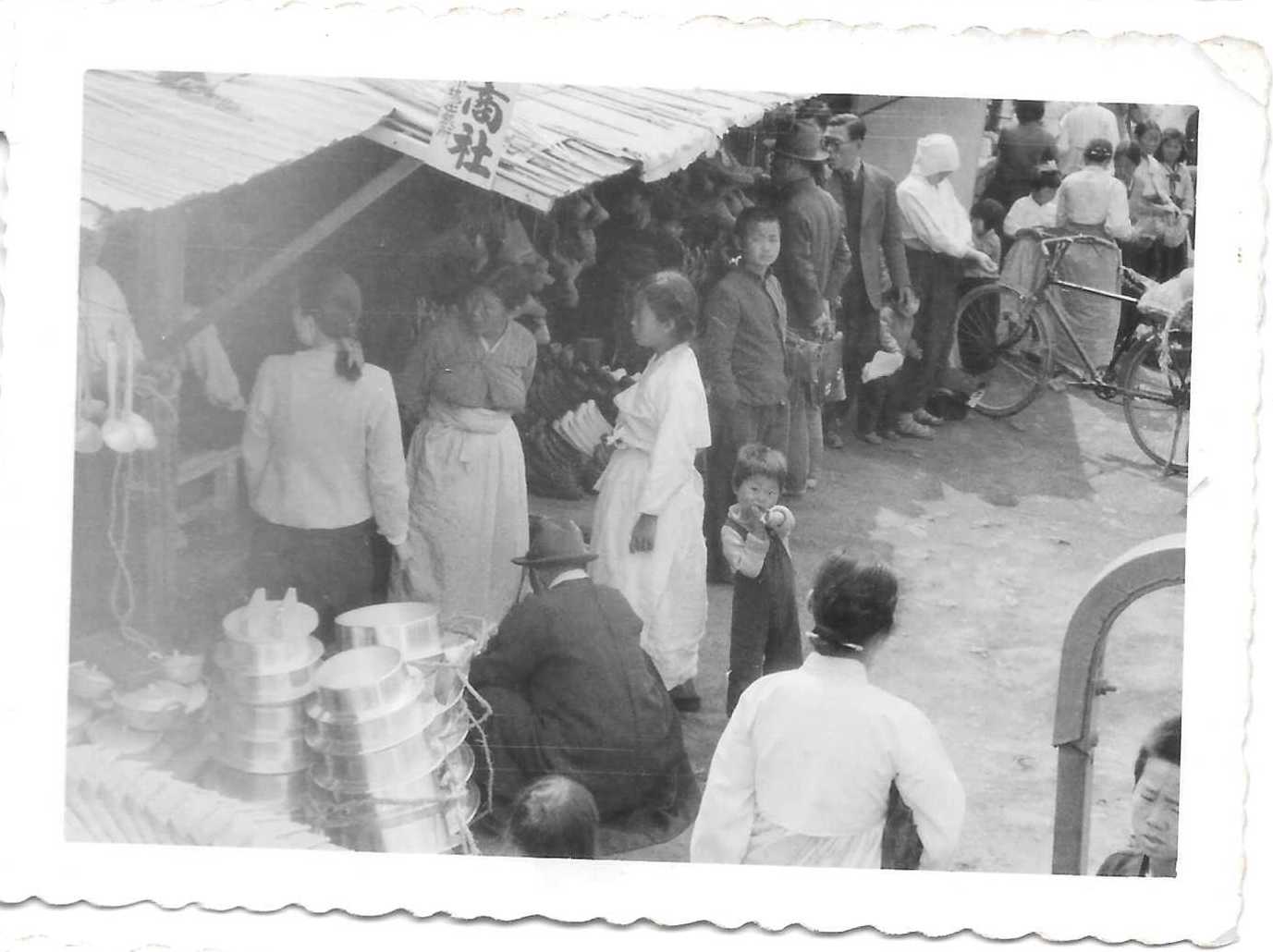
Teajon (Daejeon)
One of the shopping streets
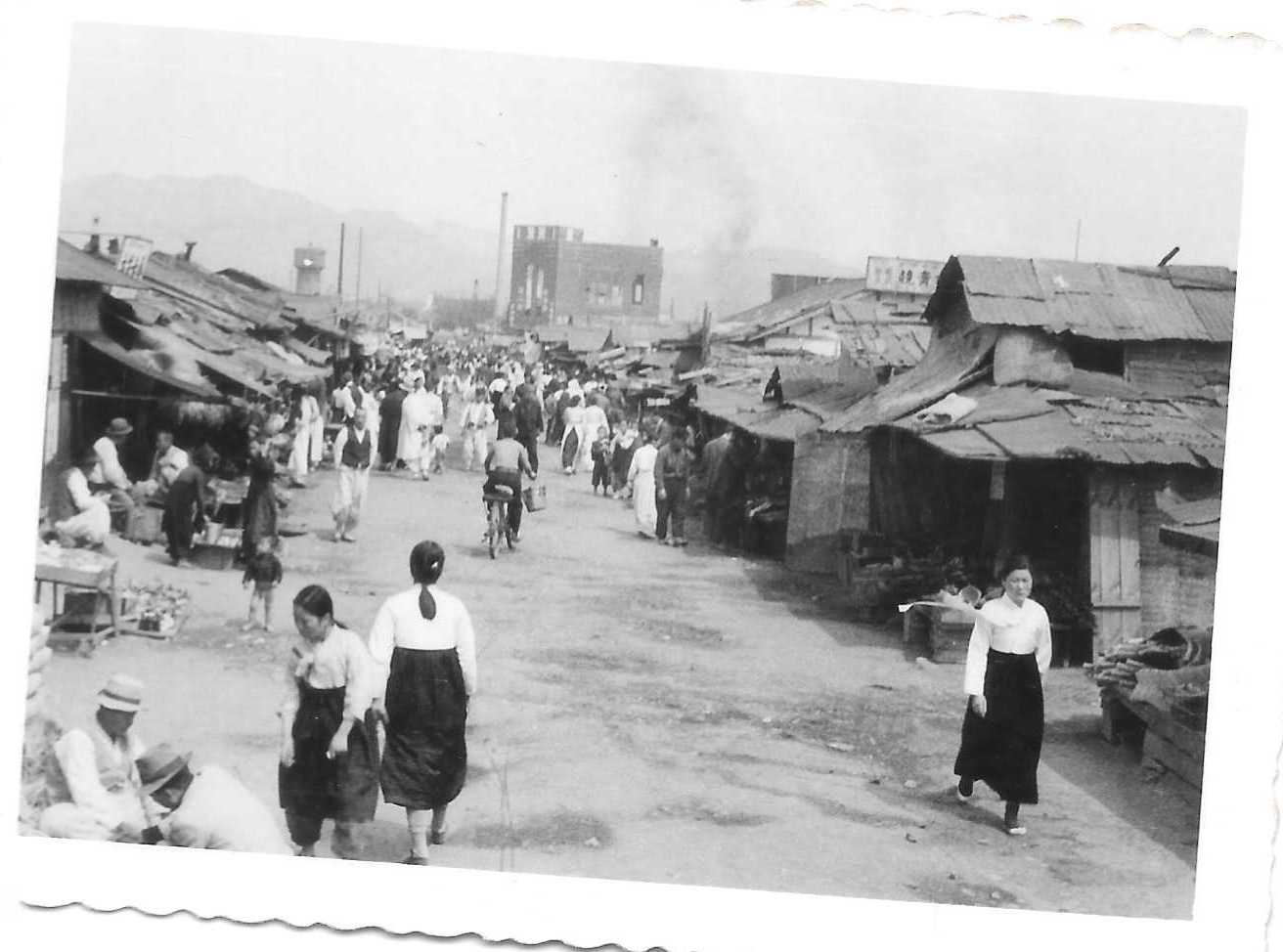
A side view of my motor pool
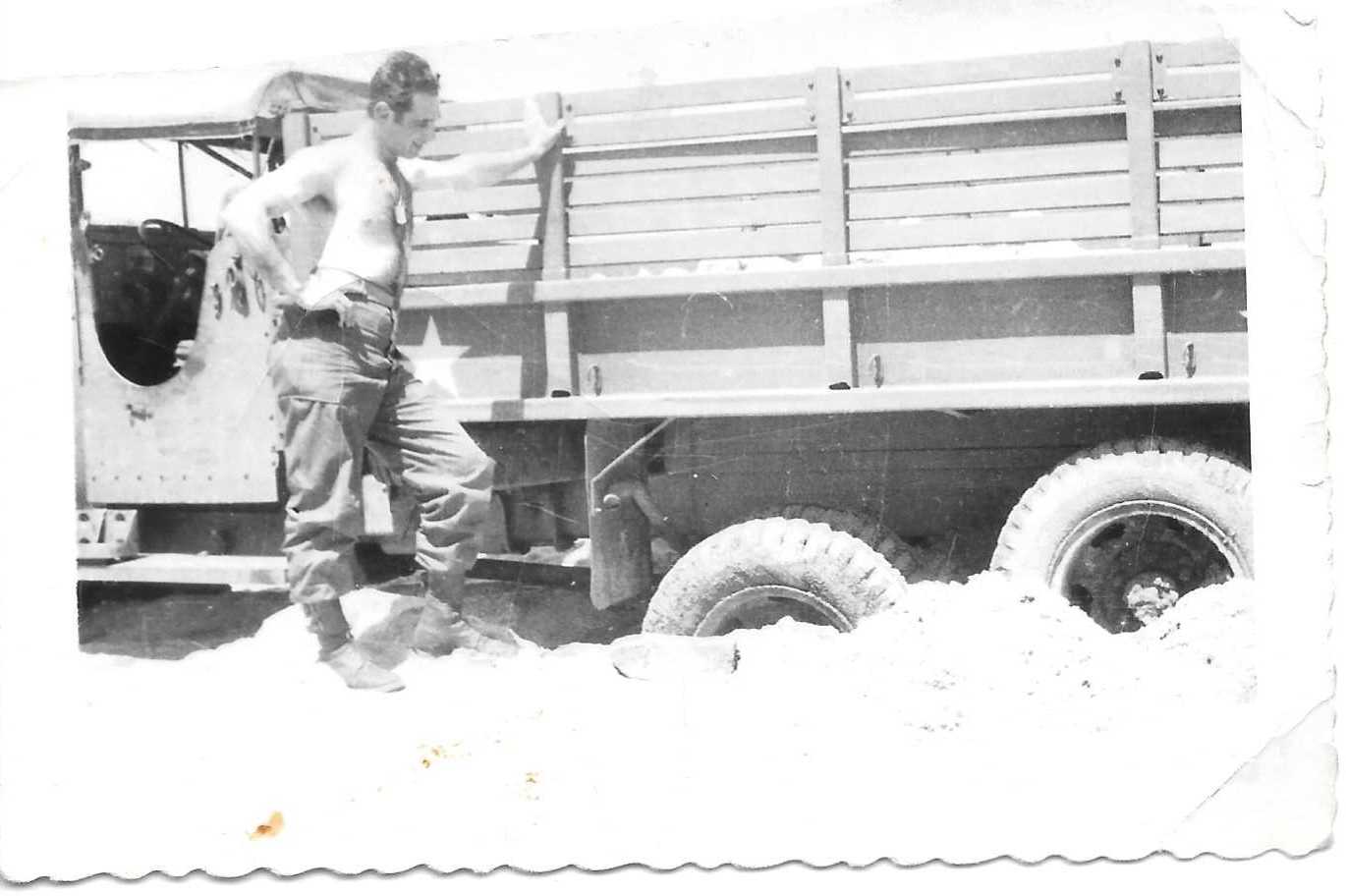
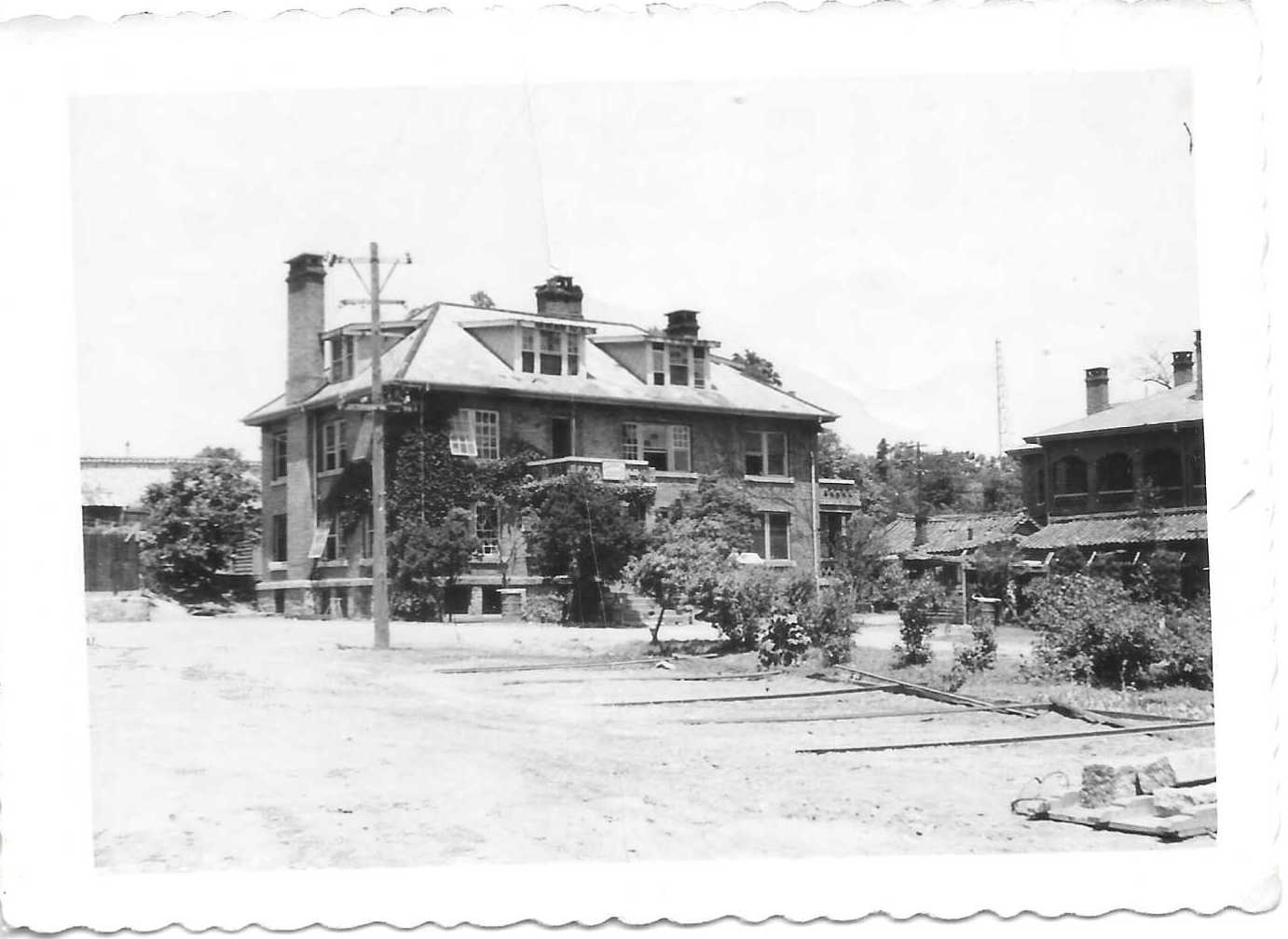
Nick and me eating in the motor pool
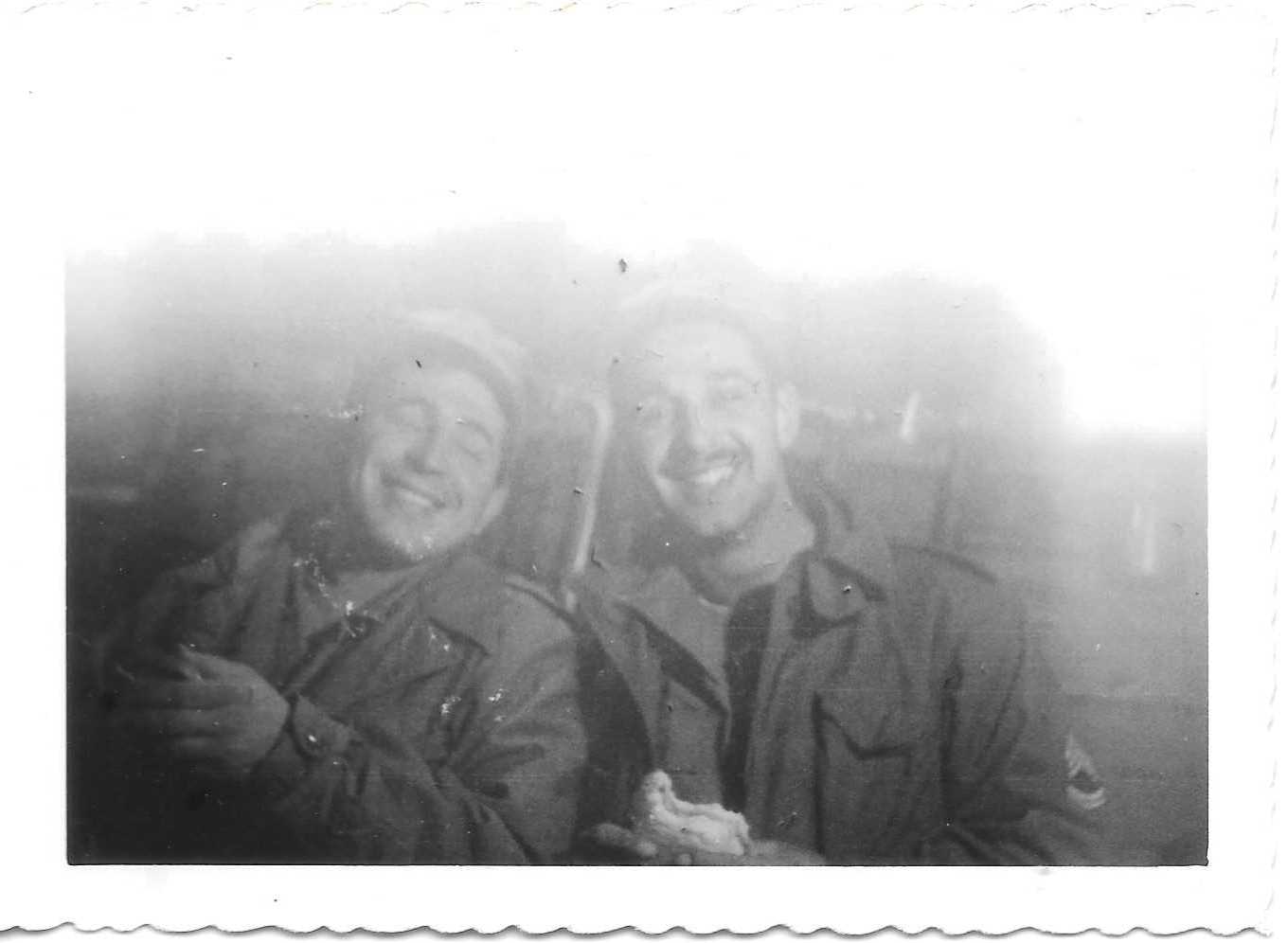
A little kid plowing
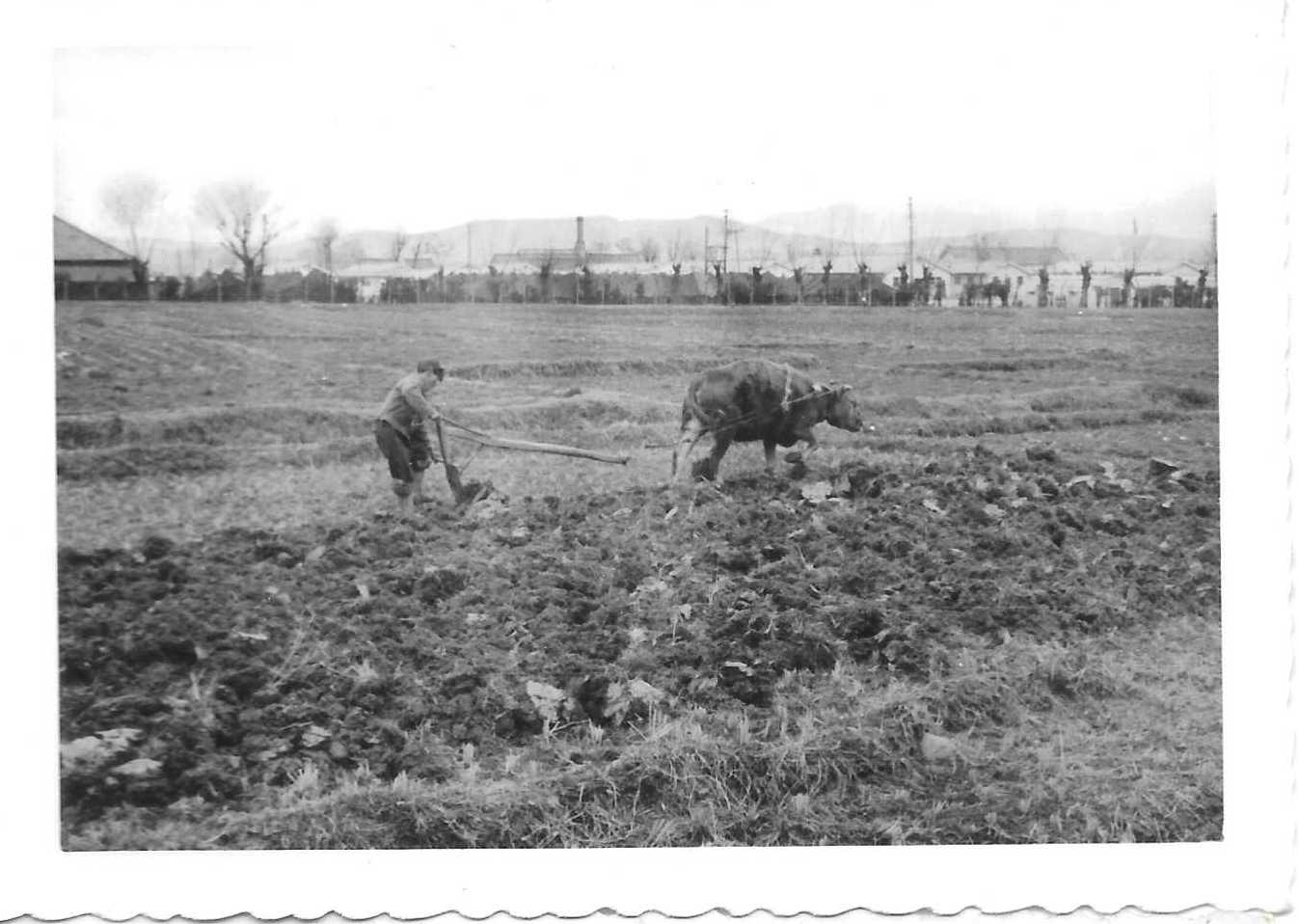
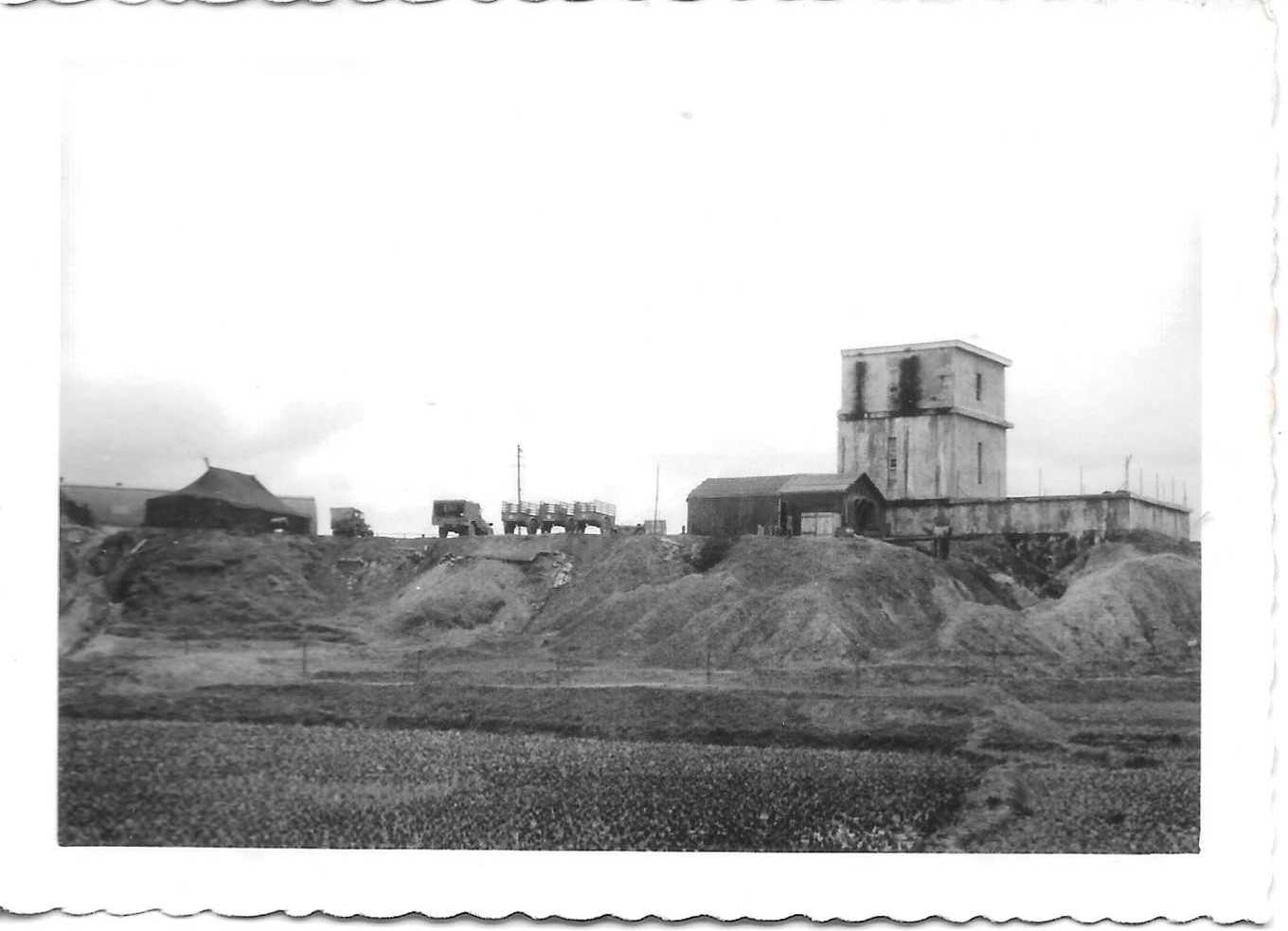
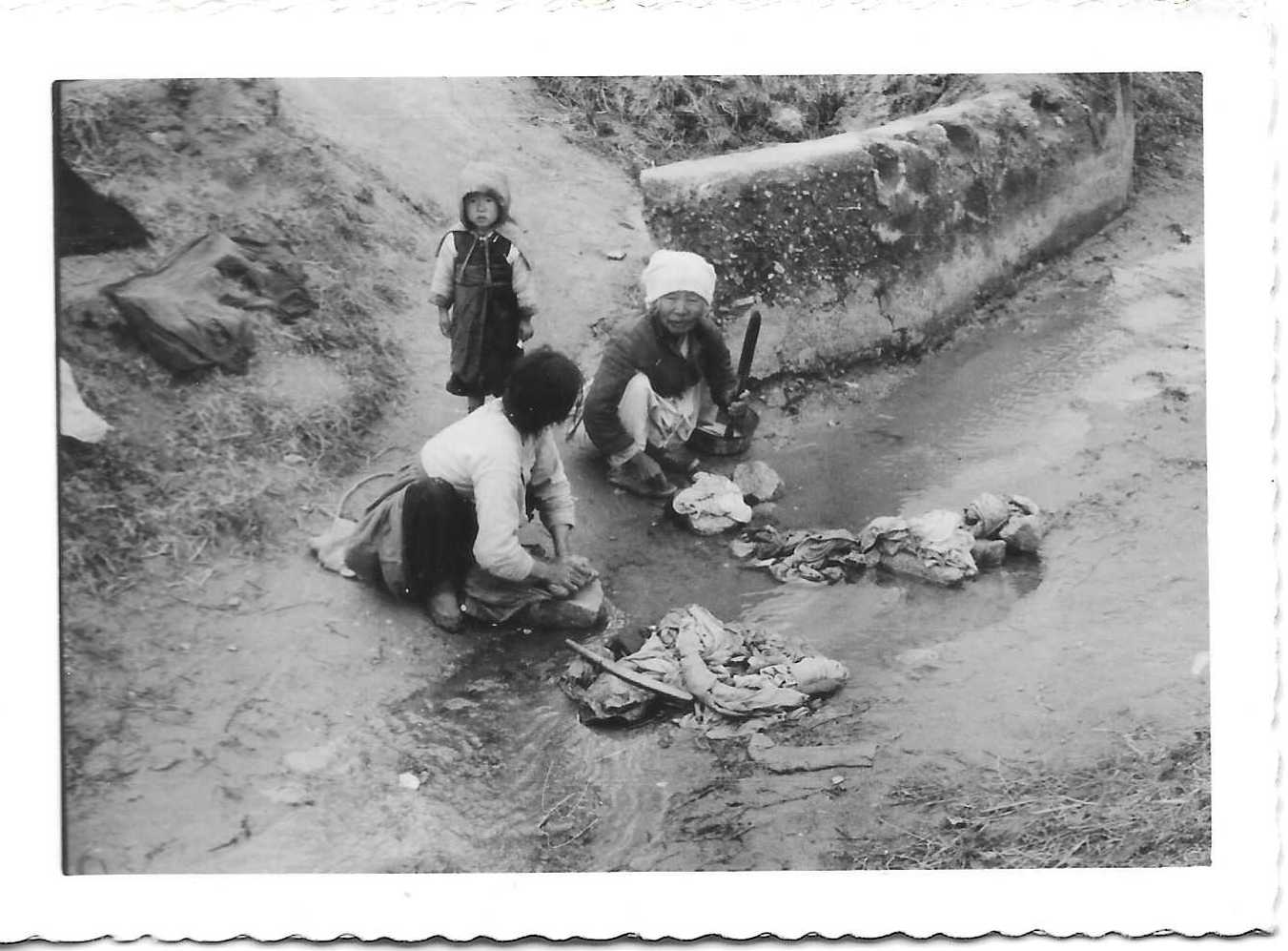
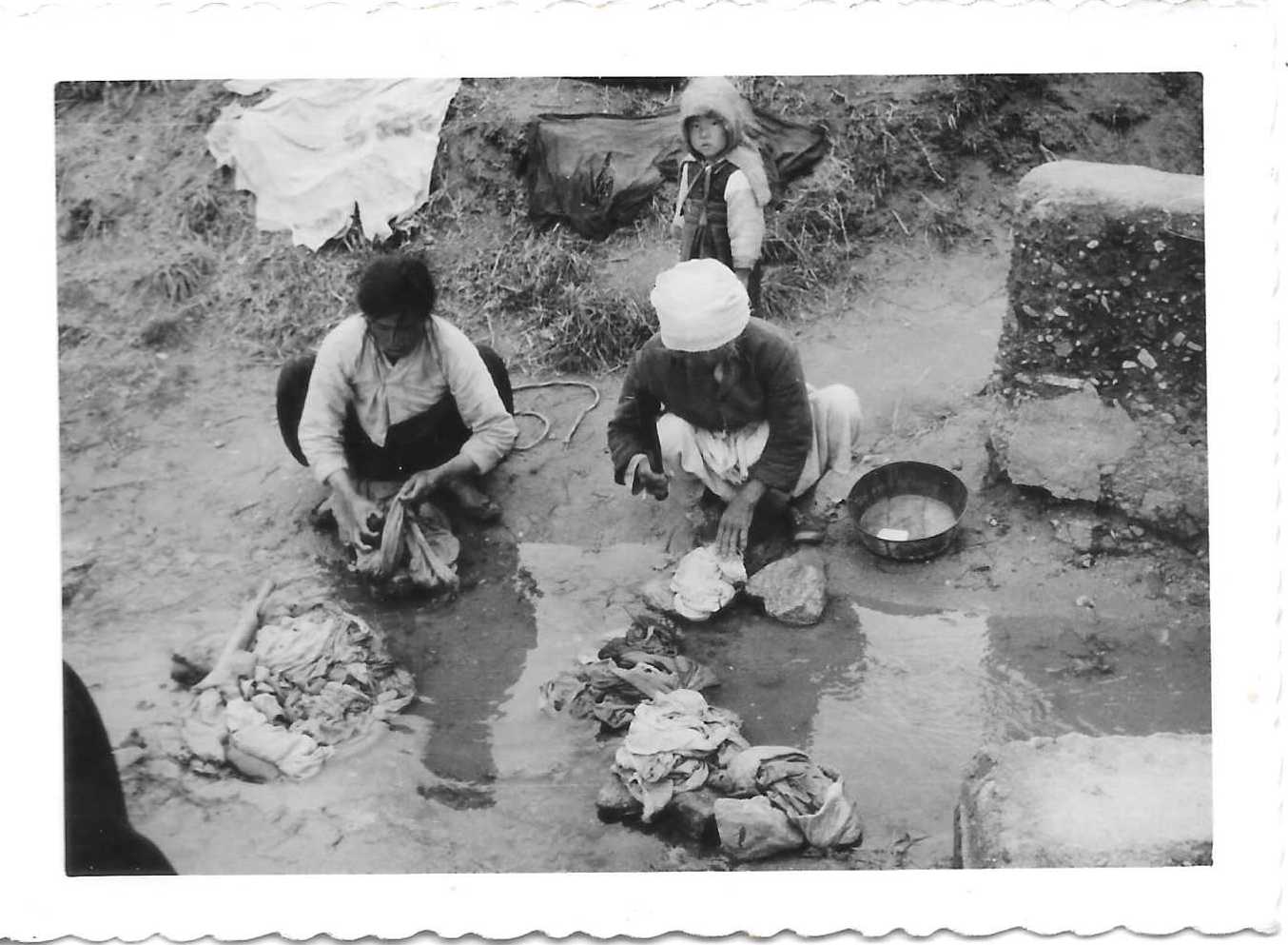
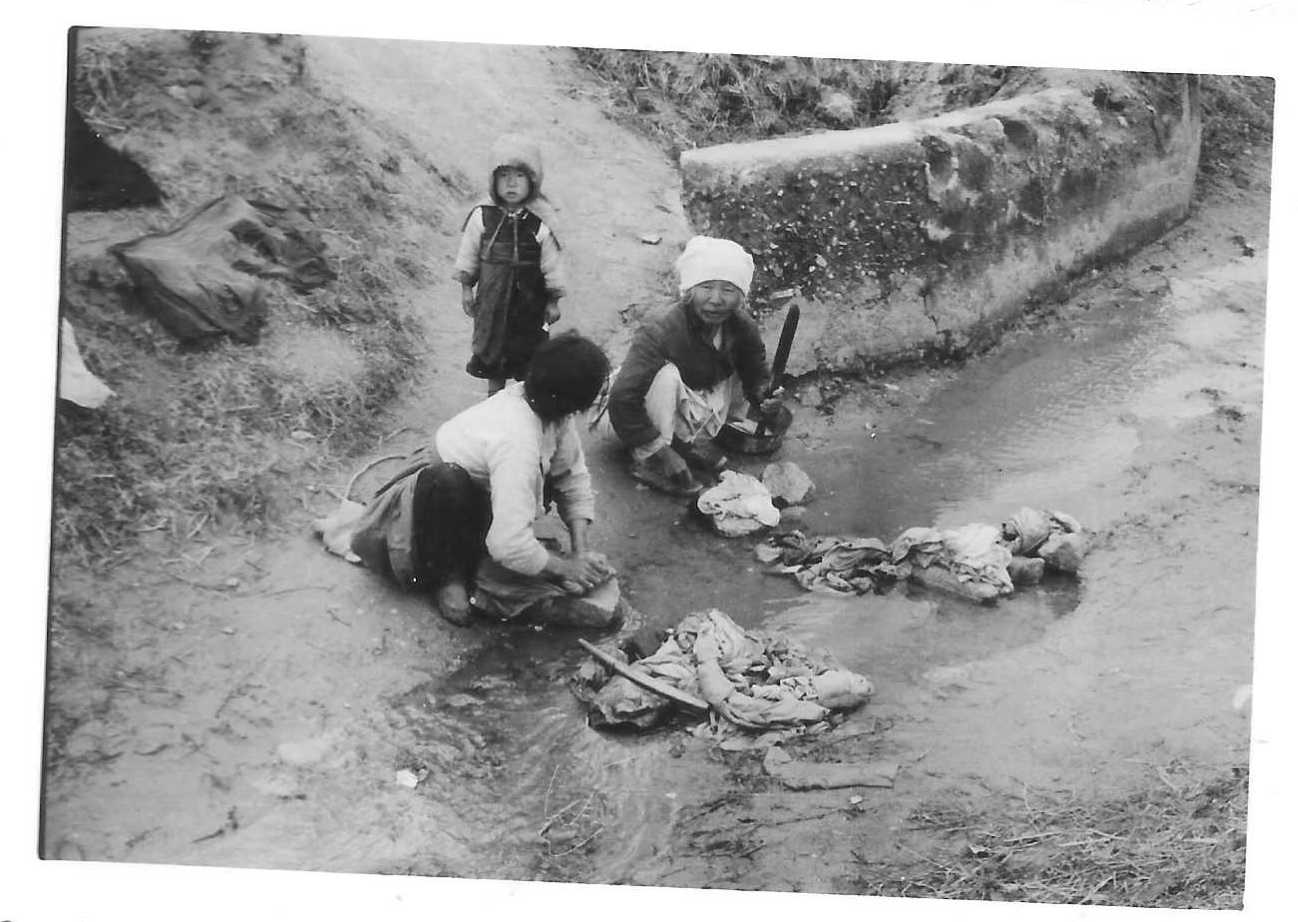
Taejon (Daejeon)
A couple of small kids
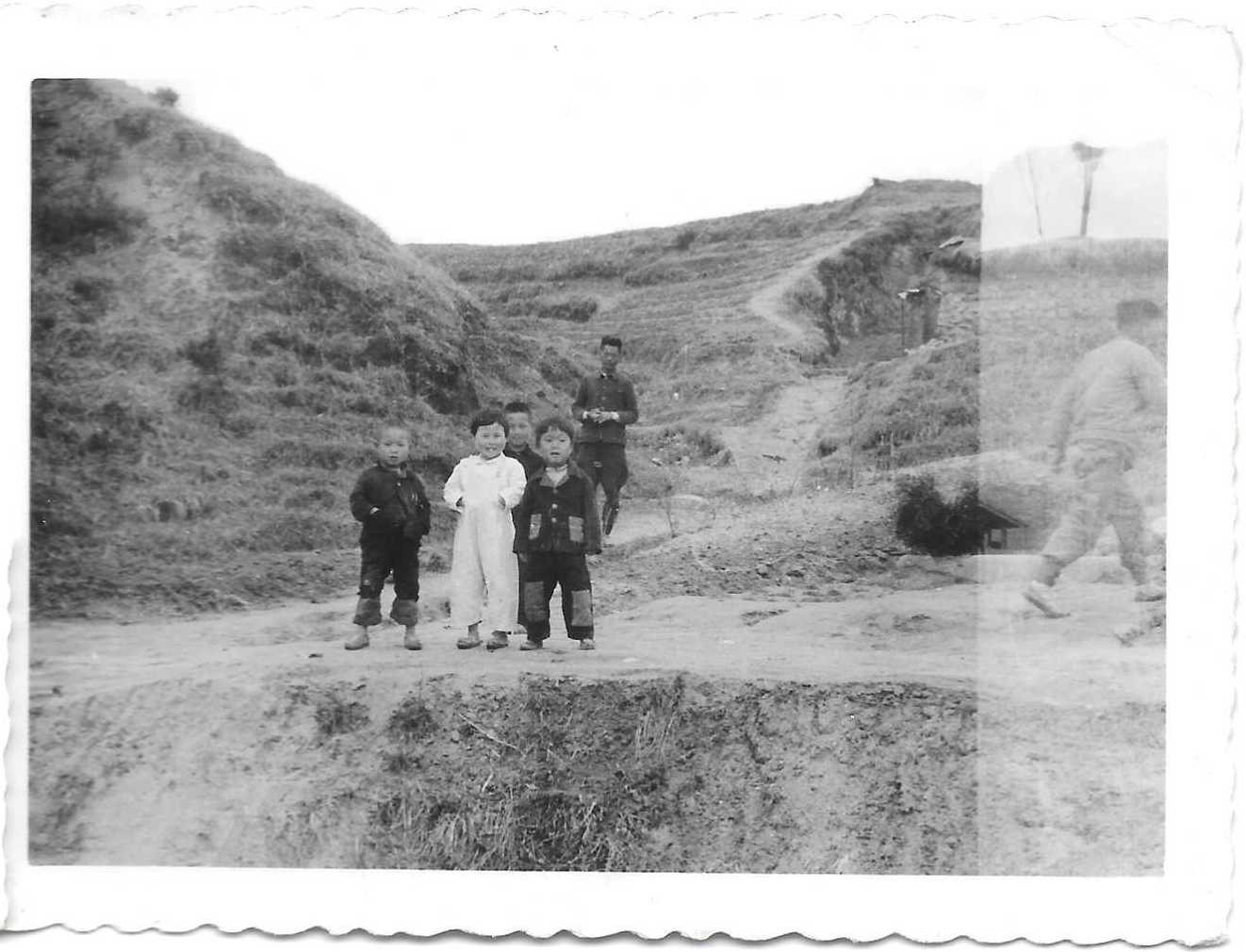
Taejon (Daejeon)
A small hut
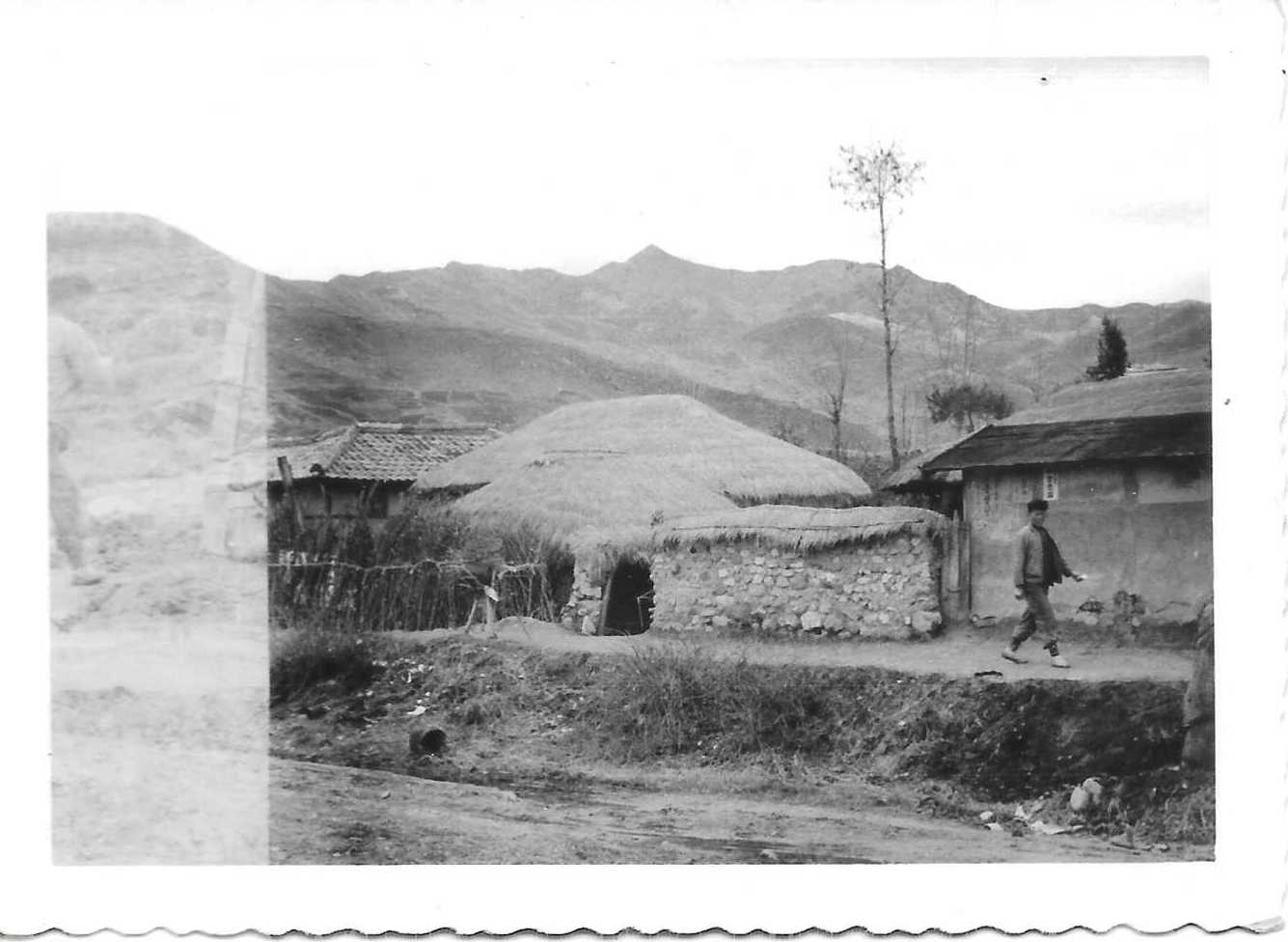
Taejon (Daejeon)
A small mud hut
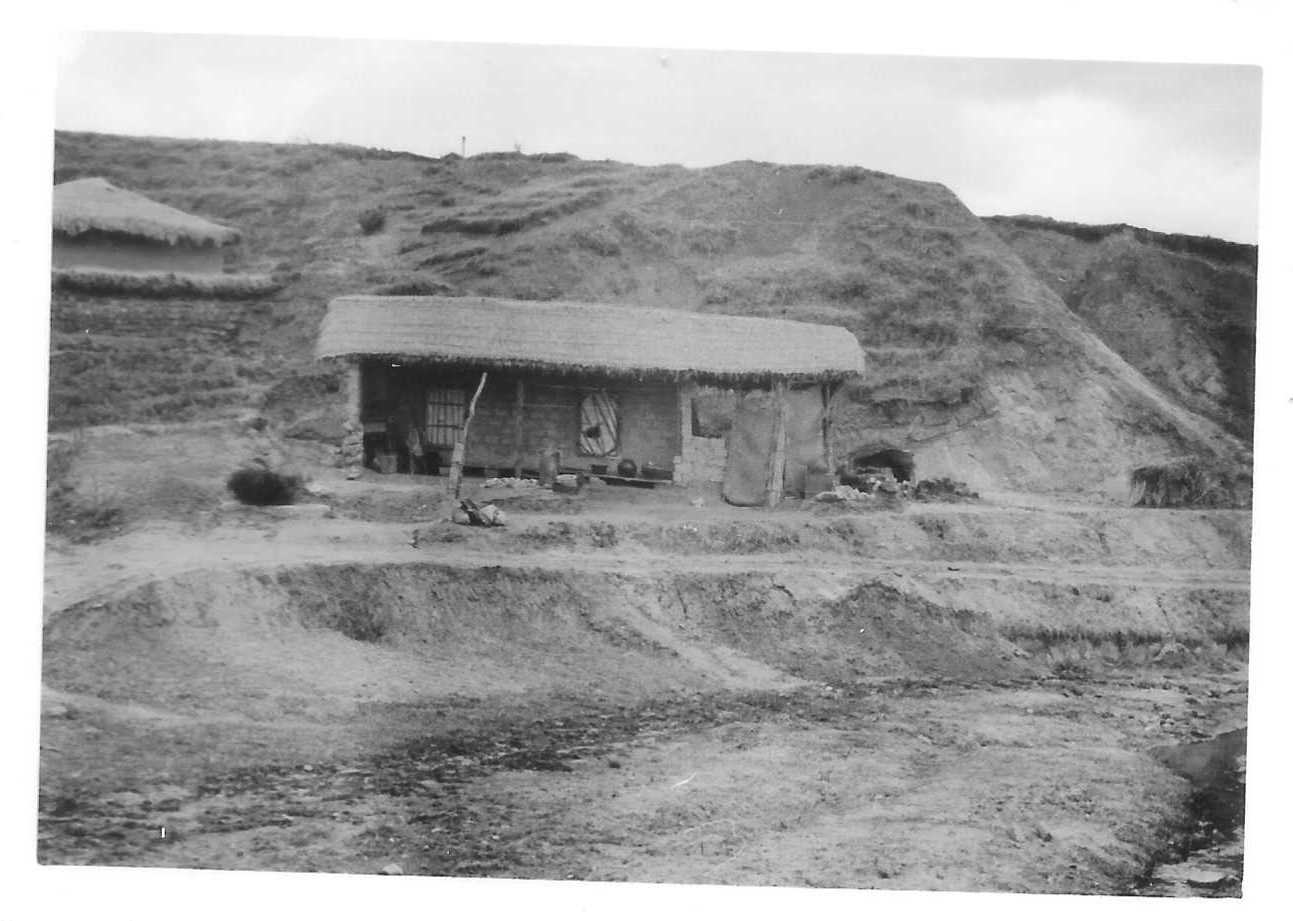
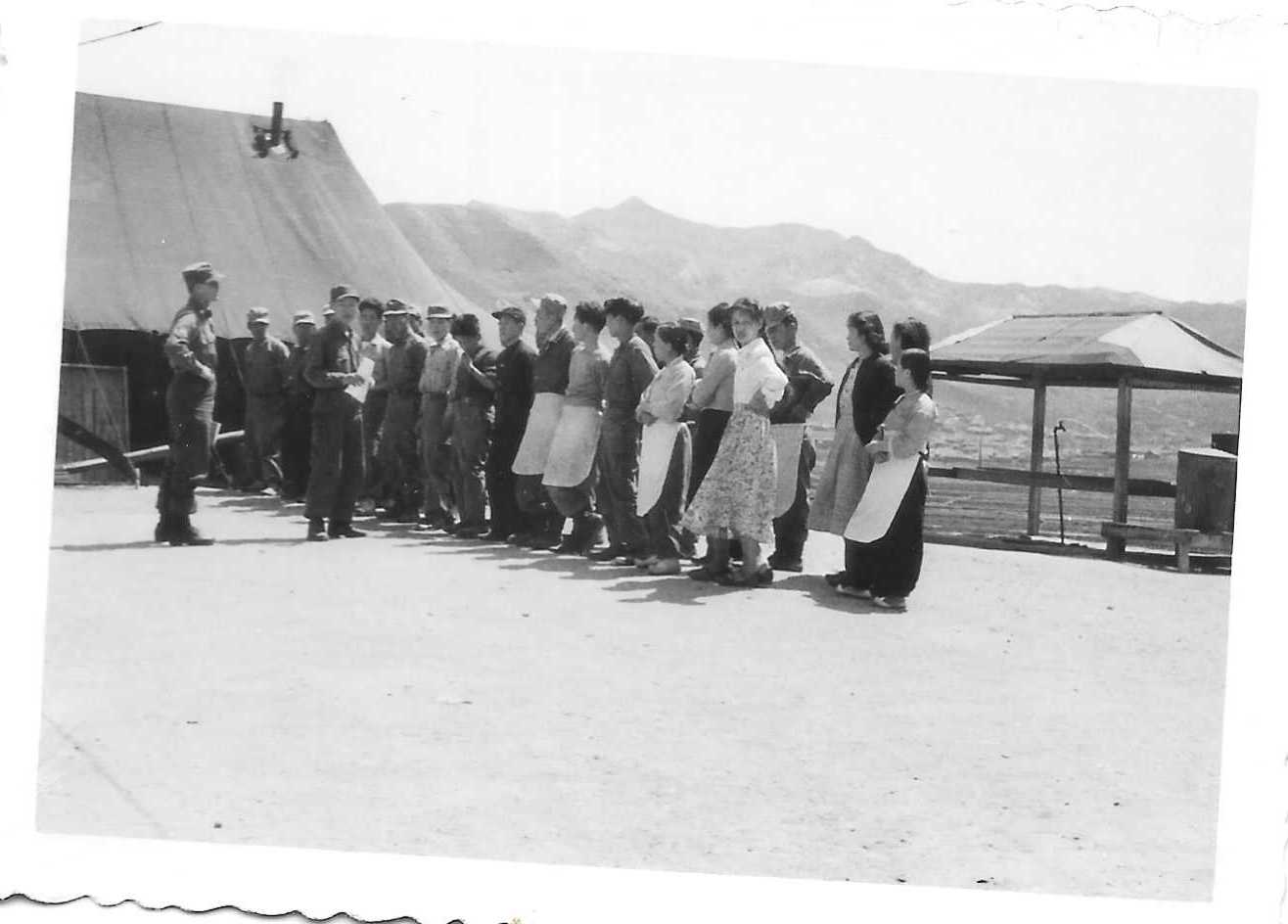
Taejon (Daejeon)
The Falugo Store sign
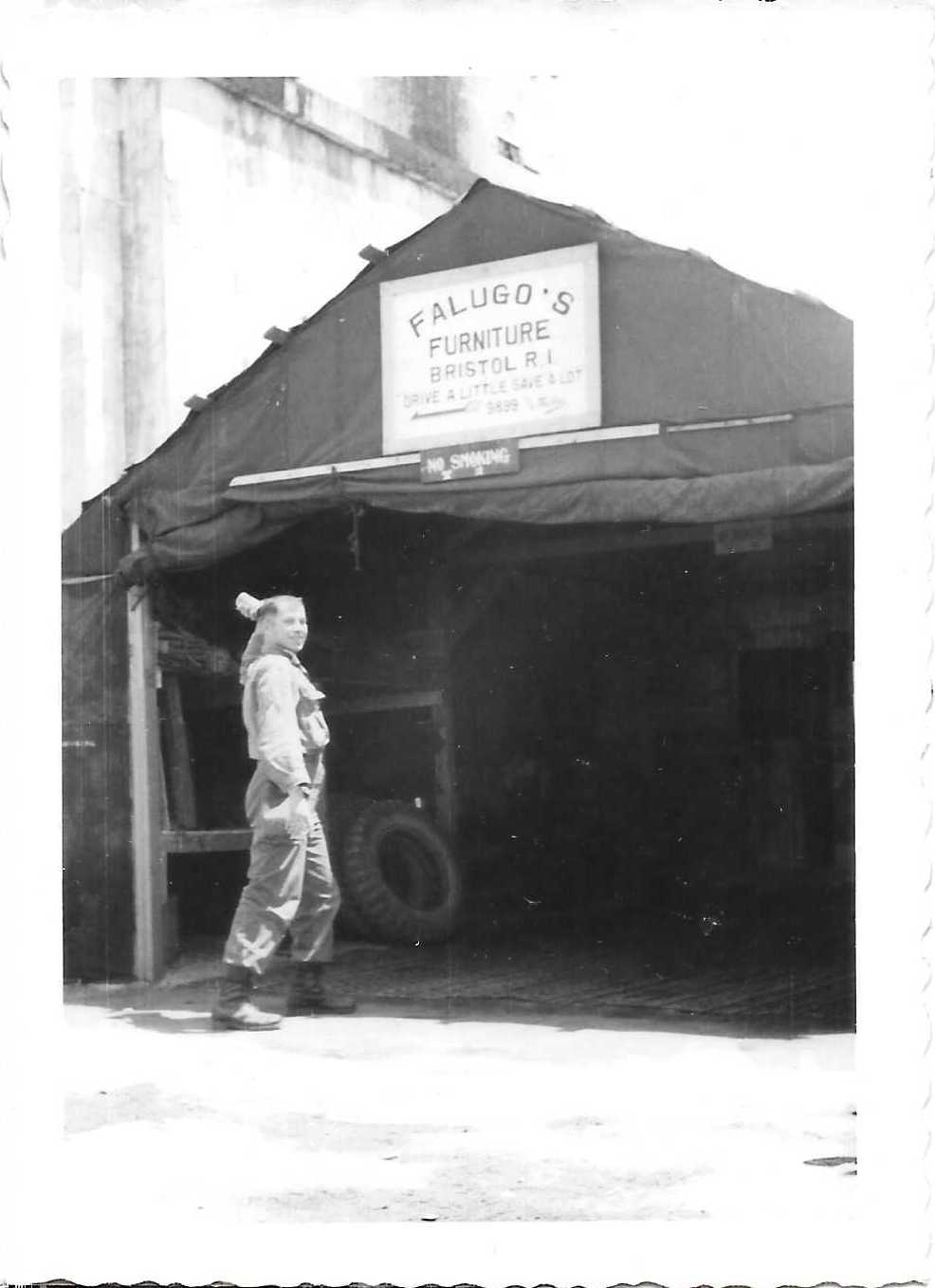
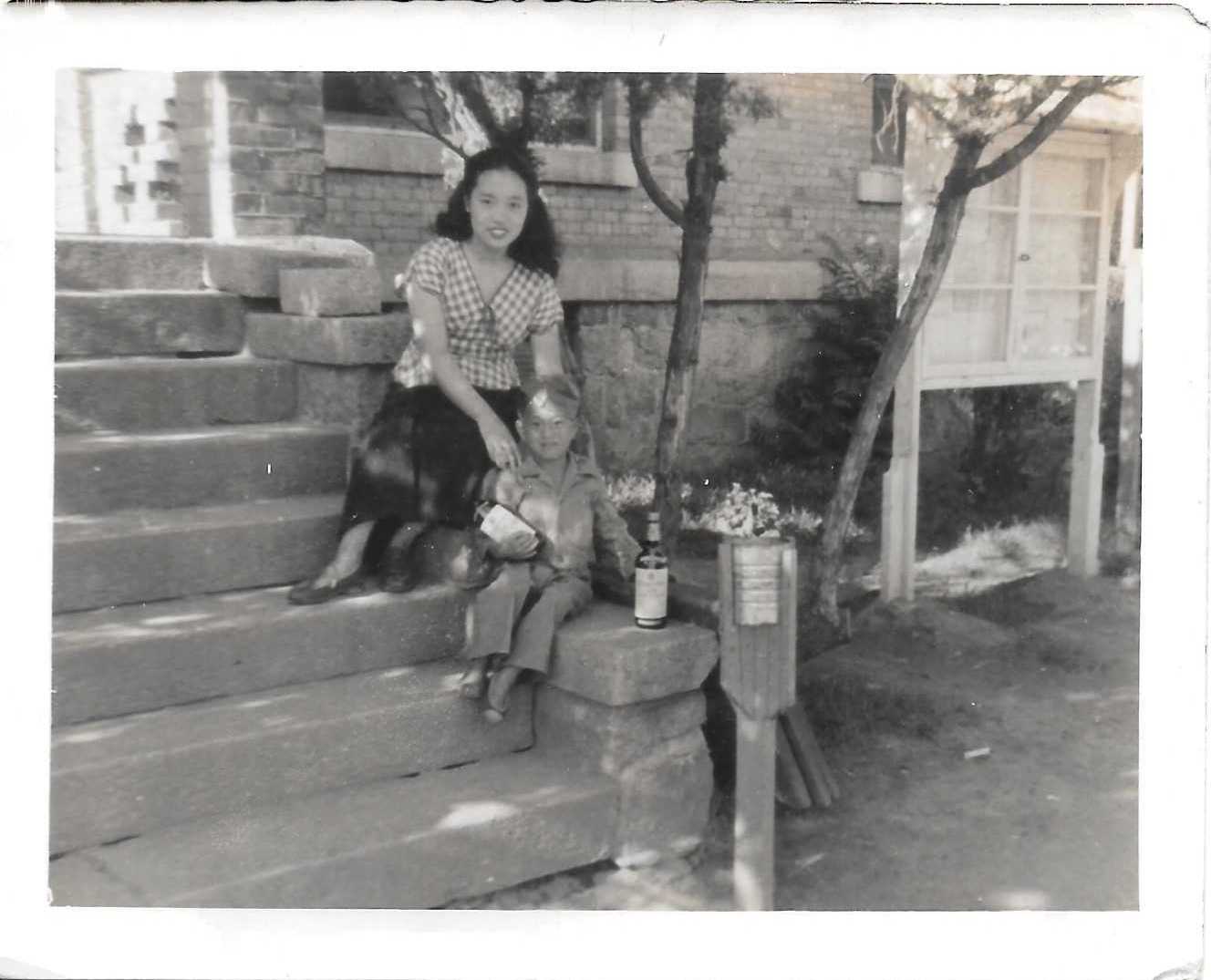
Taejon (Daejeon)
Traveling around with a Korean frame trying to carry a big box like they do
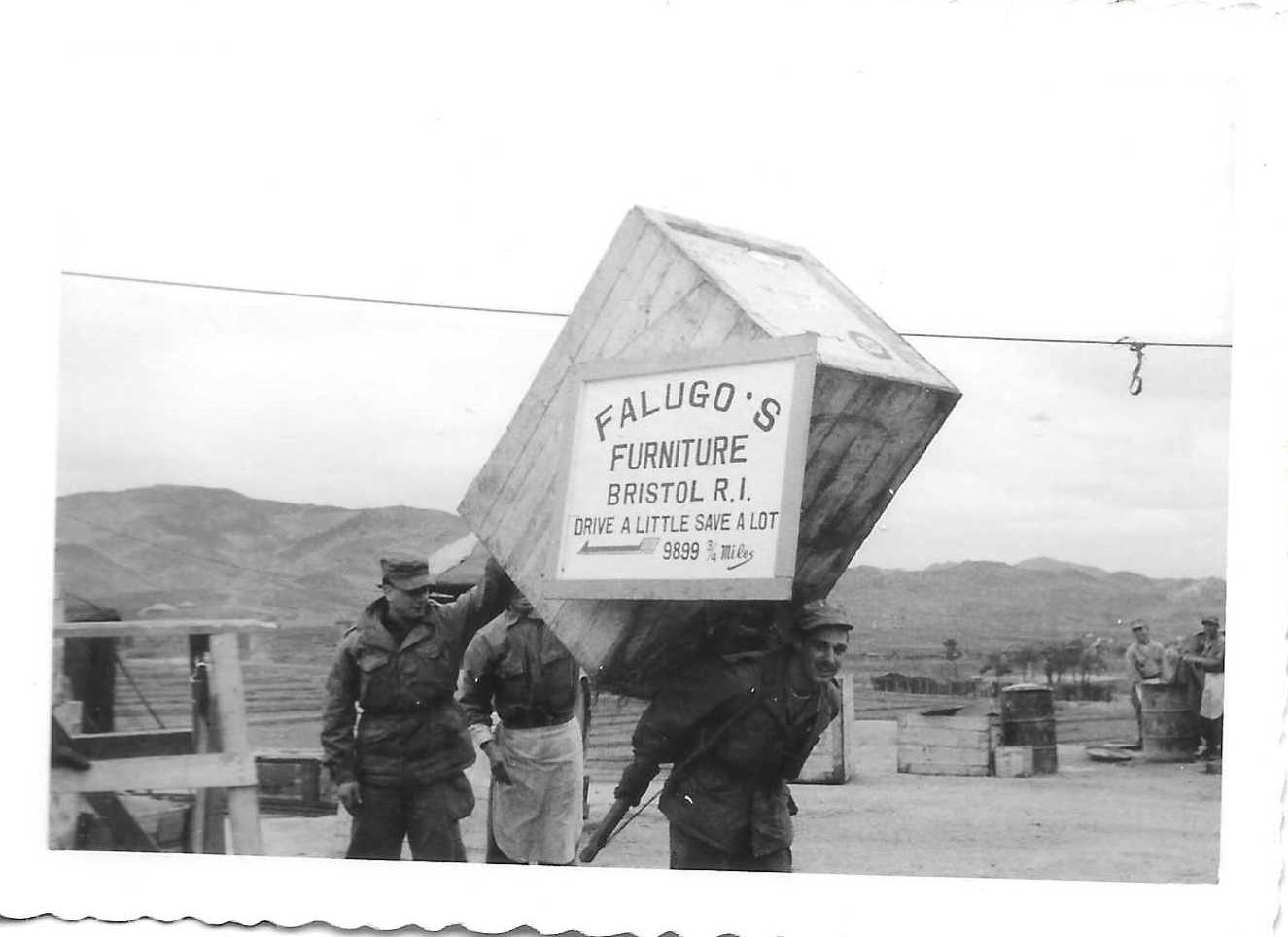
Charles Falugo, Jr., and the Little Boy
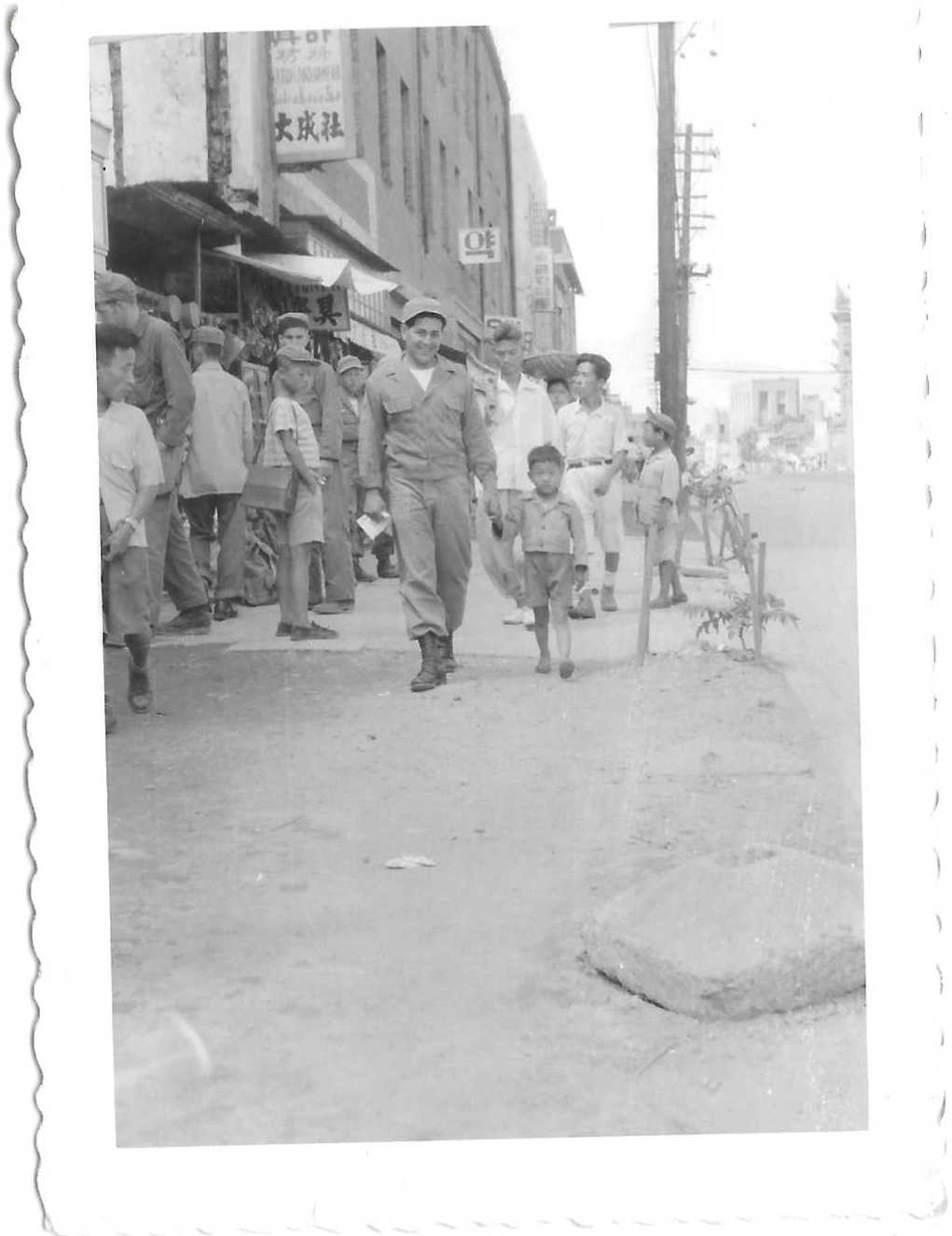
Taejon (Daejeon)
At the Taejon (Daejeon) marker
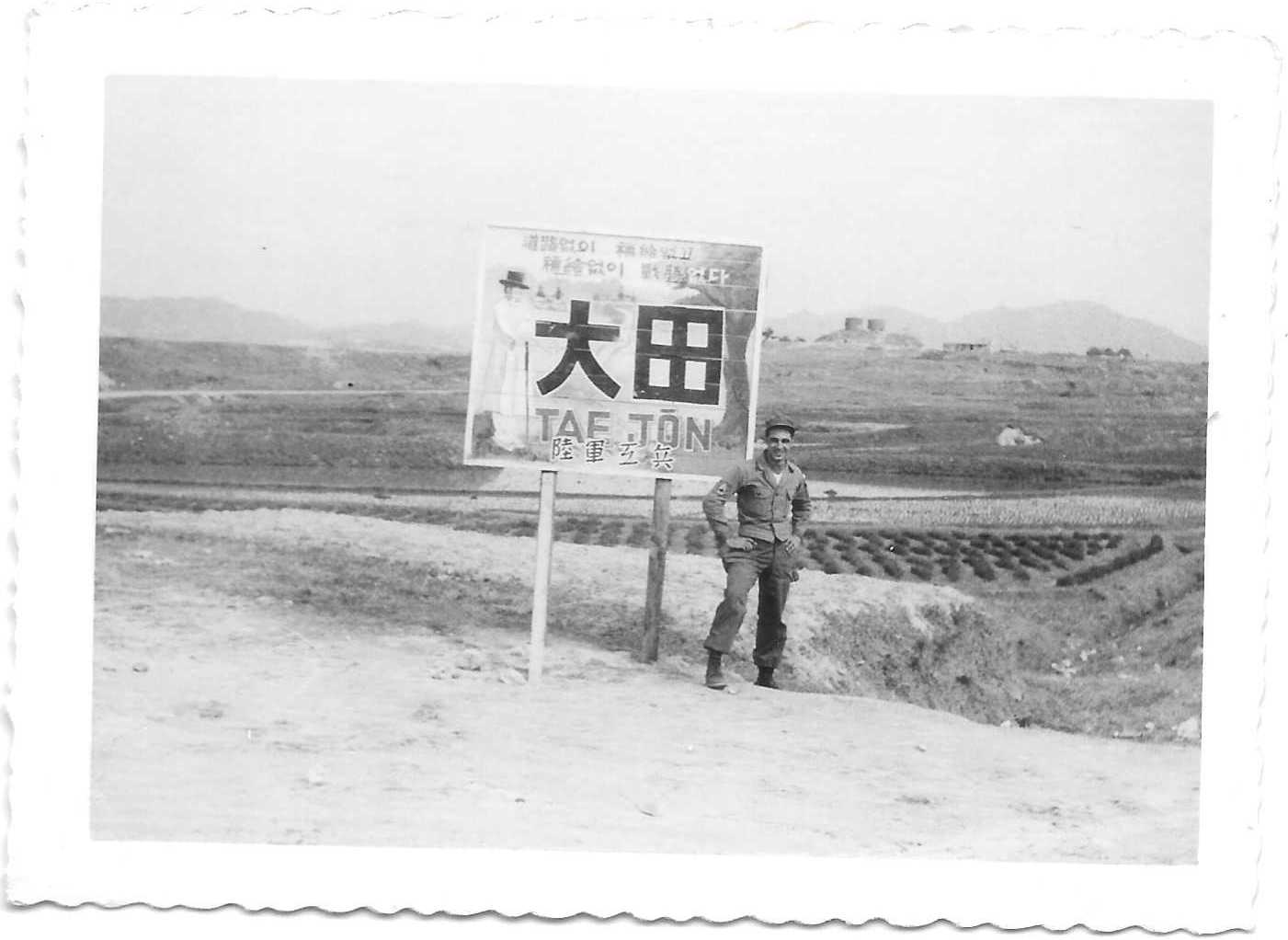
Taejon (Daejeon)
A small kid plowing with an oxen and an old wooden plow
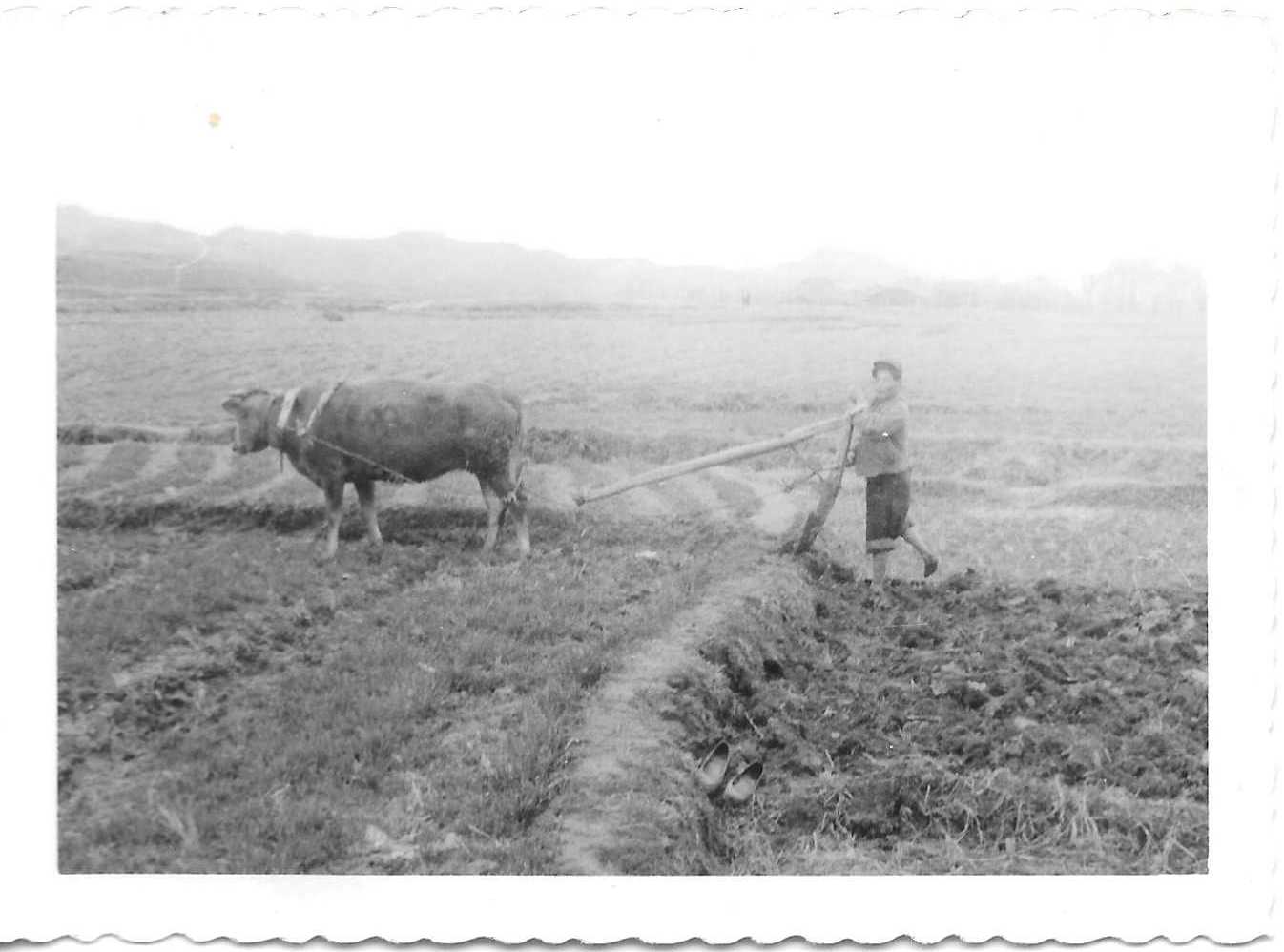
Charles and the Little Boy
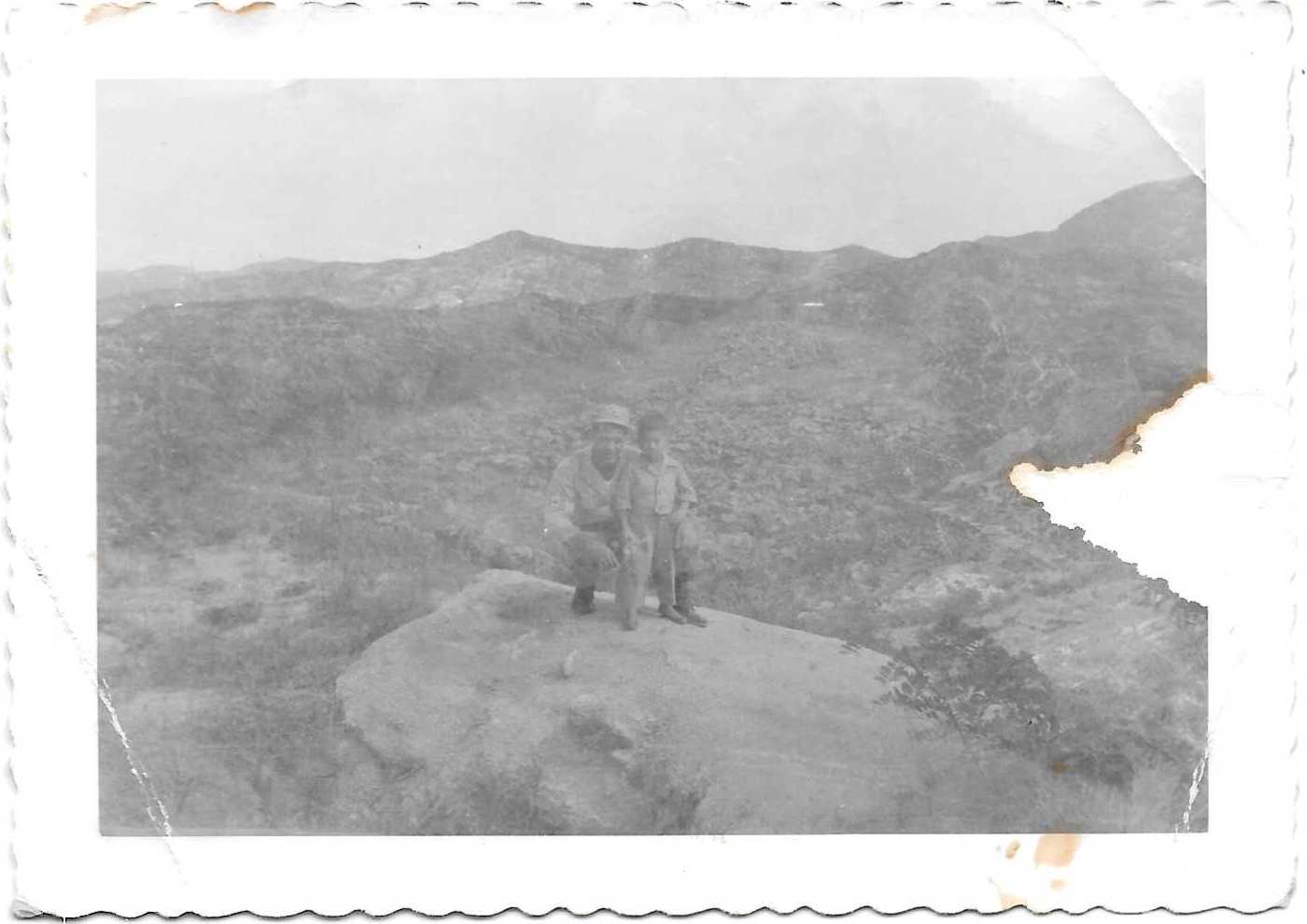
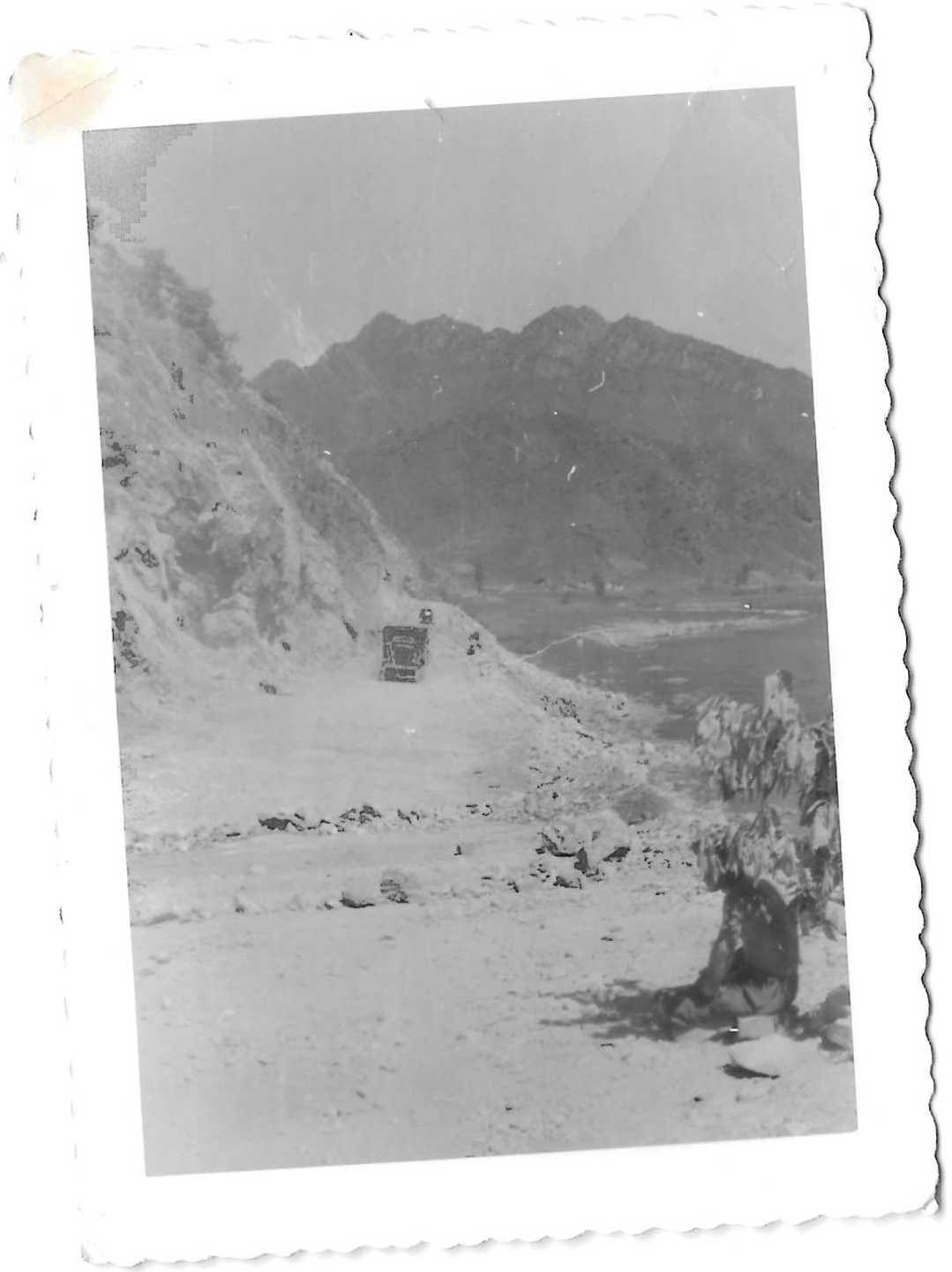
Little Boy in His "Uniform"
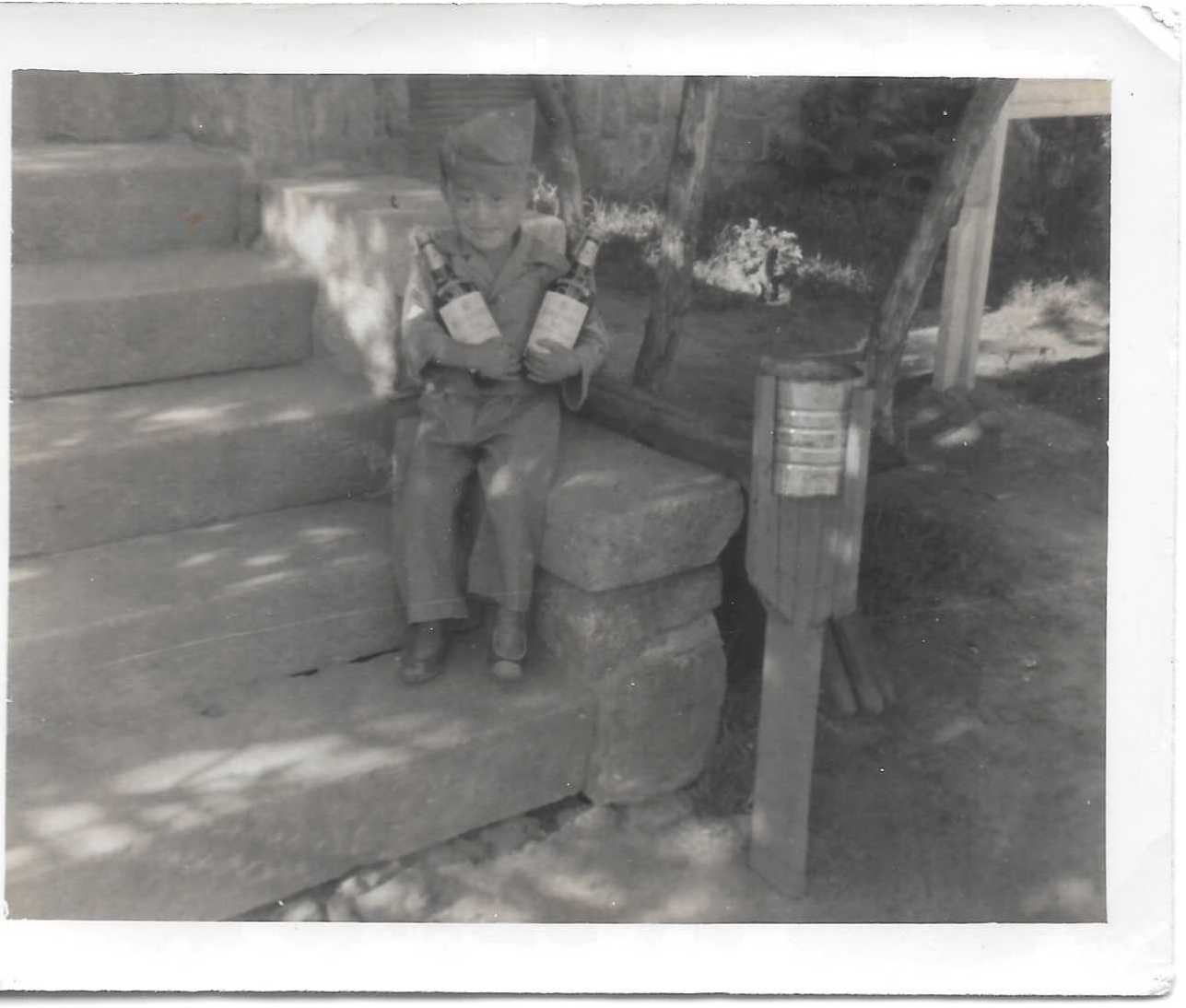
Another soldier with the little boy
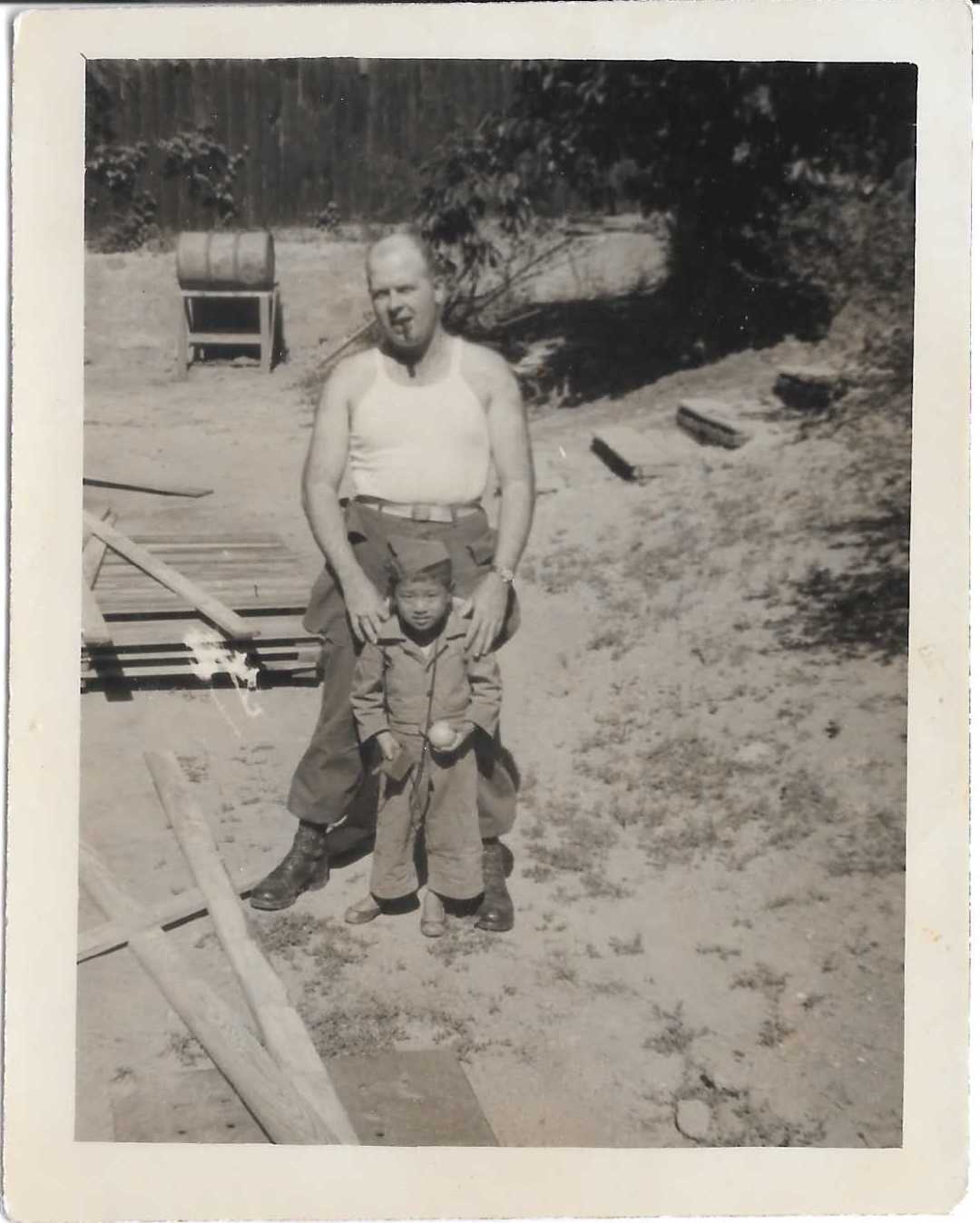
The little boy with that smile.
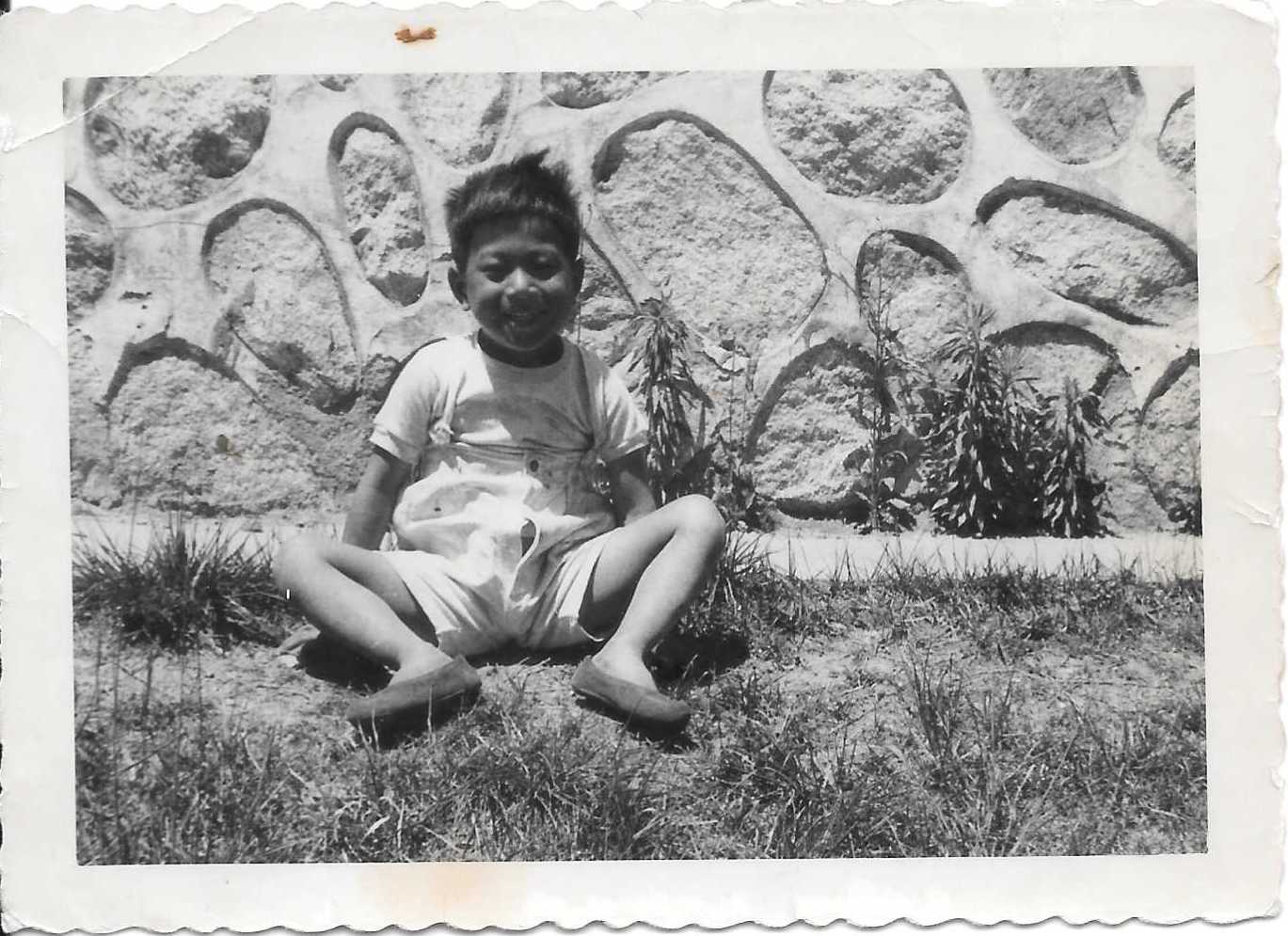
Pusan (Busan)
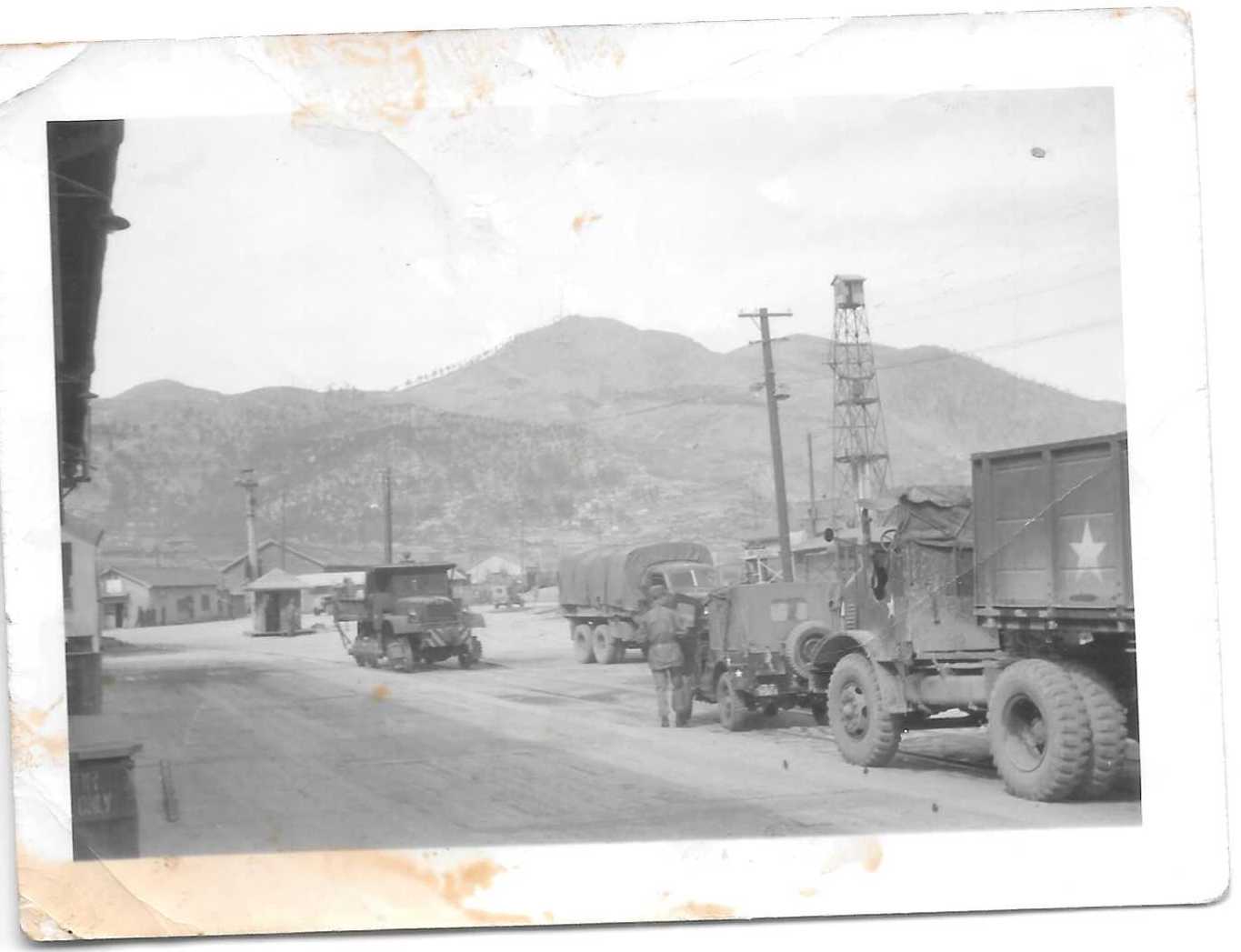
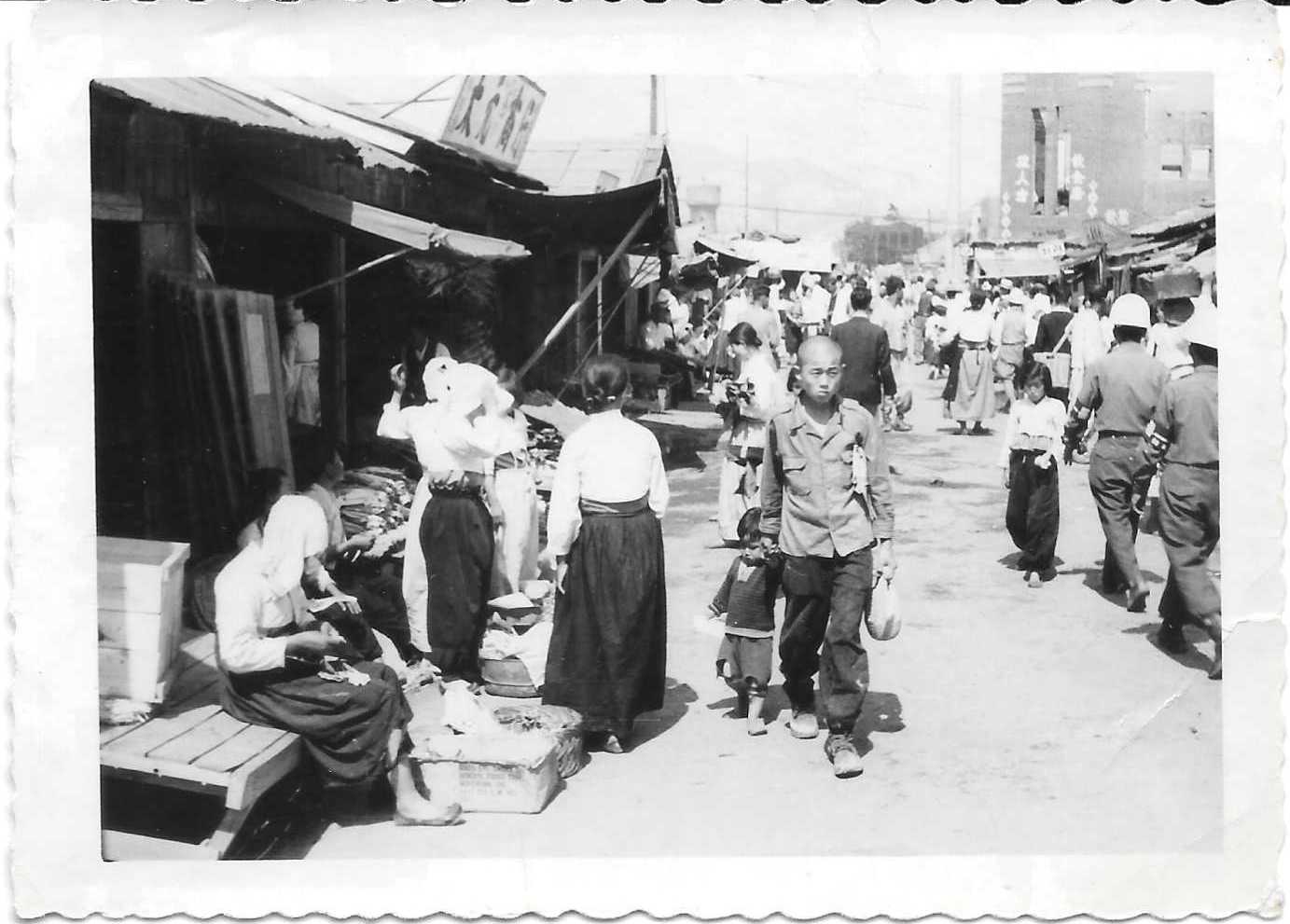
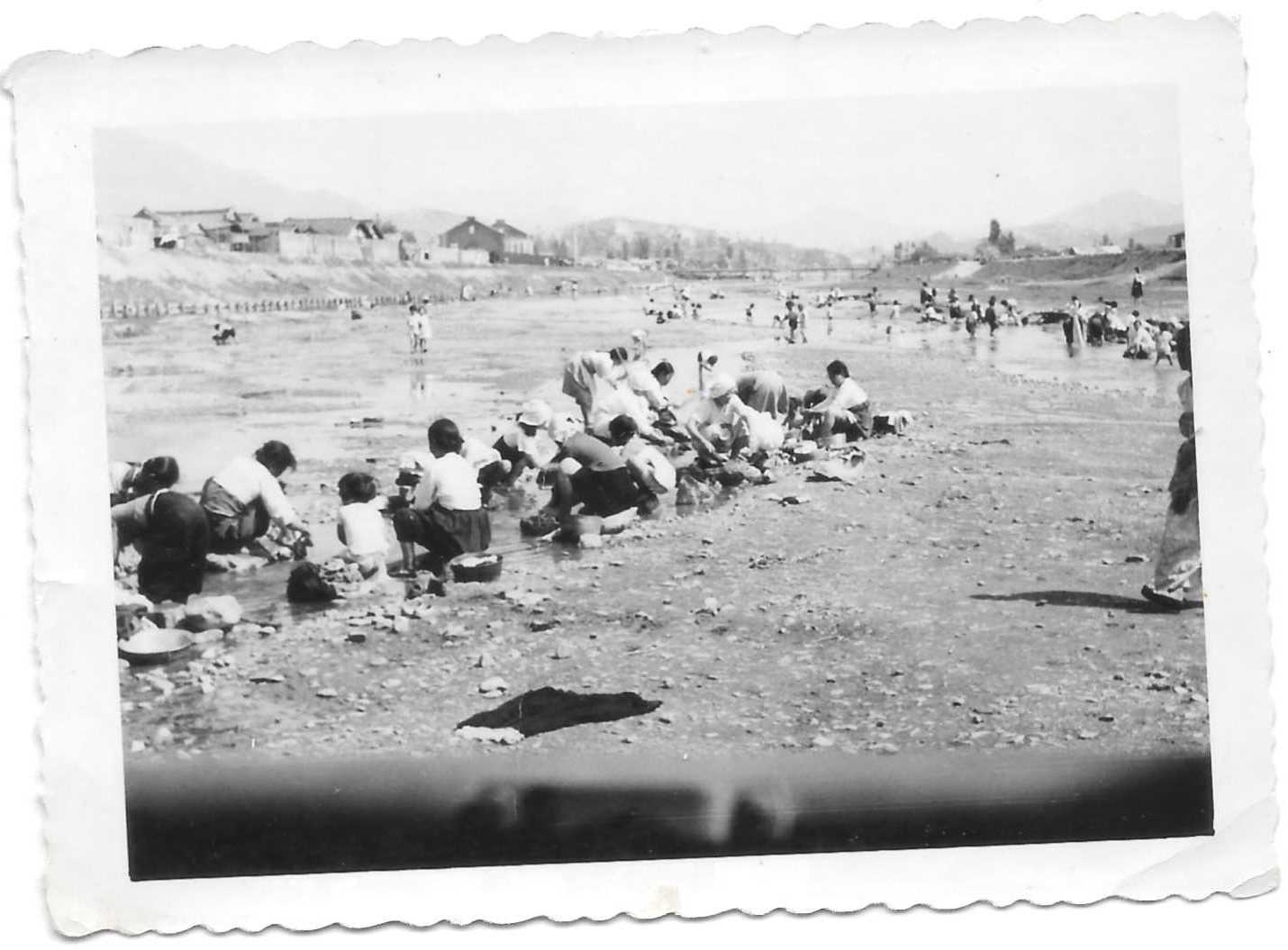
Taejon (Daejeon)
Two of my help and the motor pool
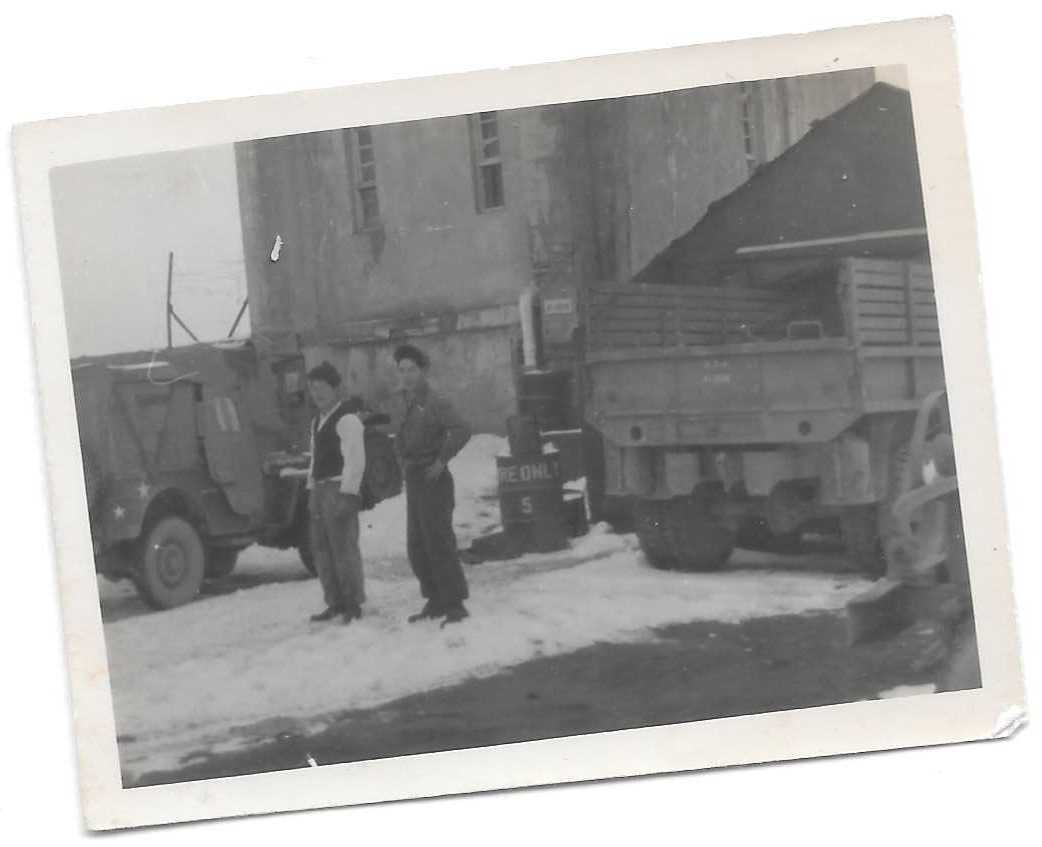
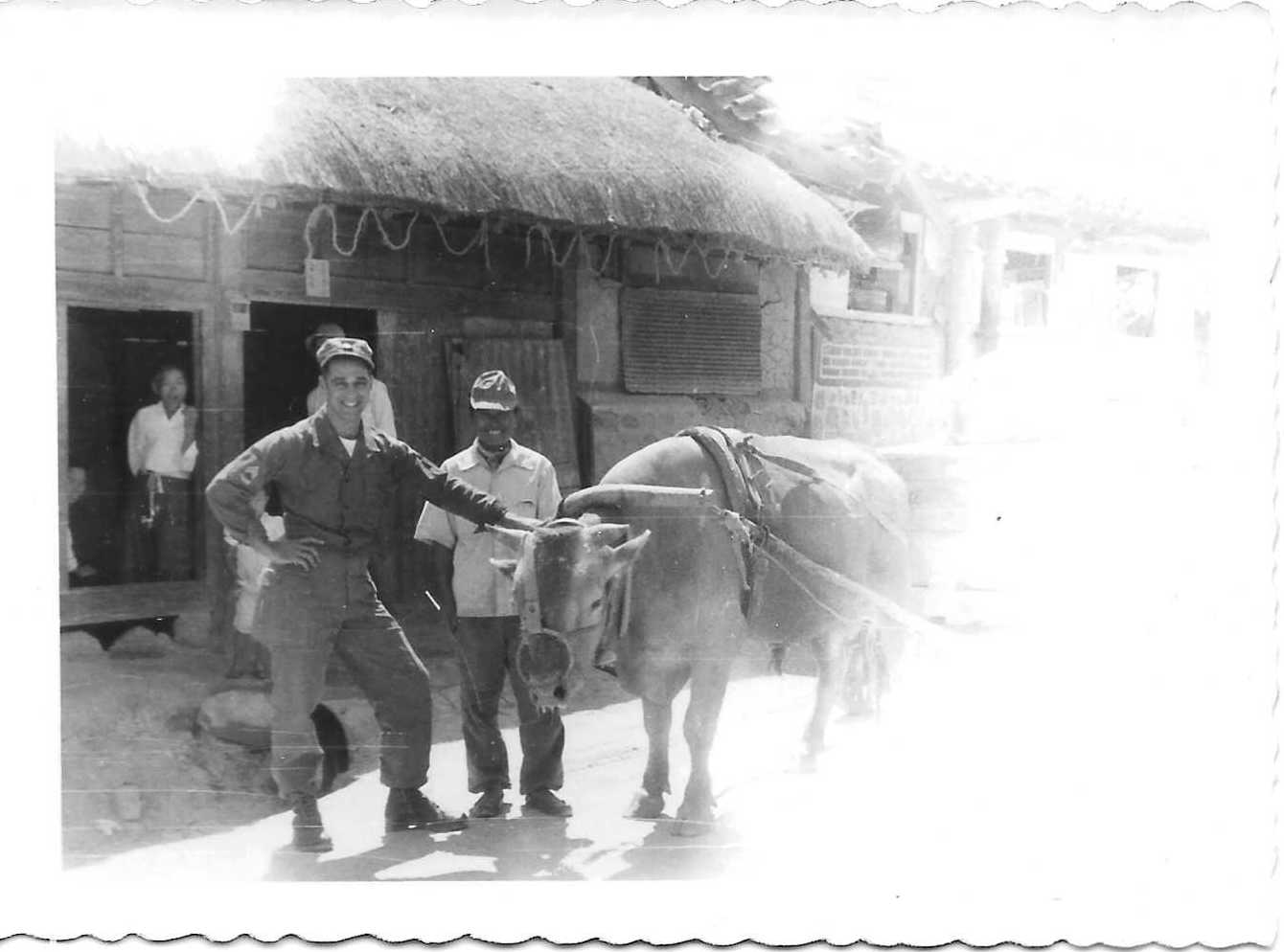
Charles
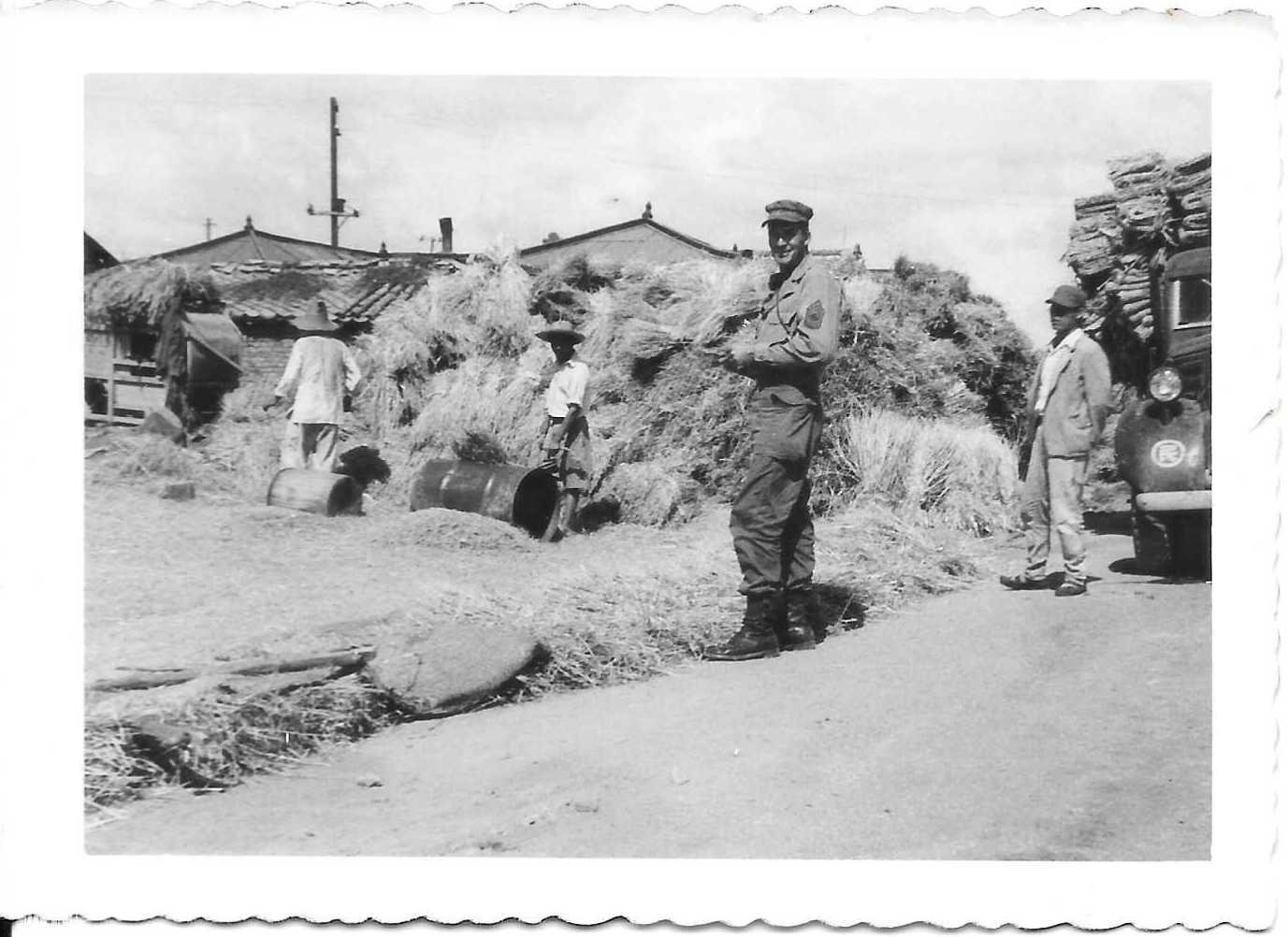
Taejon (Daejeon)
One cold day. I know they were taking this picture.
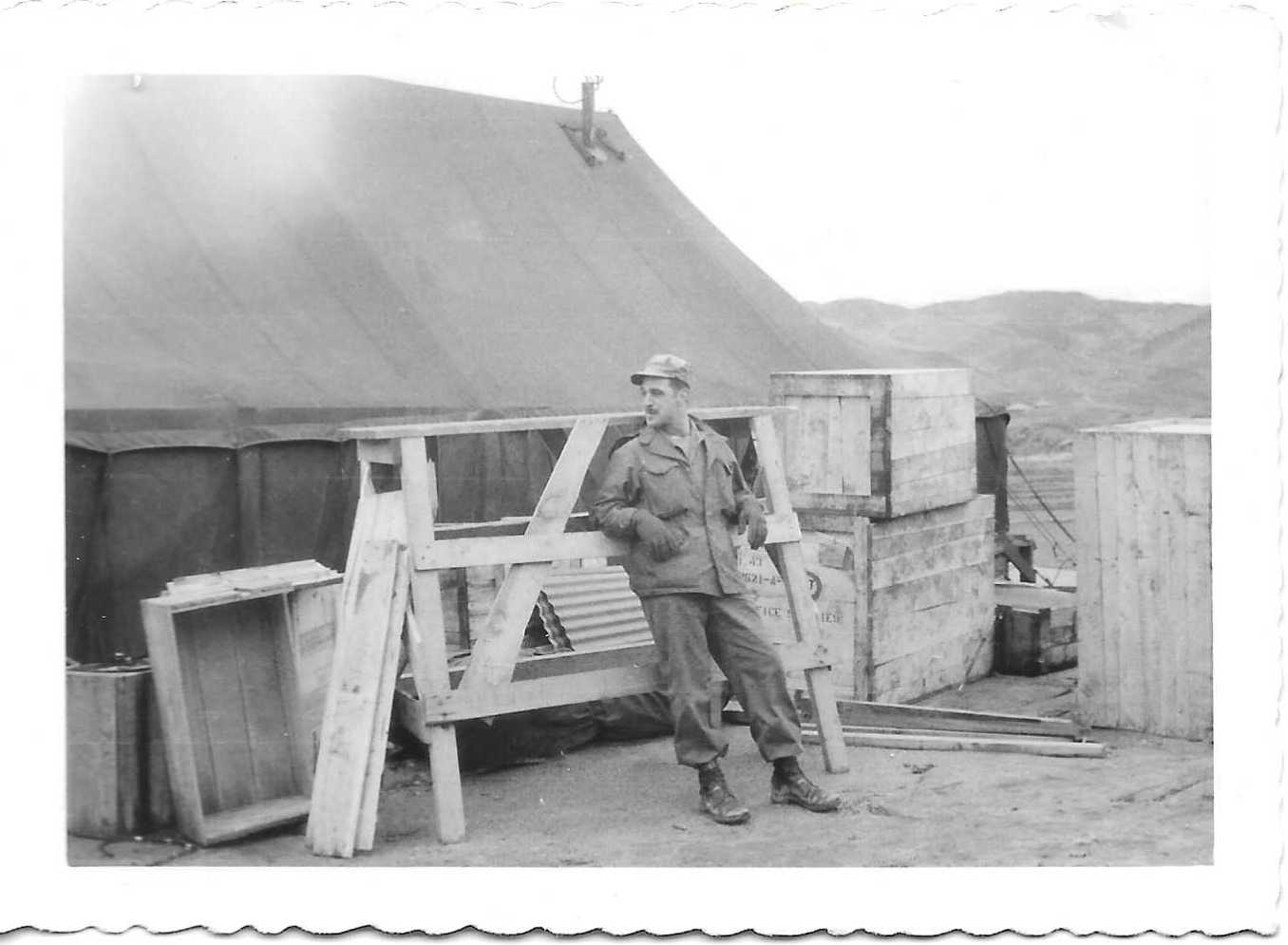
Taejon (Daejeon)
Me and the boys fooling around. Notice my mustache.
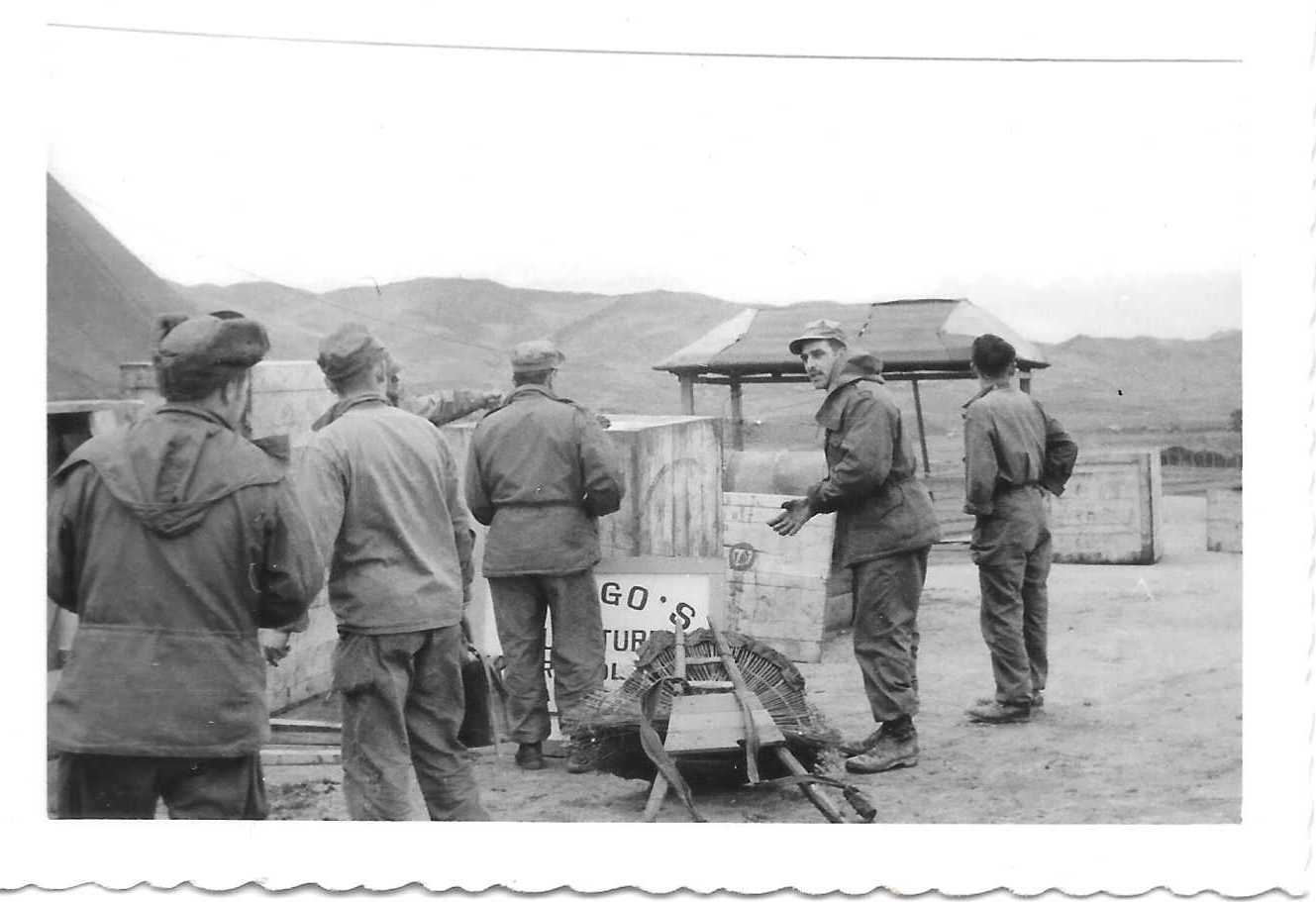
Taejon (Daejeon)
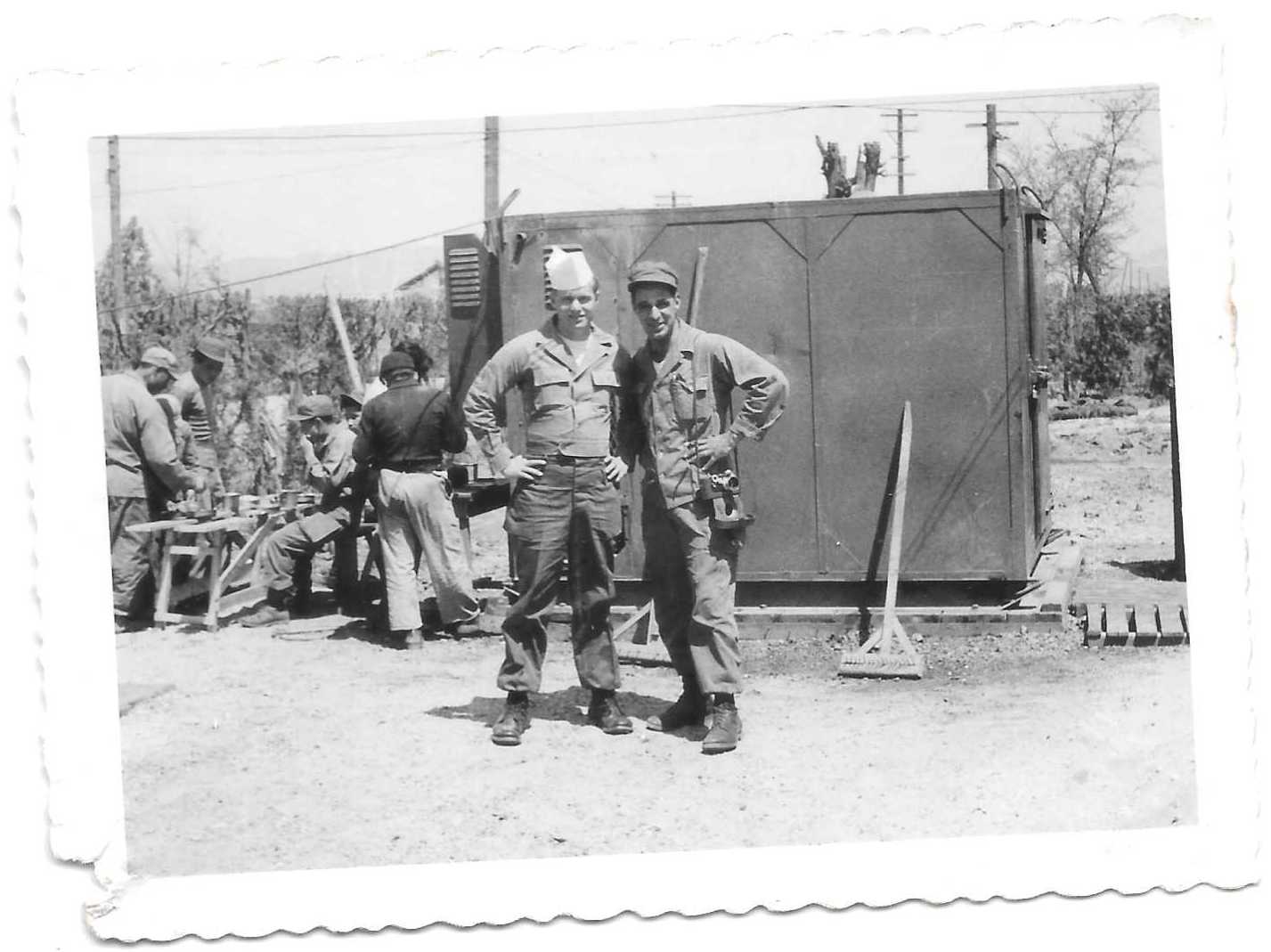
Charles
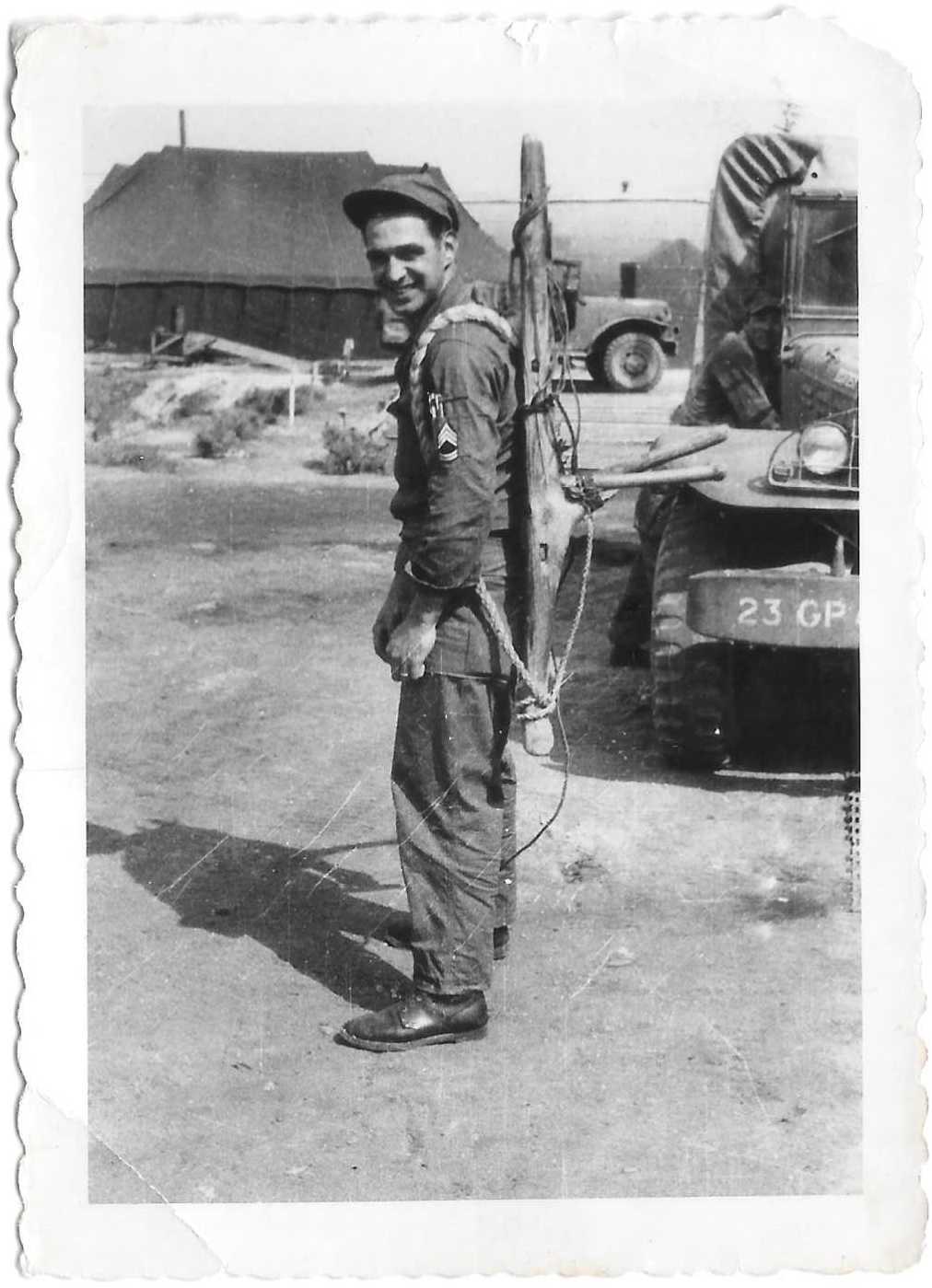
Taejon (Daejeon)
Take from bridge. People washing clothes in dirty river.
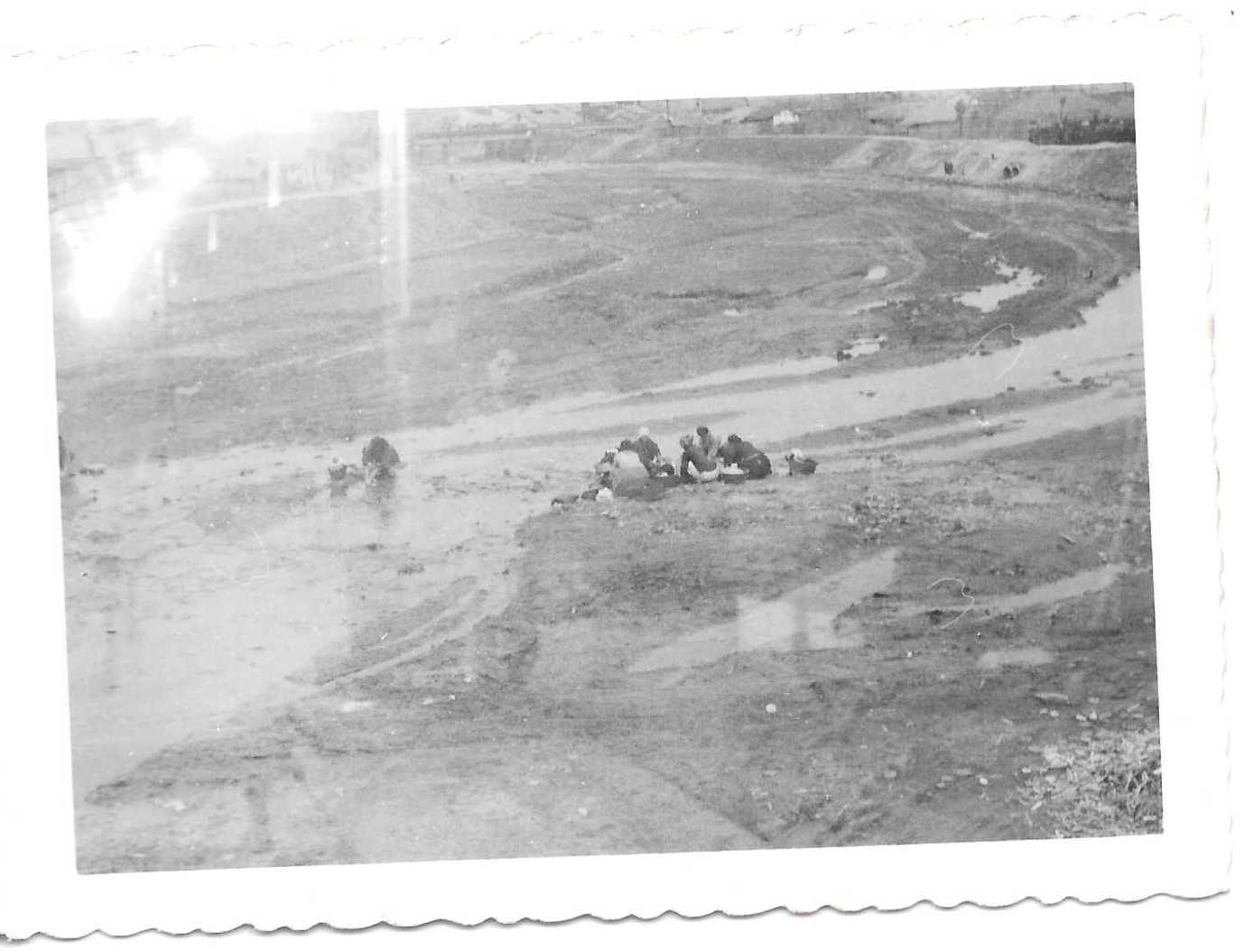
Taejon (Daejeon)
